
DAEDALUS 2024
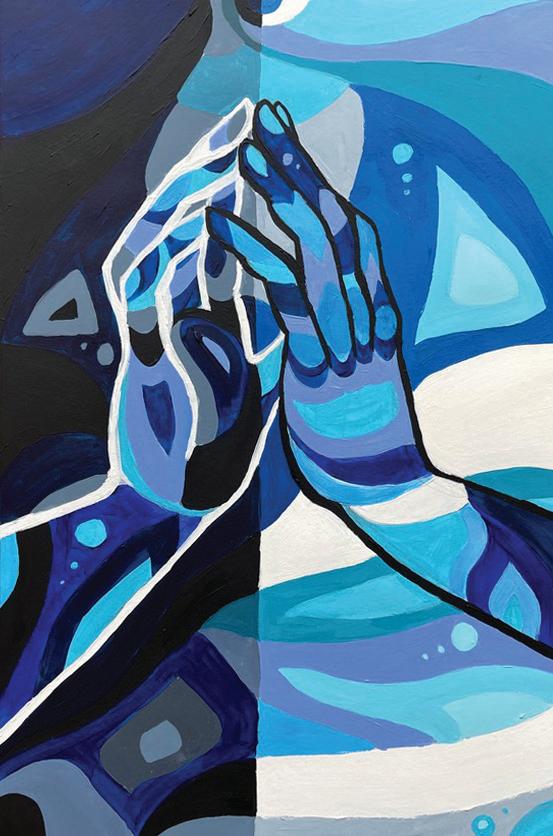
DAEDALUS 2024 Greenwich Academy Volume XXXVI daedalus@greenwichacademy.org 200 North Maple Avenue Greenwich, CT 06830
Daedalus, the ancient Athenian, created the Minotaur's famed labyrinth and invented wings so that he and his son could escape from King Minos. Daedalus reminds us that we are all creators and all inventors.
Chief Writing Editors
Gracie Genereux, Joyce Huang, Libby Nook
Chief Art Editors
Arielle Burrows, Ainsley McKee
Associate Writing Editors
Alessia Cutaia, Maggie Nichols
Associate Art Editors
Haley Johnson, Zara Kurbanov, Summit Mock
Members
Charlotte Armstrong
Gigi Caldero
Sophie Calise
Natalie Cook
Gianna DeBono
Grace Galvin
Madison Grace-Harris
Rena Georgakopoulos-Ueta
Shriya Gupta
Ellie Holden
Emma Jones
Abby Kesmodel
Nadia Kowalski
Emma Mao
Lauren Sun
Anna Zhuperina
Alexandra Zummo
Over the last 36 years, Daedalus has earned 65 national awards from the Columbia Scholastic Press Association (CSPA) and the National Council for Teachers of English (NCTE). We continue to be inspired by the community of writers and artists at Greenwich Academy. To gather the writing contained within the pages of this magazine, students of Greenwich Academy submitted writing to five monthly deadlines. Submissions are anonymous and read by the entire Daedalus writing staff. During subsequent manuscript meetings, the Daedalus staff discussed each piece, offering constructive feedback to each work so as to improve the general quality of our community’s writing. Club members then anonymously vote yes/no (whether or not we think it should go in the magazine) on the submissions. The writers of the top two pieces from each manuscript meeting as dictated by these ballots earn the coveted title of “Writer of the Month,” which comes with a gift certificate to Diane’s Books, a favorite local bookstore. Meanwhile, the art editors also select from hundreds of original pieces over the course of the year. In March, all editors narrow their selections and begin production, which continues through April. We use the publishing software InDesign to format our layout and construct graphics. In May, chief editors collaborate with our printer until Greenwich Academy’s end-of-year Publications Assembly, where we read from the issue, exhibit slides of all art, and celebrate!
Faculty Writing Advisor
Lauren Delapenha
Faculty Production Advisor
Rob Pursell
Faculty Art Advisor
Sherry Tamalonis
Printer
Graphic Management Partners, Port Chester, NY
Colophon
800 copies of Daedalus have been printed on 80 pound Euro Gloss text stock with 120 pound Euro Gloss for the cover. The text is set in Avenir Next, designed by Adrian Frutiger in 1988.
CONTENTS Covers: The Art Of Conversation || Acrylic Isabel Hartman Inside Front Cover: Reflection || Acrylic Isabel Hartman Title Page: Holding On || Acrylic Isabel Hartman Section Dividers: Grateful Hands || Pen and Ink Anna Leventon Inside Back Cover: Gratitude || Colored Pencil Zara Kurbanov Wings Seeing Glass || Colored Pencil Zara Kurbanov 8 Mirror of the Sky || Poetry Shriya Gupta 9 Princesses, Ponies, and Priests || Poetry Libby Nook 10 Sidewalk Games; The Ride || Mixed Media Summit Mock 11 Escaping High School || Fiction Maddie van der Weijden 12 Bedroom Perspective || Watercolor Estelle Santulin 13 Entwined || Mixed Media Anna Leventon 14 Airport Taxi || Nonfiction Natalie Cook 15 The Swimmer || Digital Bryce Gold 16 Pre-Race Anticipation; An Unexpected Turn || Pen and Ink Bryce Gold 17 Looking for East 57th Street || Fiction Sophie Calise 18 Inside Look || Mixed Media Denise Seol 19 Curiosity || Fiction Victoria Batres 20 Visions of Lee-Lee || Watercolor Georgia Schmitz 20 Michigan Mist || Acrylic, Mixed Media Zara Kurbanov 22 Superstitious || Fiction Libby Nook 24 Family Stroll || Lino Block Anniston Mahaffy 29 Grandma’s Treasure || Colored Pencil Zara Kurbanov 30 Embrace; In His Arms || Colored Pencil Zara Kurbanov 31 All-American Boy || Mixed Media Maya Tillman 32 Incoming Call || Fiction Abby Kesmodel 33 Conversation || Acrylic, Digital Persia Shipman 35 Starting Over || Mixed Media Denise Seol 36 The Same Sky || Poetry Vasilisa Banks 37 The Last Box of Annie’s Mac & Cheese || Poetry Nina Lux 38 Puppet Master || Colored Pencil Anna Leventon 39 Shadow || Graphite Anna Leventon 39 Labyrinth This Much || Stoneware Eleanor Kim 42 The Liar Paradox || Poetry Emma Jones 43 Panes || Poetry Joyce Huang 44 Through the Looking Glass || Pen and Ink Ainsley McKee 45 Botanical Study, 1, 2 || Pencil, Pen Elena Schmedlen 46 The Death of the Beetle || Fiction Alessia Cutaia 47 My All-American Boy || Song Lyrics Lauren Sun 48 Secrets || Digital Maya Tillman 49 Soup || Poetry Joyce Huang 50 In Focus; At Play || Oil Crayon Summit Mock 51 The Decision || Fiction Grace Galvin 52 Self-Portrait at Work || Pen and Ink Morgan Clarke 53 Happy Kin || Poetry Libby Nook 54 Game Night || Mixed Media Summit Mock 55 Self-Portrait || Pencil Arielle Burrows 56 Epilogue || Fiction Grace Galvin 57 Anxiety || Pencil Arielle Burrows 59 Shall I Compare you to a Banana? || Poetry Gigi Caldero 60 Bouquet || Mixed Media Callie Hammond 61 Fractured || Colored Pencil Zara Kurbanov 62 Labyrinth of the Mind || Poetry Alexandra Zummo 63
Mortals and Immortals
But the Air and the Sky are Free
The Dancer || Acrylic Ainsley McKee 66 The Keepers of Men || Fiction Gianna BeBono 67 Cancer || Mixed Media Anna Leventon 70 Mark || Graphite Elena Schmedlen 71 “Peace” || Acrylic Aya Rabin 72 Beach || Poetry Nina Sennon 73 Underbelly || Fiction Grace Sullivan 74 Mother and Child || Acrylic Anniston Mahaffy 75 Cousins || Colored Pencil Anniston Mahaffy 79 First Light || Graphic Novel Anna Leventon 80 How to Write a Story || Fiction Emma Jones 82 Self-Portrait with Rembrandt || Pen and Ink Denise Seol 83 Self-Portrait as a Young Child || Graphite Ava VanMoorsel 84 Twisted Reflection || Acrylic Lily Novitsky 87 Lights Out || Poetry Maggie Nichols 88 Wonder || Graphite Ava VanMoorsel 89 Desire || Acrylic Aya Rabin 90 Lamentation || Fiction Gianna DeBono 91 The Tragedy of an Oak Leaf || Poetry Alexandra Zummo 92 Shell Interlain || Colored Pencil, Charcoal Grace Sullivan 92 Natural Images; Nature Reflected || Charcoal Grace Sullivan 93 A Letter From the North Pole Team || Fiction Abby Kesmodel 94 Sparkles || Digital Maya Tillman 95 Truth, Tapestry, and Mythology || Fiction Alessia Cutaia 96 Tapestry || Lino Block Sloane Creech, Maddie Maliakal, Elisabeth Schmitz 97 The Culling || Fiction Alexandra Zummo 98 Cacophony || Pen and Ink Arielle Burrows 100 What is Done || Acrylic Anna Leventon 105 Beth; Martha || Stoneware Ainsley McKee 106
Rock Garden || Acrylic Zara Kurbanov 110 A Great Lake || Poetry Grace Genereux 111 Icarus Inverse || Poetry Grace Sullivan 112 Fluffy || Pastel Pencil, Ink Elena Schmedlen 113 Butterflies
|| Pen and
Isabel Hartman 117 Spirit ||
Zara Kurbanov 118 Graduation ||
Gigi Caldero 119 Sleeping
Crayon Delilah Benn 120
Poetry Rena Georgakopoulos-Ueta 122 Impressions
Pen and
Anna Leventon 125 The Sun || Fiction Zara Kurbanov 126
Mixed Media Estelle Santulin 127
Courts
Poetry Nina Sennon 128 Lemon Tree || Acrylic Vasilisa Banks 129
Point || Acrylic Zara Kurbanov 130 A Charlevoix Summer || Poetry Grace Genereux 131
Nostalgia
Rena Georgakopoulos-Ueta 132
Morgan Clarke 134 Colors
Morgan Clarke 135 Summer Fruit
Vasilisa Banks 136
Song Lyrics Lauren Sun 137
Corridor ||
Block Sam Packer 138
Block Bryce Gold 139
|| Poetry Joyce Huang 140
Zara Kurbanov 141
in the Stomach
Ink
Colored Pencil
Poetry
Series, I-IV || Acrylic; Oil
Thirteen Ways of Looking at the Stars ||
||
Ink
Self-Portrait in Repose ||
Abiding
||
Tod’s
Temporary
|| Nonfiction
Flowing Dialog || Acrylic
of My Youth || Oil Crayon
|| Acrylic
Thank You, Thursday ||
Hospital
Lino
The Meet || Lino
Ephemera
Leap of Faith || Colored Pencil
Letter from the Chief Writing Editors
This year, Daedalus published its 36th edition! As the largest and oldest student-led organization at Greenwich Academy, Daedalus has continued to foster a strong community of writers and artists who are passionate about nurturing the legacy of the magazine in 2024.
Our faculty writing advisor Ms. Delapenha, production advisor Mr. Pursell, and art advisor Ms. Tamalonis were invaluable in designing and publishing this year’s magazine. We thank them for their hard work and devotion to Daedalus
Although meetings take place on a weekly basis, the camaraderie, creativity, and care of the Daedalus community extend far beyond Friday afternoons. For example, before breaking for the holidays in December, we held the annual Daedalus Coffee House, when club members were invited to read their work and enjoy hot chocolate and donuts. Then, over Winter Break, we continued to send festive “12 Days of Prompts” emails to encourage our club members to write during their time off! In March, we were honored to learn from Joann Hill, Creative Director at Disney Publishing Worldwide, who led a workshop on book jacket design. Finally, we shared all Daedalus has accomplished by presenting our final edition with the rest of the Upper School at the annual Publications Assembly in May.
We are mindful of and grateful for the profound opportunities and impact Daedalus has offered us, and we sought to reciprocate this generosity to benefit our community. In the spring, at our 17th Annual Writers’ Festival in April, we hosted three authors: poet Emily Lee Luan, memoirist and ghostwriter Elizabeth Stein, and our very own novelist-in-residence and English teacher, Aisha Abdel Gawad. Organized in conjunction with The Brunswick School and Sacred Heart of Greenwich, this day-long event was a chance for students to attend readings by accomplished authors and develop their own writing skills in intensive workshops. Finally, the Art Editors collaborated once more with the Greenwich Academy Breast Cancer Awareness Club to knit pink hats, all of which went to cancer patients recovering or receiving treatment in hospitals in our area.
On Fridays when there was not a manuscript meeting, the Editorsin-Chief ran a variety of art and writing workshops. We explored creative nonfiction, flash fiction, unique forms of poetry such as pantoums and ghazals, and screenwriting—this year’s edition of Daedalus includes two screenplays for the first time in several years! In art workshops, we learned how to use pastels and draw inspiration from music to make art. The literary and artistic sides of the magazine merged as we practiced ekphrasis and created art based on writing submissions!
Throughout the year’s writing submissions, we noticed a prevailing theme emerging: nostalgia. These pieces served as reminders of the inevitability and beauty of change as we prepare to begin new chapters in our lives. Daedalus will remain in the bookshelves of our hearts even as we turn over new pages. To our dedicated and talented members: whether at manuscript meetings or workshops, the Coffee House or Writers Fest, you reminded us of the strength of Greenwich Academy’s community of writers, artists, and creatives. Thank you, and happy reading!
With love and appreciation, Gracie Genereux, Joyce Huang, and Libby Nook
WINGS

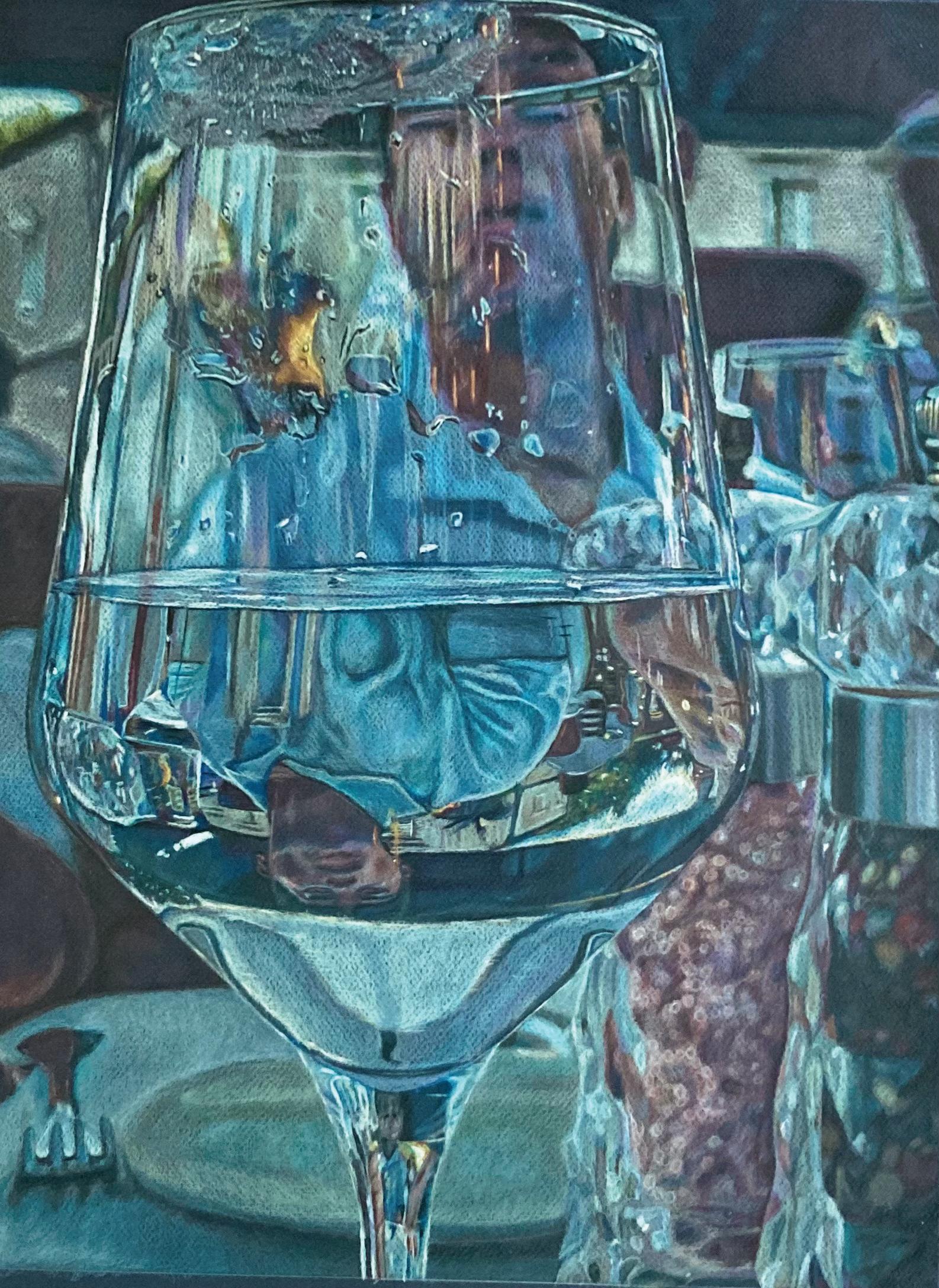
8
Zara Kurbanov Seeing Glass
Mirror of the Sky
O Icarus!
Shriya Gupta
If only you could’ve flown on wings of metal instead of wax! Way up, up in the sky where everything is so earth-shatteringly beautiful because you’re flying?
The earth and sea and cottony clouds are below and nothing is left above but the sun and moon and the blue, blue sky (it’s impossible to turn it gray up this high). And you’re blanketed by it on every side!
If only you could’ve smelled the warmth of the sun and watched her pale, pale yellow light cut through the air and make dust dance gold without fear of the salty spray in the air weighing you down or thick hot wax dripping down your back like bronzed blood.
Up so high that when the clouds don’t give way to the endless sea’s mirror of the sky you might mistake them for fresh white snow and wonder if you’ve gone up so high you’ve reached heaven.
9
Princesses, Ponies, and Priests
Pretzels and popsicles swirl around in her stomach as she cartwheels down Brewster Lane.
With two scraggly braids swinging and her raspy voice singing, you can spot her from a mile away.
Libby Nook
One chipped tooth next to a generous gap gives her a jack-o-lantern glow. Her dazzling sneakers dance through town. She enjoys being alone. Princesses, ponies, and priests fill her mind.
All friends, all together, all one.
She doesn’t need chalk-walk chirpers to keep her from going insane.
She’s made friends that live inside her brain.
The princesses ride ponies as the priests give advice, making perfectly fine sense to only her.
Now, of course, we’re all friends!
She thinks in her head minutes before they all drift off to bed.
Her mother despises her foolish games, believing they are much worse than a silly little phase, preaching that a young girl must have friends to play dress up and house. Yet, she didn’t care to listen.
She prefers her “troubled” friends. To her, princesses, ponies, and priests are the perfect blend.
Against her mother’s wishes, she and all of her friends skip, spin, jump, and twirl down Brewster Lane. Still, the neighbors only see her.
Little do they know that she’s talking to princesses, ponies, and priests because they are the only ones who make her feel less alone.
10
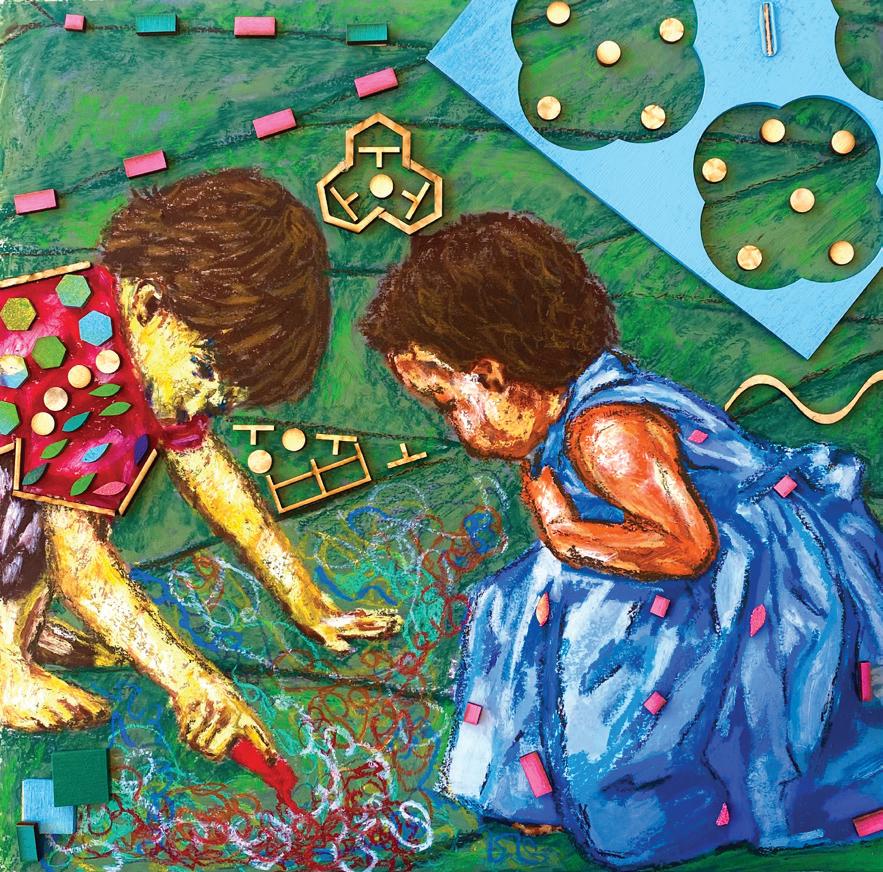
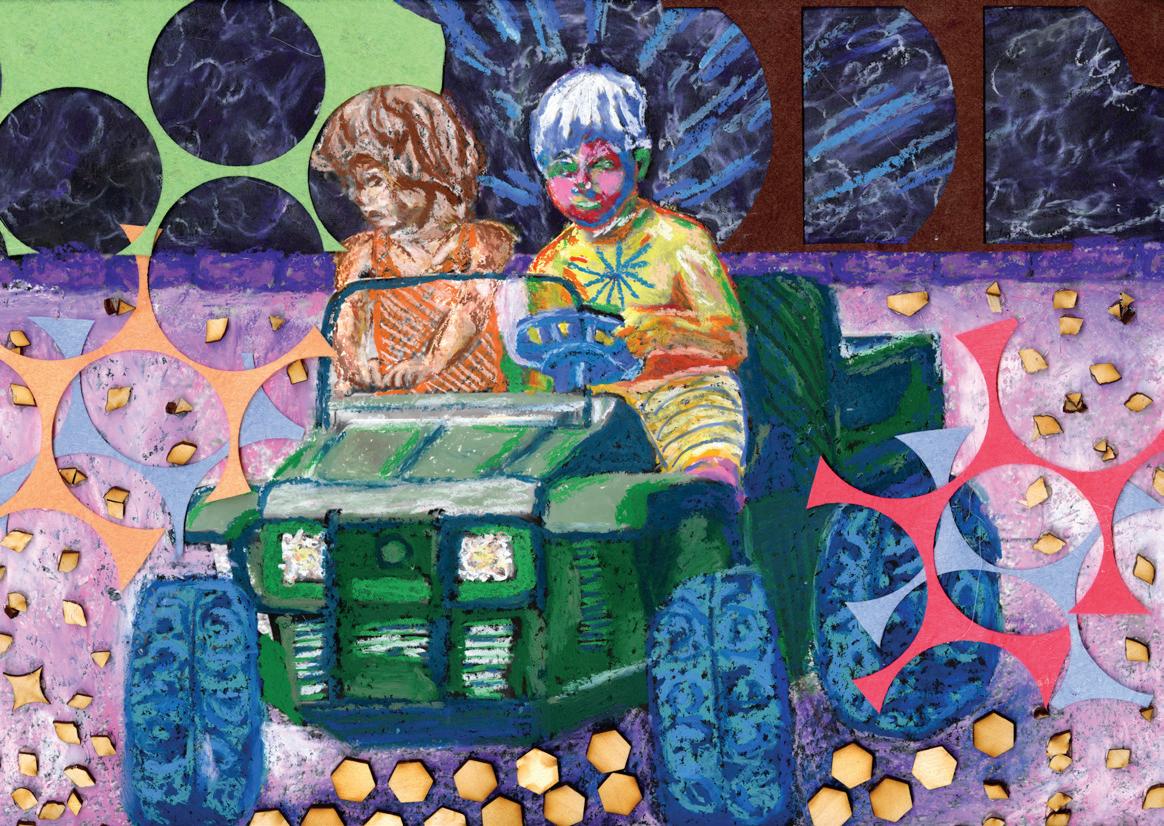 Summit Mock The Ride
Summit Mock The Ride
11
Summit Mock Sidewalk Games
Escaping High School
after Lauren Groff Maddie van der Weijden
I have somehow arrived in high school, and because I do not want to deal with highschool, with tests, quizzes, exams, and homework, I slip into my Crocs and prepare to leave the house in which I have spent so many nights studying, and leave the cleaning and organizing to my mom, a woman who does not have homework, yet still understands high school. I strap my best friend in the world into his cat carrier backpack and slide out the door into the rapidly cooling temperature that still holds the heavy summer humidity, yielding to the threat of perspiration.
As I walk down the street, further from home, my mind is released from pressure. The street is a different world from home, away from the clank of the dishes being washed and the unceasing conversation of schoolwork. The street is quiet, apart from the few people on the sidewalk. An elderly couple cycles by, waving and giving me a frail smile. The woman wears a bright teal tracksuit and the man pedals so leisurely that I worry the bike might tip, sending him skipping across the rugged pavement and into a sterile, white hospital bed. The same thought broadcasts in my mind when I place the most recent issue of the newspaper on my delicate neighbor’s porch for the third week in a row. I have not seen her in a couple months, which causes some perturbation in the back of my mind, but I keep walking anyway. A squirrel looks at me, prepared to alert his friends at the first sign of danger, and as I continue on, I notice that he has slipped away like a ninja in the night; I must have frightened him. As I lengthen my distance from home, I notice the sweet sounds of birds softening as I walk by. I wonder if my walk has interrupted their sundown tunes. I walk past the house that was once the property of a great big dog named Dutch. I used to be afraid of his deafeningly powerful barks, but now the house seems vacant and noiseless. My attention is lifted from this melancholy recollection as I become aware that the perpetual construction in the yard of the corner house has finally ceased and that little umbrellas and lights cast shadows on the unused pool deck.
I make it a point to be on the dock when the sky starts to darken. The sun has almost set and the cotton candy sky sweeps in a gentle, light pink to blue ombré, only broken by the purple hazed clouds that drift aimlessly for no particular cause. The smell
12
of the salty water mixed with hints of motor oil rises toward my nostrils with each gently crashing wave. The crickets start their melody and the birds rest until morning. I peel myself away from the picturesque image and start back towards my house and its heavy weight of responsibility. As I persist, I catch a glimpse of a son, who looks to be around the age of twenty, and his father singing while doing dishes, side-by-side in their illuminated kitchen. I wonder if they are always this close or if they are just celebrating time home from college. Out of my peripheral vision, I see a young woman jogging in bright Lululemon shorts, the same kind that I just bought in the color black. The woman looks lonely and I can’t help but ponder if she too is running away from something.
When I am near my house, I slow my pace. This will last as long as I demand it to. Soon, I am hauling my sore, swim practice body up the front stairs and through the old wooden door. High school engulfs me, luring me back into its closed doors that have now, after my extended release, learned how to lock.
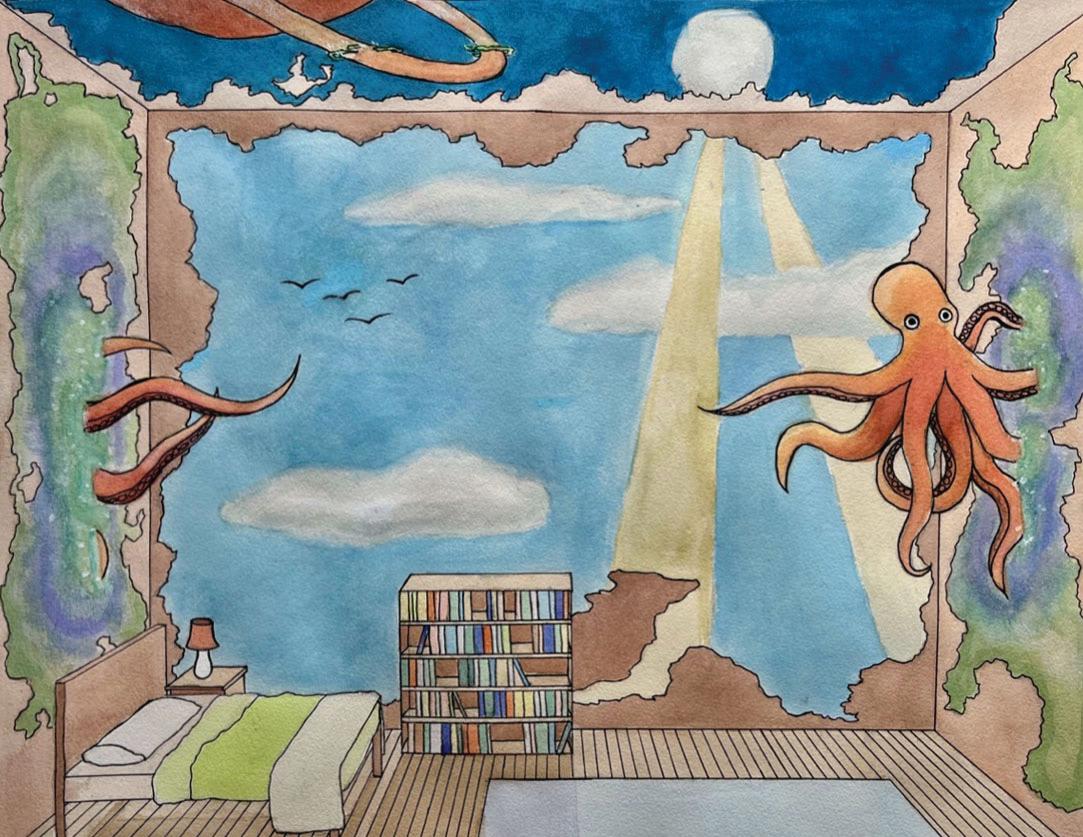
13
Estelle Santulin Bedroom Perspective
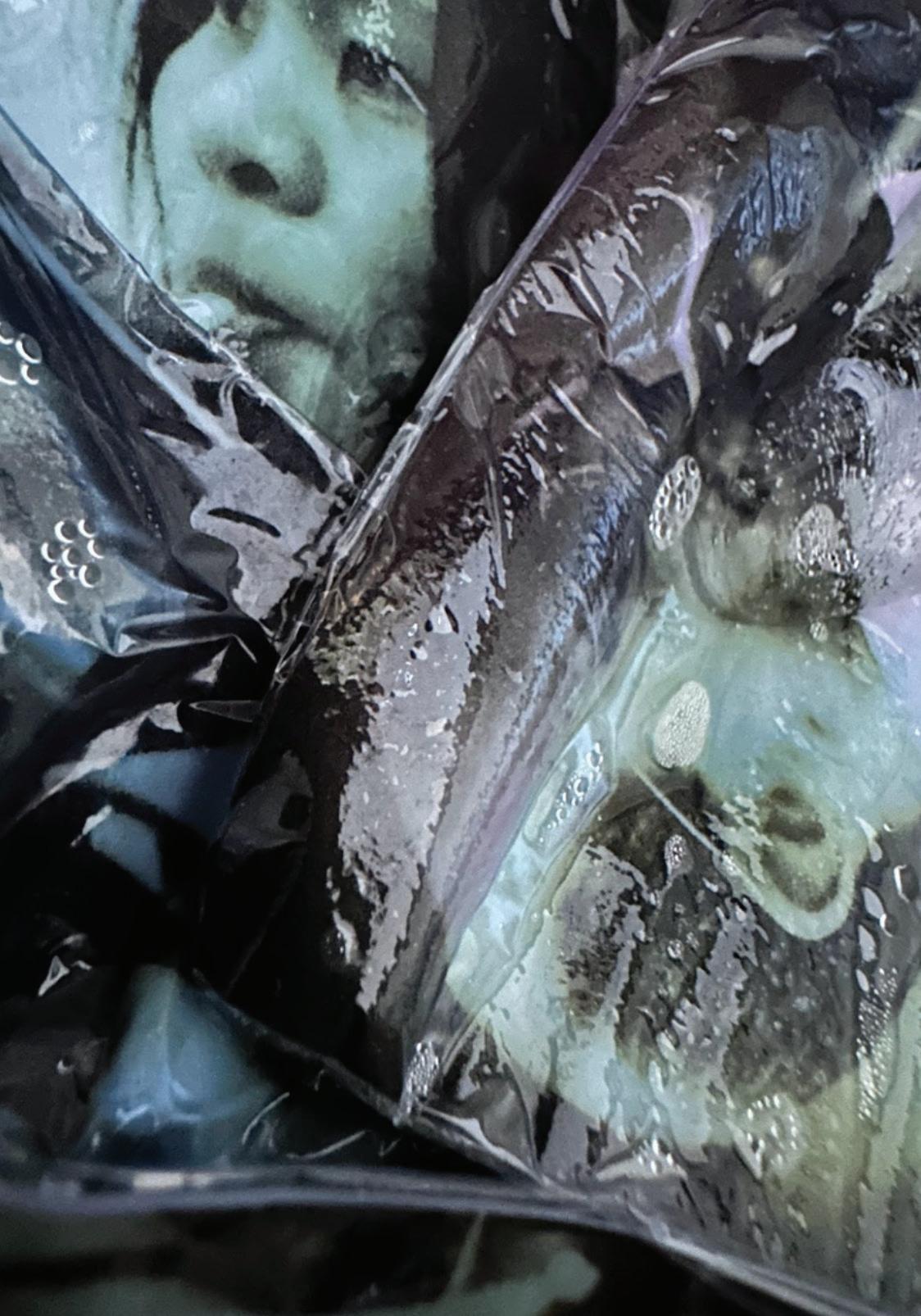
14
Anna Leventon Entwined
Airport Taxi
Natalie Cook
There is a small yellow car out on the runway. It looks like a taxi but with no advertisement for the 2011 Lion King. Instead of people, planes stand next to it as it passes under their big bellies. Three lights on its rear blink once left, once right, then twice in the middle. It’s a comforting rhythm in the corner of my eye as I take my fourth-ever video of a plane taking off.
I don’t think the planes care much about the taxi, though. Their small lights each blink to their own beats, like tiny fireflies. Not even in synchrony with each other.
But when people start to board with luggage, each plane begins to watch the car and each plane begins to rely on it, and the taxi is disgruntled, but it blinks once left, once right, and once in the middle.
It putters around the corner. The planes will never crash because they know just where to move, because the taxi light is like their North Star in this gray airport solar system and I don’t even want to take my video now.
15
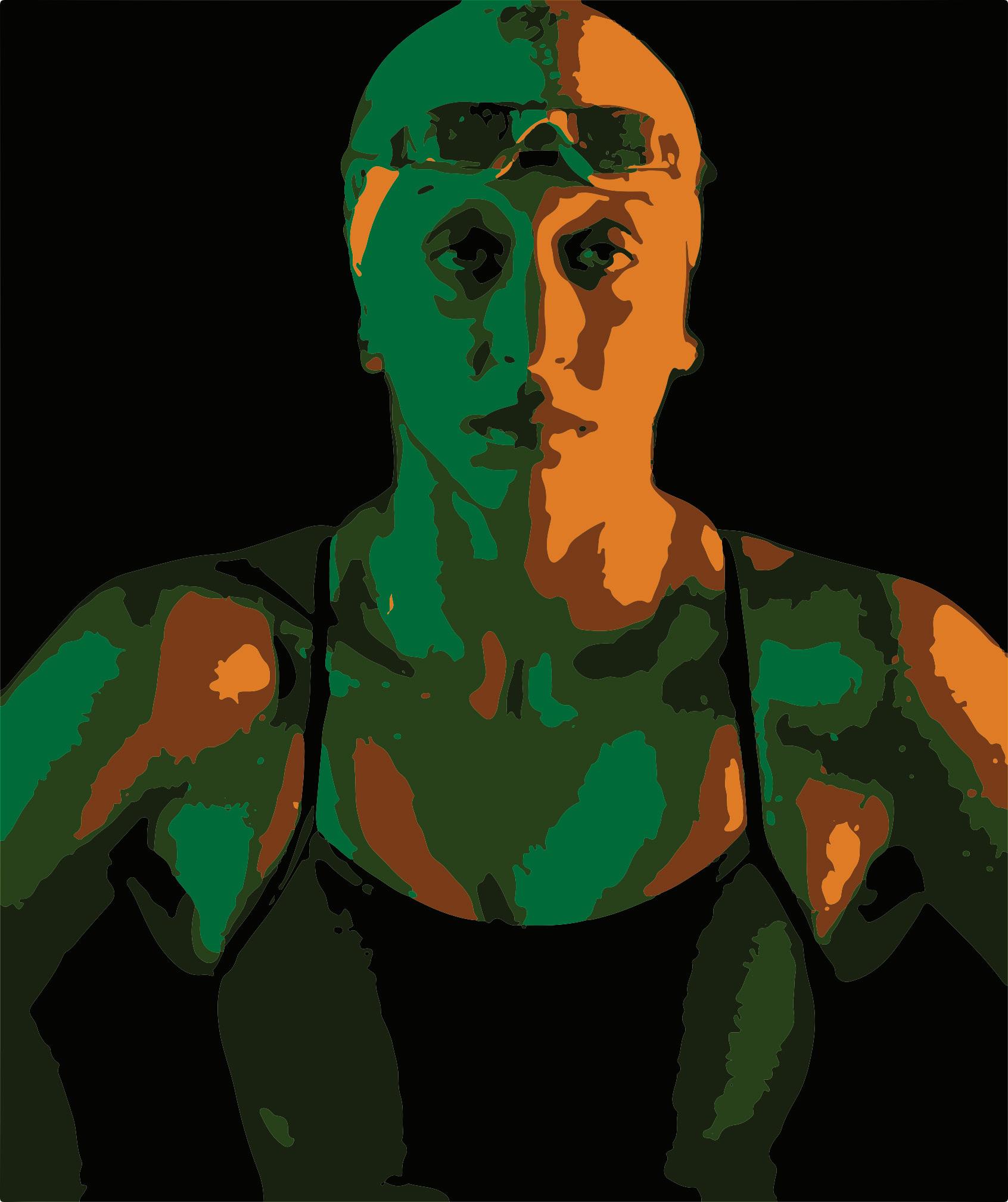 Bryce Gold
Bryce Gold
16
The Swimmer
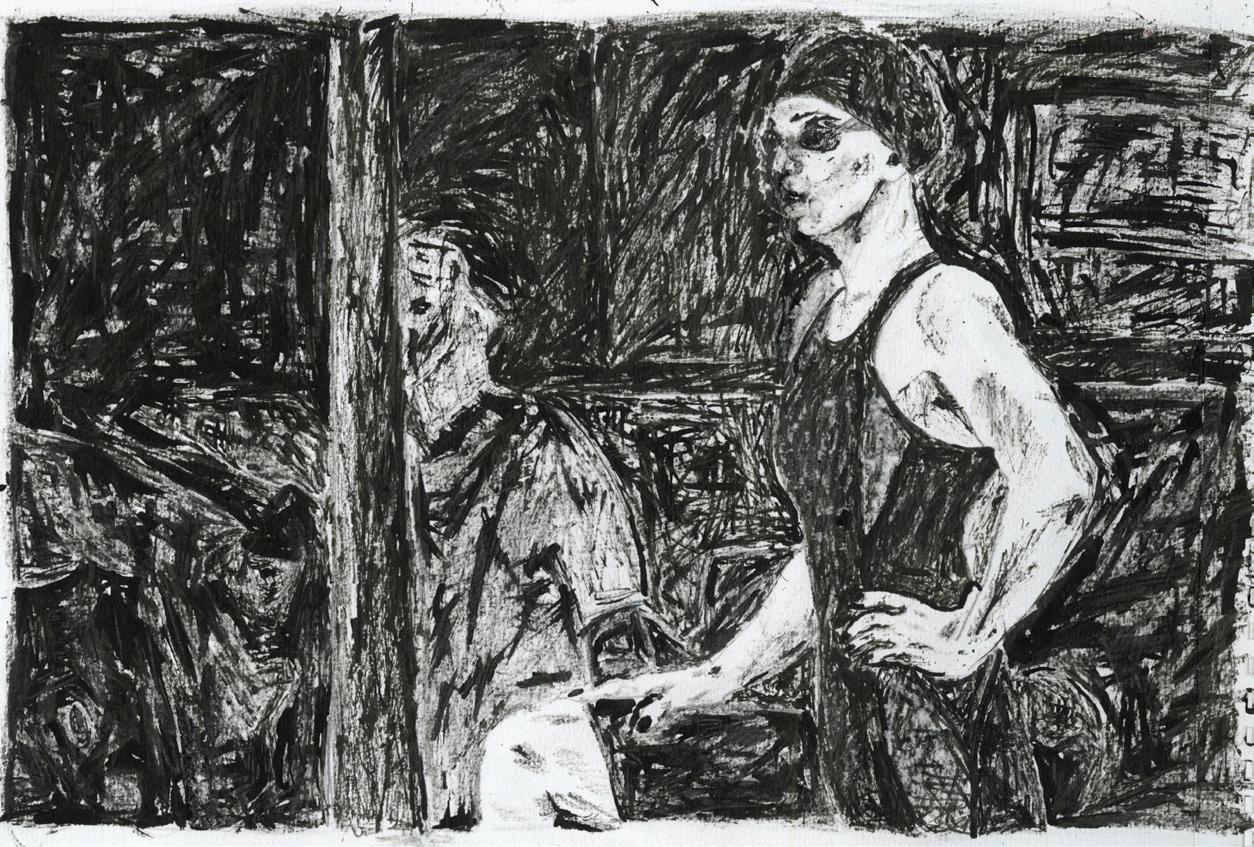
Bryce Gold Pre-Race Anticipation
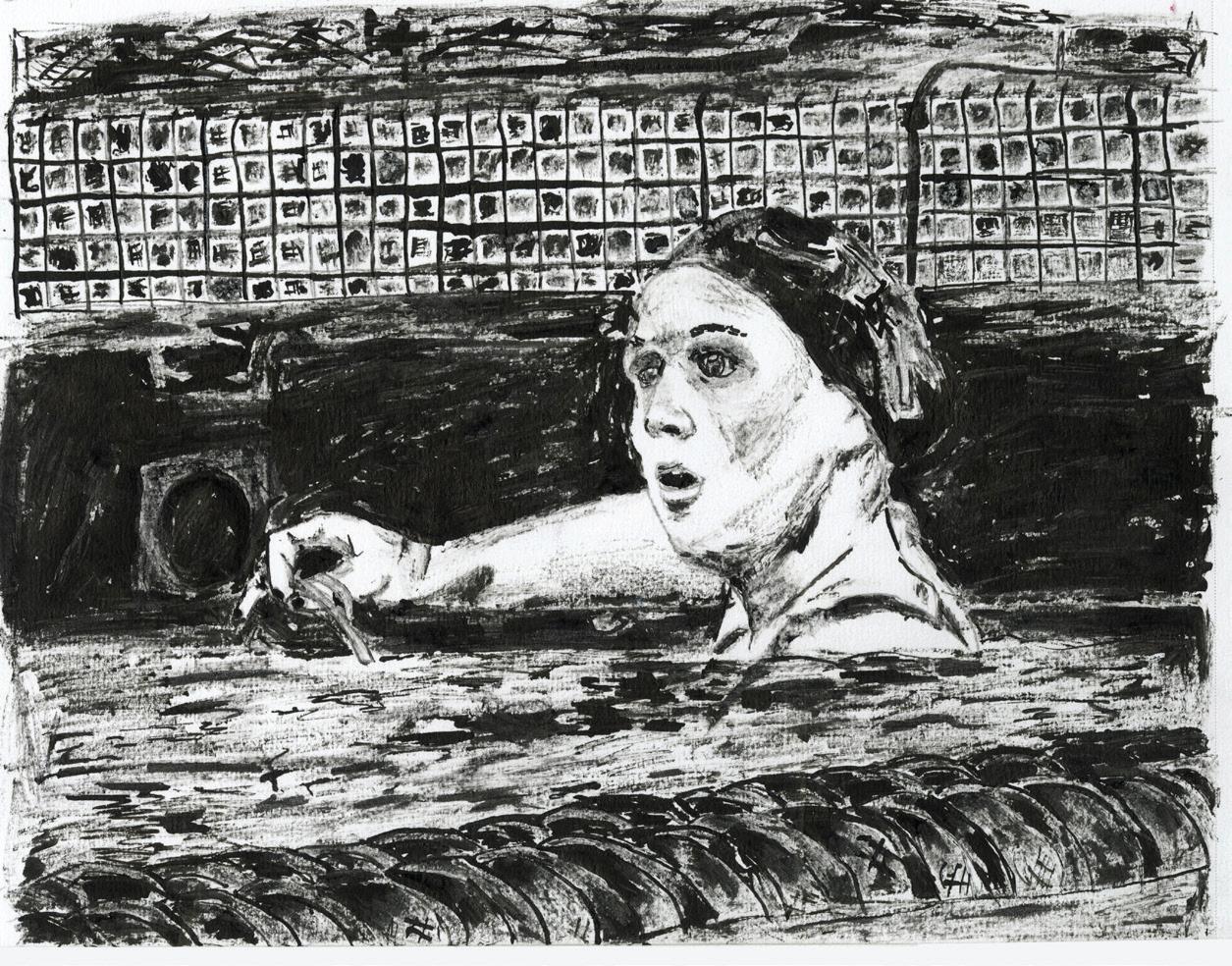
Bryce Gold An Unexpected Turn
17
Looking for East 57th Street
after “Looking for the Gulf Motel” by Richard Blanco Sophie Calise
Everything would be the same...
The gold lion knocker would still stare proudly as the light hit its face, jutting out of the large white door like a guard at a palace. The crystal chandelier hanging tall would still glisten and sparkle, sending hundreds of rainbows into the air of the apartment’s foyer. I would sit politely on the sofa, examining the elaborate web of gold and silver stitches. My fingers would stumble like untrained dancers as I attempted to untie my pink shoelaces. Lifting my head, my eyes would settle on my Mémé, standing watchfully in the doorway. With a quick kiss on the cheek and a delicate but tight embrace, she would whisper, Happy Birthday.
Everything would be the same...
I would take her soft hand as she swiftly guided me through the busy streets of New York: Mémé insisted that a lady must attend a matinée on her birthday. My eyes would widen at every towering skyscraper and bright billboard, my nose drawn toward every hot dog cart and away from every smoker. We would only stop for a moment on Broadway to watch the street dancers flip and twist and turn to the loud music before continuing on to the line of people waiting for the show.
Everything would be the same...
And at the end of the day, we would walk down the block to the convenience store, right to the back freezers where ice creams lined the walls, right to the single-serving Häagen-Dazs tubs. Although they are not as flashy as Drumsticks or a Choco-tacos, I would marvel at the fact that they looked exactly like the pint-sized tubs, but mine
18
was only for me. She would take a chocolate, and I a vanilla. And we would walk back to the apartment, one hand holding the icy carton and the other clasped around Mémé’s.
Everything would be the same...
She would tuck me in with a kiss on the forehead and an I love you. Then, she would walk out, leaving the door just slightly ajar so a ribbon of the kitchen light would stream in. And I would fall asleep to the sounds of the city below—but I won’t. Instead, I will visit her in her new apartment, one closer to us and away from the busy city. I will greet her caretaker, and I will kiss my Mémé on the cheek as I remind her who I am. Yes, Mémé, I am your granddaughter. You are at home, Mémé. Yes, it is your home, isn’t it lovely? It’s me, Mémé, remember?
 Denise Seol Inside Look
Denise Seol Inside Look
19
Curiosity
Victoria Batres
Completely focused, her small yet quick fingers yearn to lift a rock that seems bigger than herself. She crouches down until narrow strips of green brush against and tickle her legs. Stretching out to the rock, she realizes one hand won’t be enough. So, she widens her stance and uses both hands to reach underneath and press up until the furry, damp moss sinks below her warm (and slightly sticky) fingers. The rock still won’t budge.
More focused now and only slightly more desperate, she circles the rock, searching for a small crack or divot. See, she was looking for something specific.
Earlier, as she was tottering down the trail, her eyes would intermittently flicker down to the space between her arm and side to the book she had brought with her: Adventures of Frog & Toad. This one copy was a mere representation of the illustrated books she had read before but couldn’t necessarily remember the titles. Not cartoons, certainly not cartoons, illustrated stories. She made this distinction within her mind because, obviously, these were not the cartoons her peers had been reading.
Of course, she could read chapter books already and loved to browse through science encyclopedias, but there was something different about the illustrations in the children’s books she had read. Within them are frames of squirrels living in tree trunks outfitted with stoves and bedrooms, brown rabbits living in warmly lit burrows, or the smallest white mice sheltered from the winter in an acorn, and of course, a frog and toad traveling through the woods together. Families

She loved the simplicity of their lives and the details of the illustrations. She could feel the warmth reaching for her through the
Georgia Schmitz Visions of Lee-Lee 20
pages, the love, and the gentle nature of it all. Everything seemed to be delicately folded together, each stroke of color intentional yet effortless, as if they just happened to end up in the book. She knew she wouldn’t find any of this in nature, but she just had to see for herself. If not these little homes, then what?
Back to the rock. Well, pushing it could have cataclysmic results. Maybe she didn’t know exactly how insects lived, but she was smart enough to know that they had some form of balance in their lives, and fumbling around pushing rocks wasn’t going to get her any answers. It was slowly becoming clear to her that this specific rock was too ambitious, especially if she wasn’t going to ask for help (if she did, this wouldn’t exactly be her own discovery). She was slightly disappointed but even more determined now.
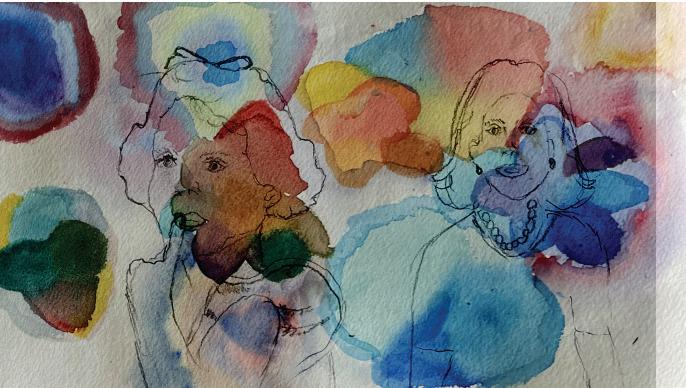
Now, she was back to circling the ground, inspecting each object with increasing scrutiny. She could ignore the areas of humid wood chips and dirt, but every other rock was closely studied to assess its potential for life. If a rock was too small, how could any observable creature dwell there? If a rock was too big, how was she expected to lift it? If she chose to lift the wrong rock, it would cheapen her experiment. Maybe a log would be better? However, a log would entail rolling, which she deduced was no better than pushing. Her hands were dusted with brown now, and as she continued her search, the distinguishable feeling of dirt set in, but she didn’t mind because the right rock had just caught her attention. She shifted the nature of her hands from rapid to swift and from fiddly to elegant. Raising the rock tentatively and expectantly, she lifted it to see...
A worm.
Her soul felt brighter, her hands were no longer dirty, she had discovered life! But how could someone so squishy and small live under such pressure? She decided that this was a truly fascinating and special worm she would affectionately name: Wormy.
21
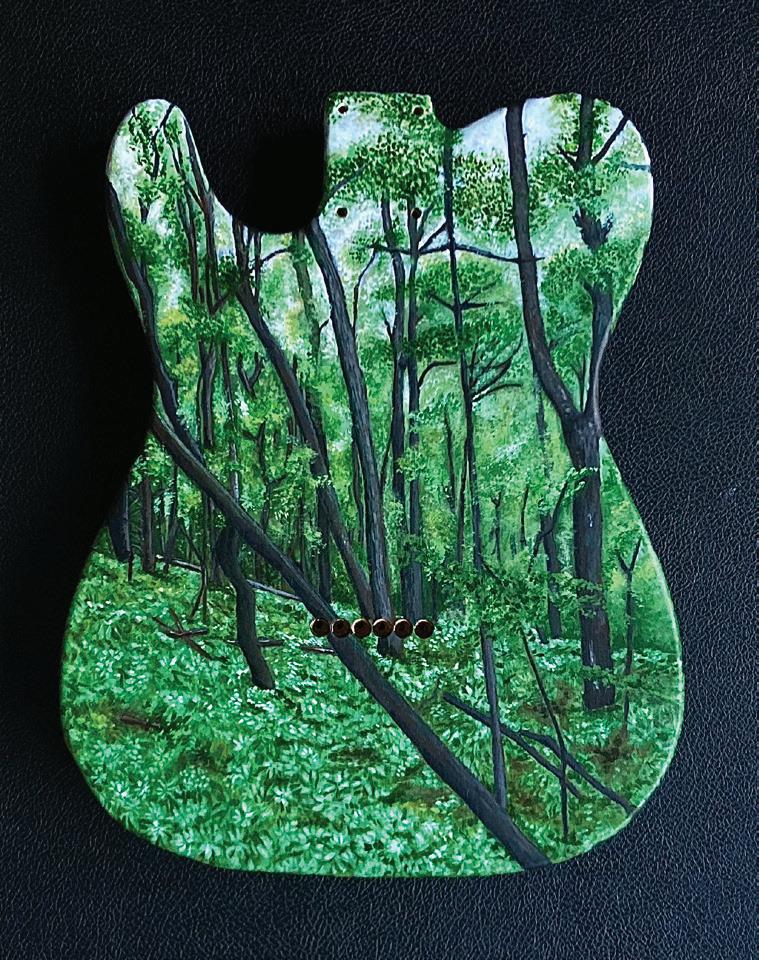
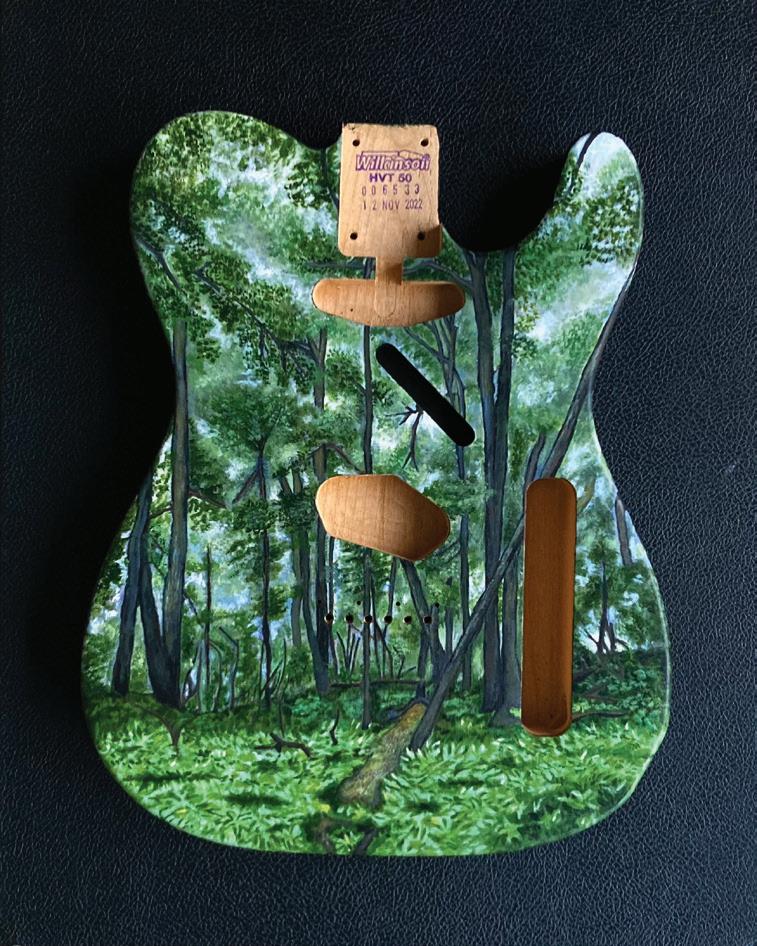
22
Zara Kurbanov Michigan Mist
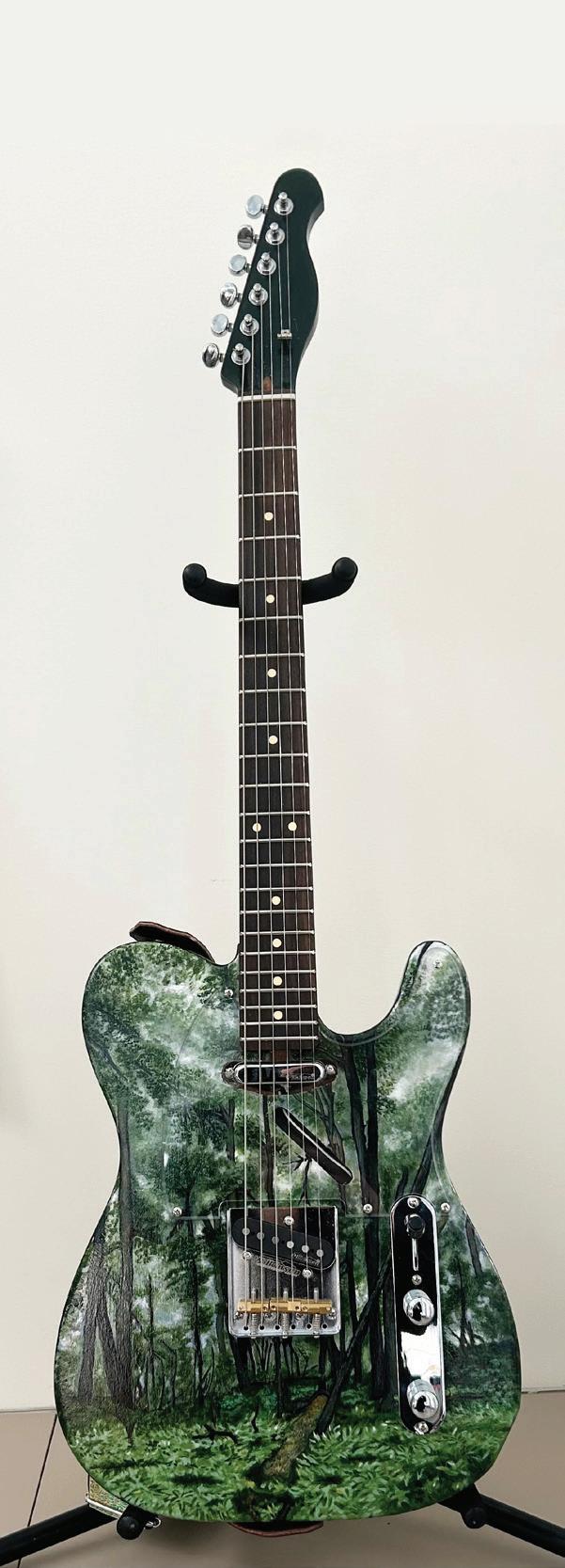
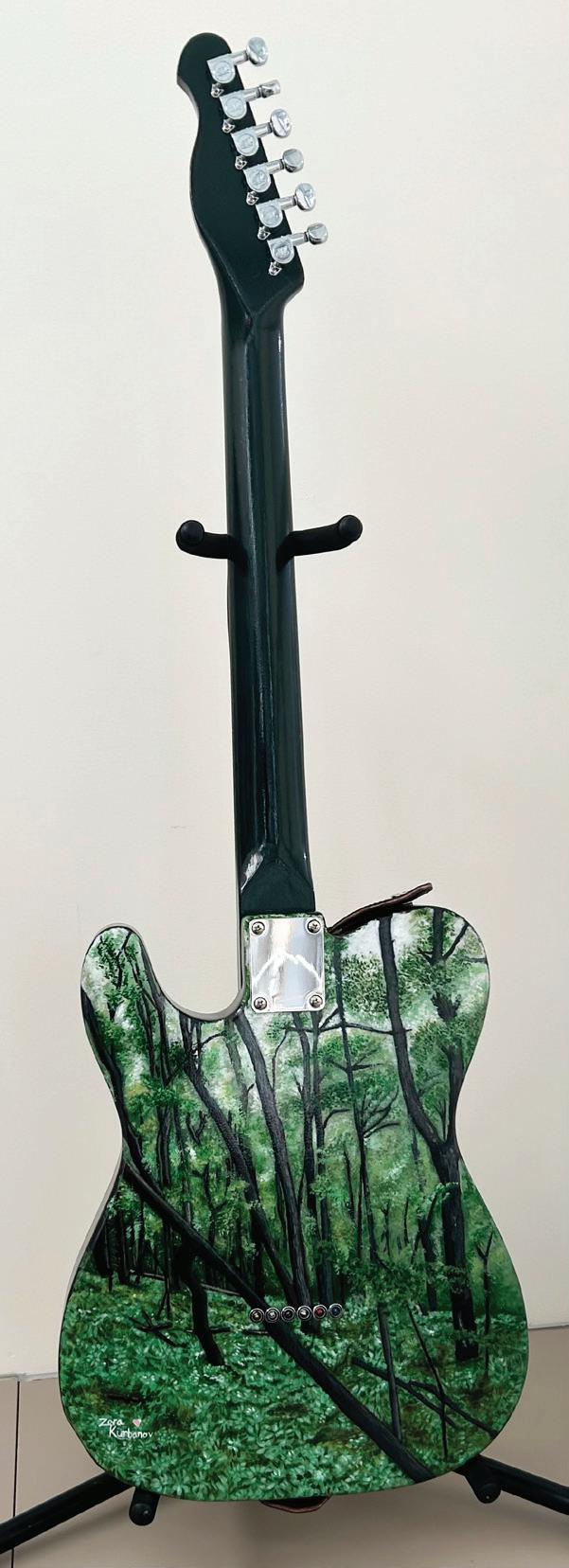
23
Superstitious
FADE IN
EXT. STREET - DAY
Libby Nook
IRIS, a teenage girl, walks down the street. She wears horseshoe earrings and an evil eye bracelet. A rabbit’s foot keychain hangs from her backpack. Iris intentionally does not step on the cracks of the sidewalk.
IRIS (V.O.)
I don’t consider myself superstitious.
Before crossing the street, Iris looks left, right, and then left.
Iris walks into school, checking her watch as it turns from 6:59 to 7:00. A maintenance worker is cleaning the window on a ladder. Iris intentionally walks far away from the ladder and sits down on a bench in the hallway to check something off of her to-do list. The hallway begins to fill with students. WYATT rushes inside, trying to move around people efficiently. Iris watches him run under the ladder to avoid the hallway “traffic.” Iris gasps. Wyatt sits down on the bench across from her. Iris is still stunned.
WYATT
Can I help you?
IRIS
You just…
Iris pauses.
IRIS (CONT’D)
You walked under a ladder.
WYATT
Yeah?
IRIS
Don’t you know how bad that is?
24
No.
It’s bad.
Wyatt laughs.
WYATT
IRIS
WYATT
Are you superstitious or something?
Iris’ face flushes.
No.
IRIS
Hallway bell RINGS. Iris zips her backpack. Wyatt notices her rabbit’s foot keychain.
INT. CLASSROOM - DAY
Wyatt and Iris sit around a harkness table in class. The teacher lectures around the room.
TEACHER
The future of our planet looks highly unpromising because of global warming.
Iris quietly KNOCKS on the wooden table three times. Wyatt notices.
INT. HALLWAY - DAY
The class bell RINGS. Wyatt follows Iris out of the classroom and into the library.
WYATT
You are superstitious!
IRIS
Why do you care?
25
WYATT
It’s a hoax.
Iris places her bag down at a cubicle and walks into an aisle, searching for a particular book. Wyatt stares at her and then at the backpack. He quickly creeps to the backpack and steals the rabbit’s foot keychain. With the keychain in his hand, he walks out of the library wearing a smile.
EXT. FRONT DOOR - AFTERNOON
Wyatt opens his front door to flustered Iris.
IRIS
Where is it?
WYATT
Where’s what?
IRIS
The rabbit’s foot.
WYATT
I don’t know what you’re talking about.
IRIS
I know you have it.
Wyatt laughs.
WYATT
I don’t get why it’s so-
Iris angrily grabs his shoulders with her hands and yells in his face.
IRIS
Give it to me now!
Wyatt backs up, shocked.
WYATT
What the hell?
IRIS
Please, I need it.
26
CUT TO:
EXT. FRONT DOOR - AFTERNOON
Wyatt returns with the rabbit’s foot keychain. He hands it to Iris.
WYATT
You know superstitions aren’t real, right?
IRIS
Prove it.
EXT. STREET - DAY
Iris walks to school, avoiding the cracks on the sidewalk. Wyatt plans a sneak attack. He waits behind a bush and jumps out, yelling into her face and causing Iris to step back in fear onto a crack.
Once she realizes what she’s done, Iris yells even louder. She runs away from Wyatt in an awkward stride that allows her to avoid the cracks.
INT. LIBRARY - DAY
Iris does homework at a table. Wyatt walks over to her. He stands on the opposite side of the table. Wyatt whispers and then throws a small-sized mirror at Iris.
WYATT
Catch.
Iris fails to catch the object, which is unclear to her. She watches it fall face-down onto the table. Wyatt runs out of the library. She picks it up and discovers a cracked mirror on the other side. Iris is horrified.
INT. HALLWAY - DAY
Wyatt steps into the hallway with an open umbrella. Iris spots him. Her eyes get wide, and she shakes her head. Wyatt chases Iris through the school. Iris begins laughing as she swerves through the hallway with Wyatt close behind. Iris trips on a backpack and falls. Wyatt and Iris laugh. Wyatt offers out one hand, holding the
27
umbrella in his other hand. Iris accepts the help.
EXT. FRONT DOOR - NIGHT
Wyatt opens the door to disheveled Iris. Speechless, Wyatt scrambles for words but is cut off by Iris.
IRIS
It might be a hoax.
WYATT It is a hoax.
IRIS
What do I do?
EXT. FIRE - EVENING
Iris and Wyatt stand around a fire. Iris throws all of her “lucky items” into the fire.
WYATT
You’re free now.
IRIS
Free to die.
No.
Iris looks at him.
WYATT
WYATT (CONT’D)
Free to live.
FADE TO BLACK
Anniston Mahaffy Family Stroll
28
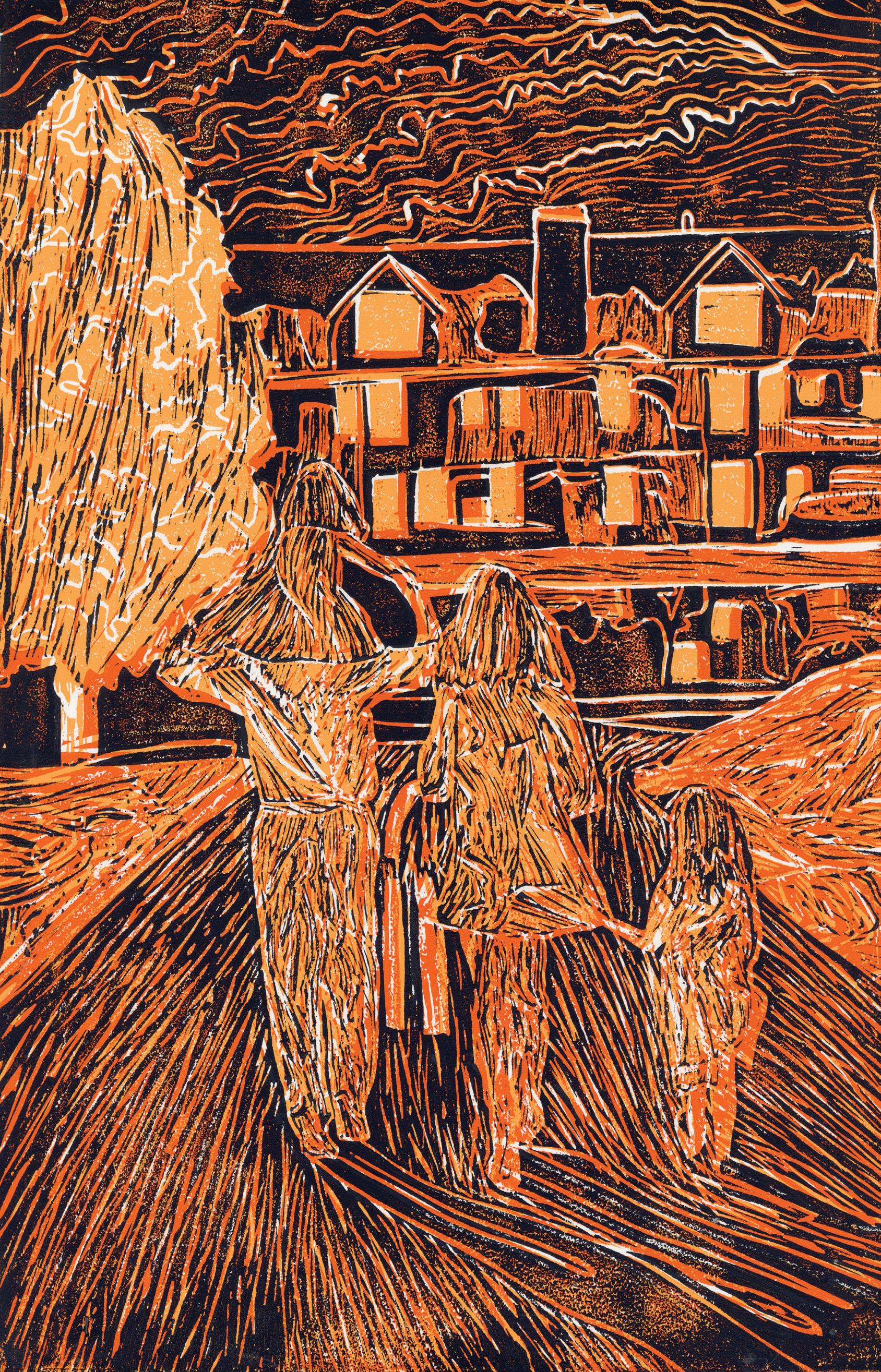
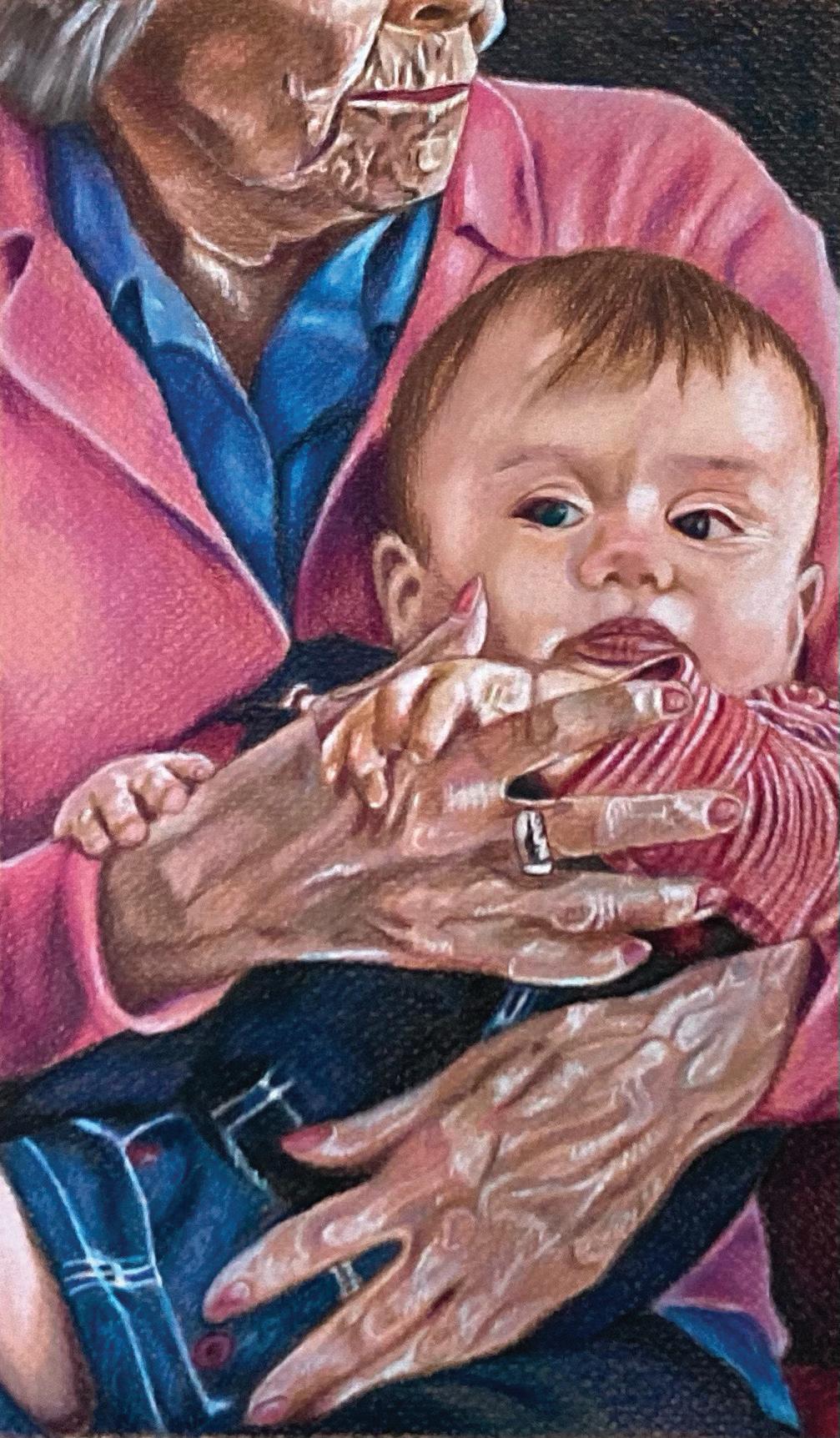
30
Zara Kurbanov Grandma’s Treasure
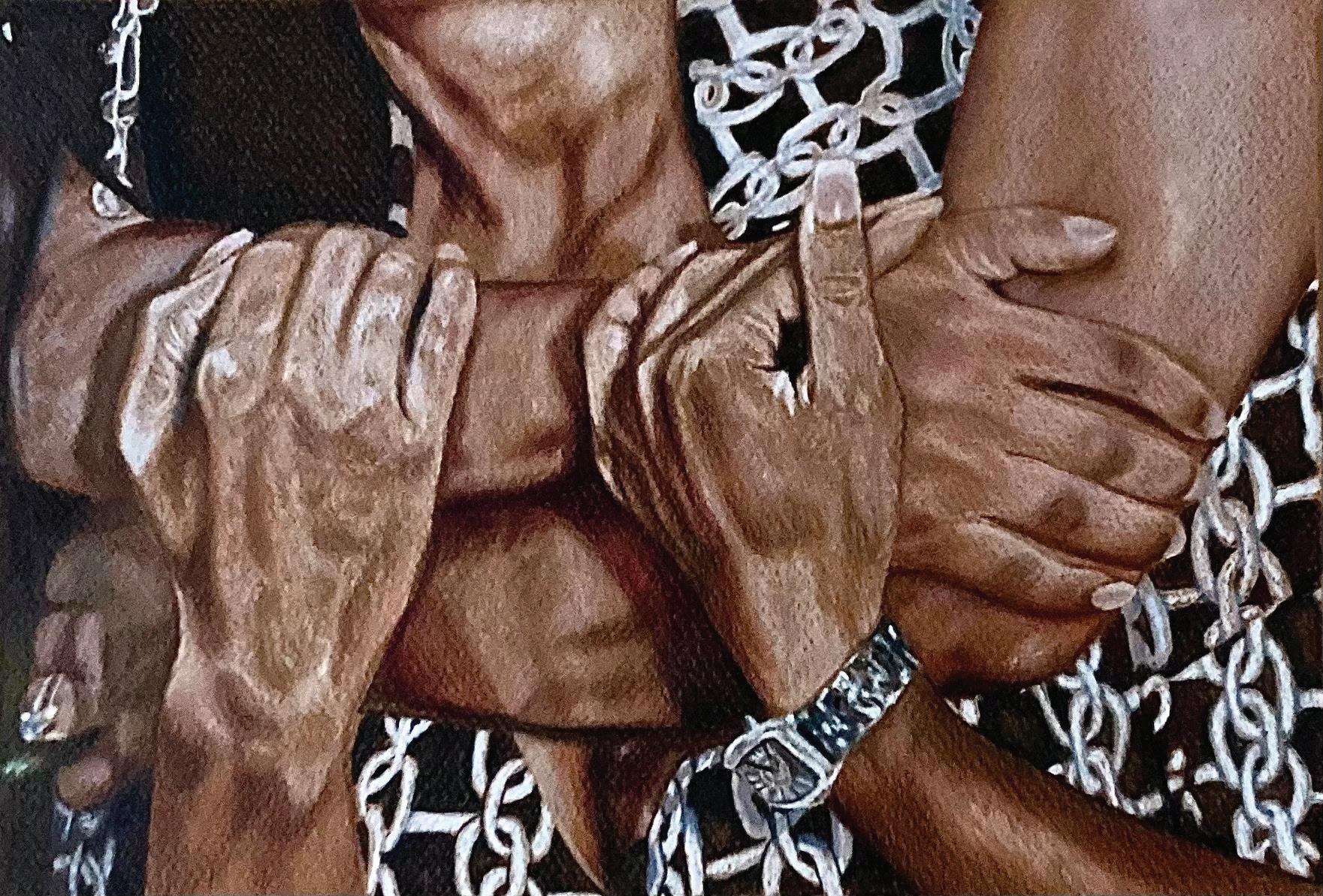
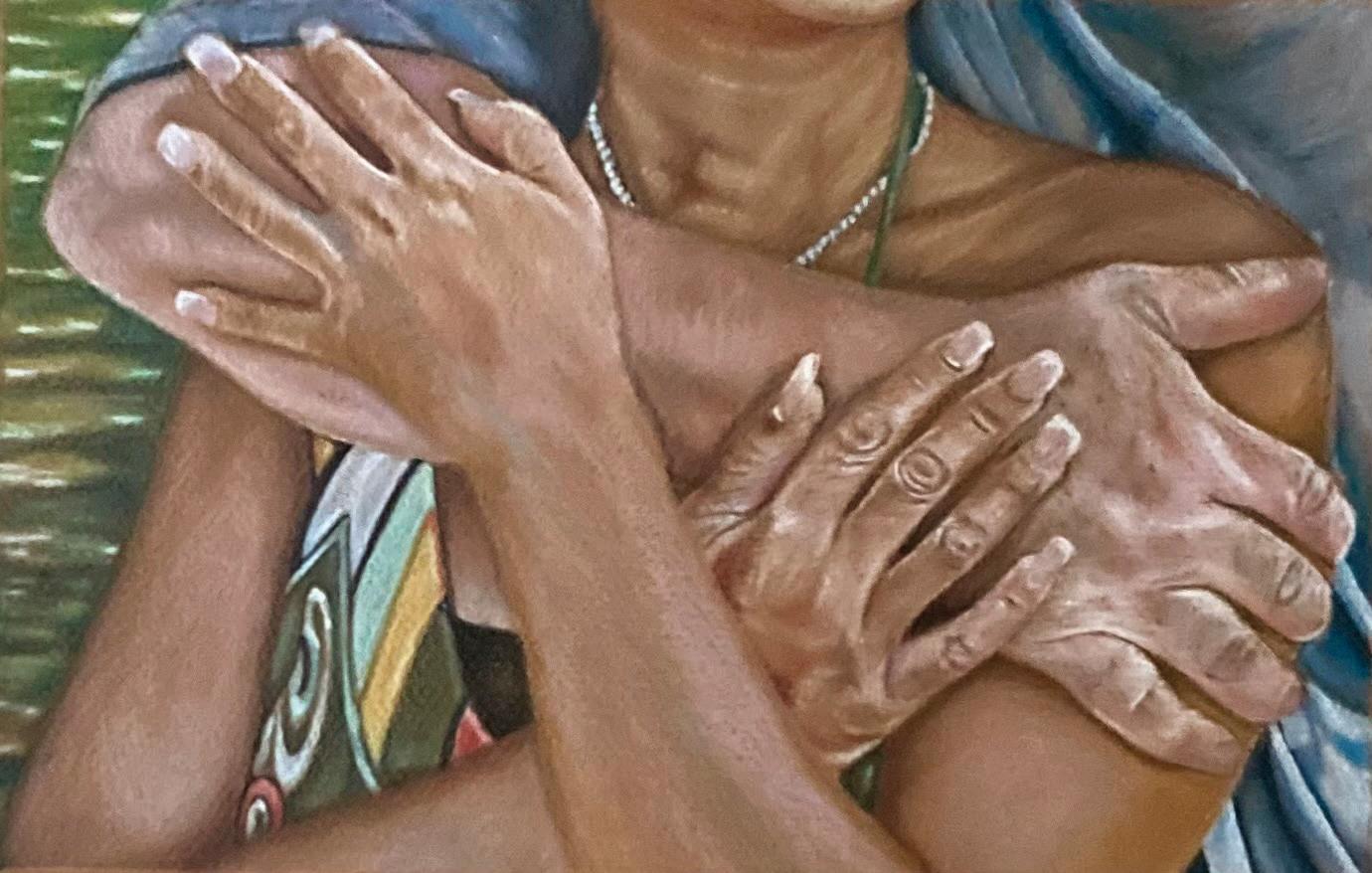 Zara Kurbanov Embrace
Zara Kurbanov Embrace
31
Zara Kurbanov In His Arms

All-American
32
Maya Tillman
Boy
Incoming Call
Abby Kesmodel
My fourteenth birthday present was a rejection call.
We were all gathered around the porch of our L.A. studio apartment, eating the cake that Dad’s girlfriend Linda bought from Stop & Shop when Dad’s phone began to ring.
“Sorry, Boo,” he said, ruffling my hair. “Someone’s always gotta come in and ruin the moment.” He reached into his khaki pocket, smudging a bit of bright pink frosting. “Hey.” Pause. “Yeah, sure, one moment.” He handed it to me, whiskers shuffling places on his beard. “Scotty wants to talk to you for a moment.”
Scotty Kobalt was our producer; I first met him when I was ten years old and Linda had submitted a tape of me singing without my knowledge. I was invited to a callback in LA, where he gave me a heavily censored version of “Good 4 U” to perform for him.
Two weeks later, I became a Kidz Bop Kid.
I had only seen him a couple times since; he was bald but had these really greasy sideburns that some of us thought were drawn-on for a brief period during our Texas tour, and he didn’t speak frequently. When he did, he was either fired up or pissed out of his mind. And I didn’t exactly want to guess which one he was now. I took Dad’s phone into my bedroom and waited for the news.
“Hi, Mr. Kobalt.”
“Hello, Jason. I hope I’m not interrupting anything right now.”
“Nope. Just my birthday party…” I said, letting out a sigh.
“Oh. Well. I’m sorry about that, kid.” Kid. I had never heard this man show an ounce of affection once in my life. It creeped me out a bit. “I wanted to talk to you. About the Kidz Bop Kids.”
“Well yeah, what else would you talk to me about?” There was a long pause, during which I was quite glad that he was only paying me to have good teeth and sing lawsuit-prone covers.
“Jason, are you still there?” I was petrified at this point. Out of context, this conversation would sound like something from a horror movie. I was scared he’d jump out from behind me at any moment and suck out my soul.
“Yeah, I am.”
“Okay, kid, I’d like for you to take a deep breath.” He really was going to murder me. And no one would hear it, because this room had awful acoustics. Our neighbors knew that best. “I think
33
it’s time for you to leave the Kidz Bop Kids.”
Thank god. Wait, what?
“Leave the Kids Bop Kids?” My voice tangled in my throat.
“Well, you’re thirteen now—”
“Fourteen.”
“Fourteen—shit. And that’s a bit old to be a Kids Bop Kid, don’t you think?” My good sense finally found my cheeks, burning, pinker than blush. I didn’t do anything! Why is this happening?
“Mr. Kobalt, I don’t—I don’t see why I can’t—I can’t keep doing this. I don’t look a day over twelve.” I was gasping for air now. This man was uprooting my entire life! I moved here for him, and he was pulling the plug?
“Tell that to the razor I found at your dressing room table during our promo shoot.” Okay, so I wasn’t entirely wrong about him being a complete creep. I didn’t really care though, because why would it matter if he wasn’t my producer anymore? This was— this was worse than when I was rejected from Music Man because I didn’t play cornet. Who even plays cornet?
“What does that have to do with this? My personal care doesn’t affect the way I sing.” “Your voice—It’s got nowhere to go but rock bottom.” Just like my career was the unsaid part. “Broadway, movies, TV—same deal. It’s only going to get worse, Jason. Let’s quit while we’re ahead.”
“But I can still sing hiIiIg—” And then my voice didn’t just crack. It exploded. Forget those bad acoustics, I could hear my voice catch onto every single thing in here. My signed Kidz Bop 2022 poster. My rosy-cheeked headshots. My hair gel. It was all a shrine to this little cherubic choir boy I had to be. And for the first thirteen years of my life, I was great at it.
“Right, you can. And I’m the Easter Bunny.” Belly laughs erupted over the phone, hot streams spewing over my face, probably screwing up my skincare, but that was far from my most important thought at the moment. This man was stripping me of my dignity. (To be fair, as one of the creators of “abcde forget u,” I probably had very little of it in the first place.) “It’s called Kidz Bop, not Awkward Lanky Ballscratching Manchild Bop.”
That was it. “You asshole!” I didn’t care that yelling at him could have drastically negative effects on my career. Because as far as I was concerned, my career was over.
“I’m terribly sorry that we have to—fall out of fashion like this, Jason.” But he wasn’t sorry. He was less sorry than our “Sorry Not
34
Sorry” cover. “But hopefully we’ll meet again, in more—opportune situations.”
“Fuck you!” I screamed, then hung up the phone. Like he said, I wasn’t a kid anymore. I could lash out whenever the hell I wanted. I collapsed into my embroidered pillow, a sad heap of broken dreams. (I was too depressed even to make a Green Day reference). It was only a few minutes later when I got a call from the one place that a washed up child star could still make it big.
“Jason Winters? Would you be interested in a job with Disney Channel?”
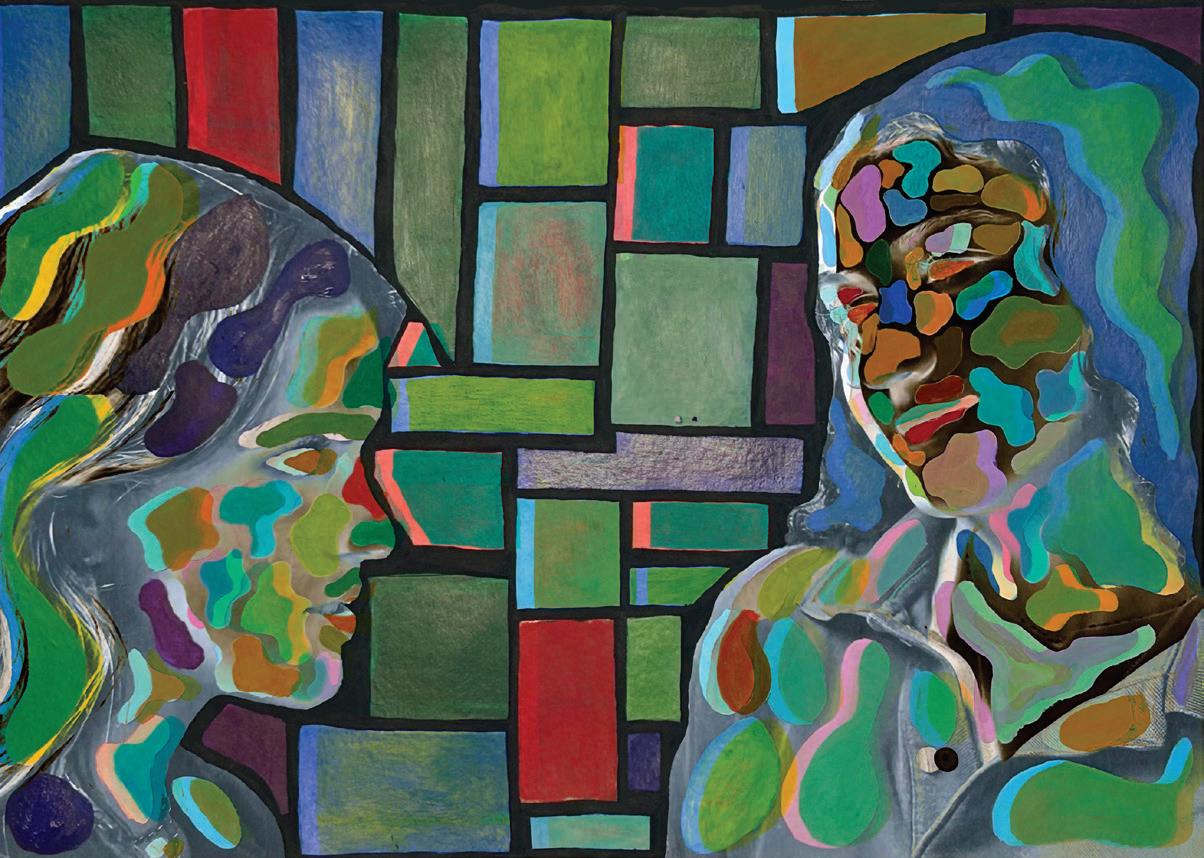
35
Persia Shipman Conversation
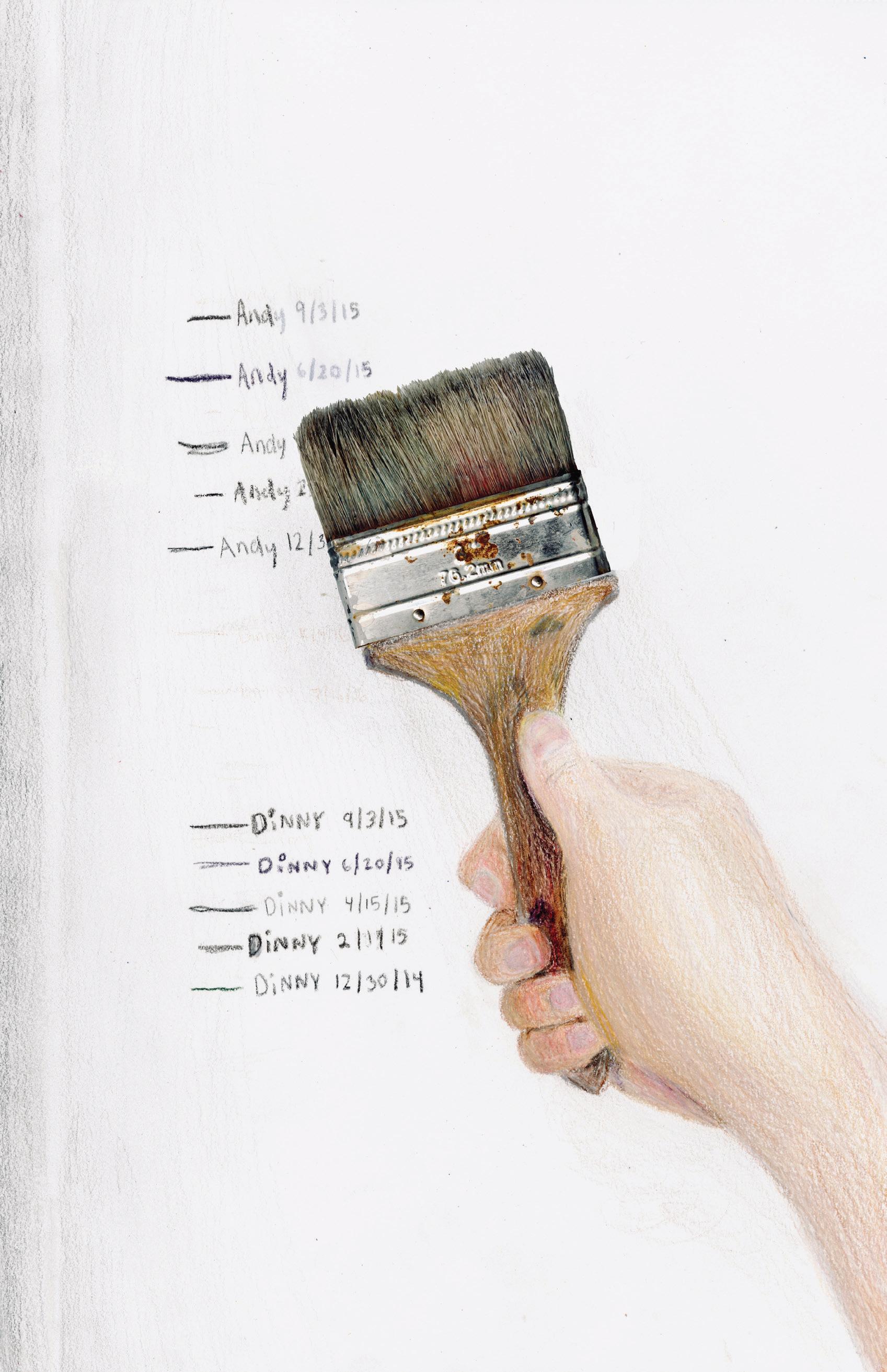
The Same Sky
Gold and yellow and pink
It looks like a nighttime city skyline
And trashy 80’s bubblegum, Bikes and skateboards and striped shirts
Vasilisa Banks
It’s the friends you make in another lifetime who you remember to this day
It’s the the feeling at the top of the roller coaster, before descent, when you look at the sky and See blood orange and red, maybe the stars are coming out
So many lights
You have it all
You are the sky
Fleeting and everlasting all at once
It’s an empty grocery aisle at night
Flickering lights and hoodies and Flip flops, neglected hair brushes and Scrunchies on wrists
Stocking up on snacks with your friends when it didn’t matter what you ate
Music and rain and Hot, hot summers,
Humid and unbearable but
Never spent alone
Uninterrupted laughter on the roof of a car miles and miles from home but under the same fading purple sky
Denise Seol
Starting Over 37
The Last Box of Annie’s Mac & Cheese
after William Carlos Williams Nina Lux
You wrote your name on the last box of Annie’s Mac & Cheese the first two letters Cé big and loopy in silver Sharpie
You left it in the pantry five months ago and I still haven’t eaten it I’m constantly reminded of both it and you
I don’t know if they have it there, if you keep a box in your own pantry I don’t know if you even care, but I still saved it for you so we won’t argue when your flight comes in at two
38

 Anna Leventon Puppet Master
Anna Leventon Puppet Master
39
Anna Leventon Shadow
LABYRINTH
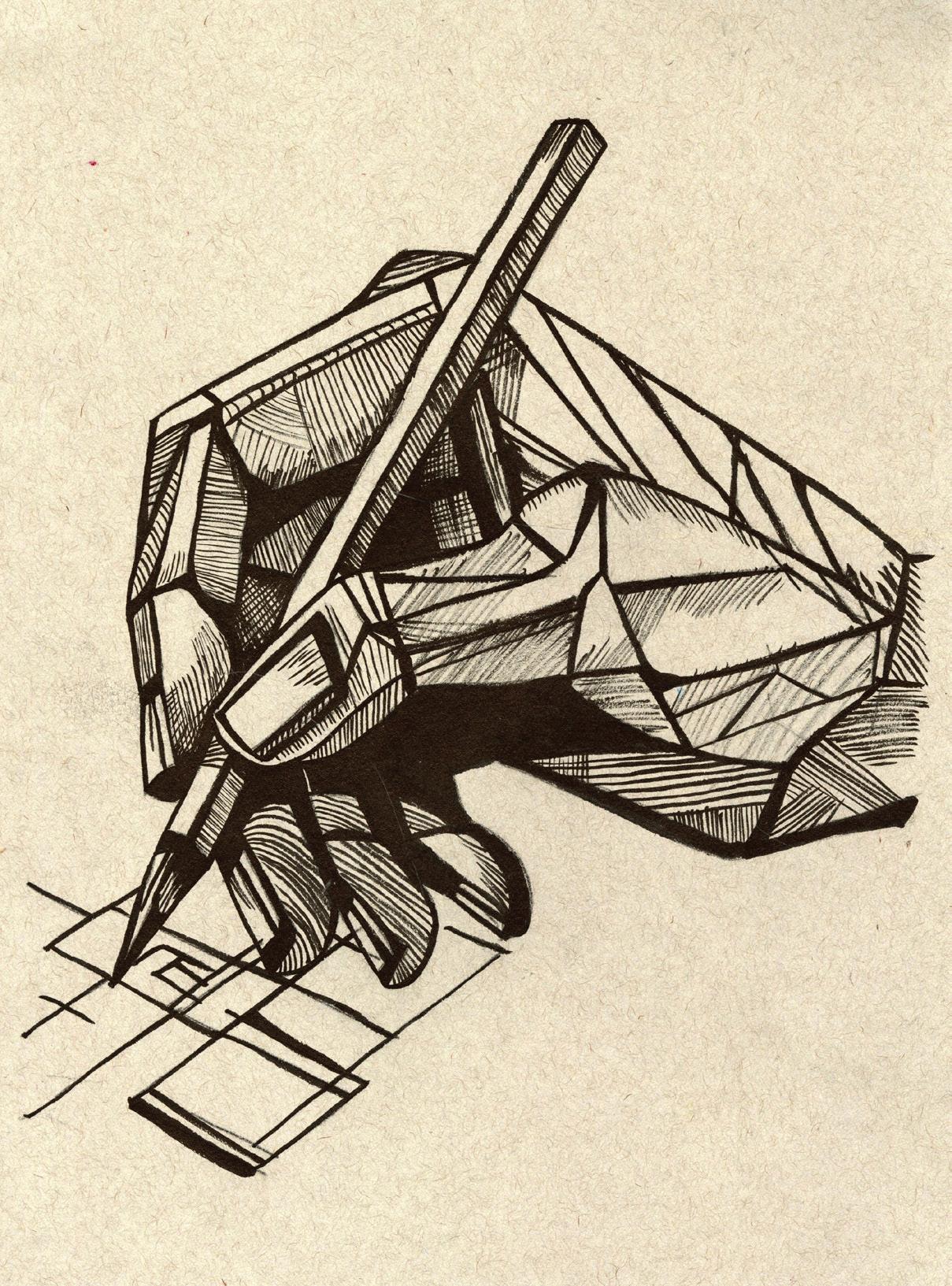
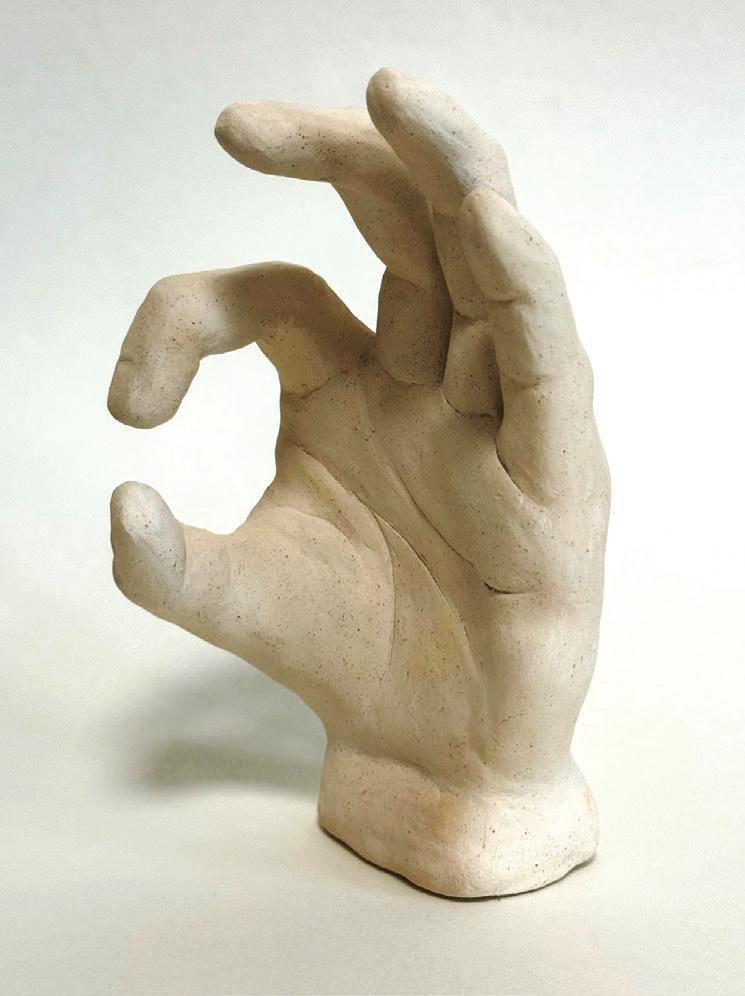
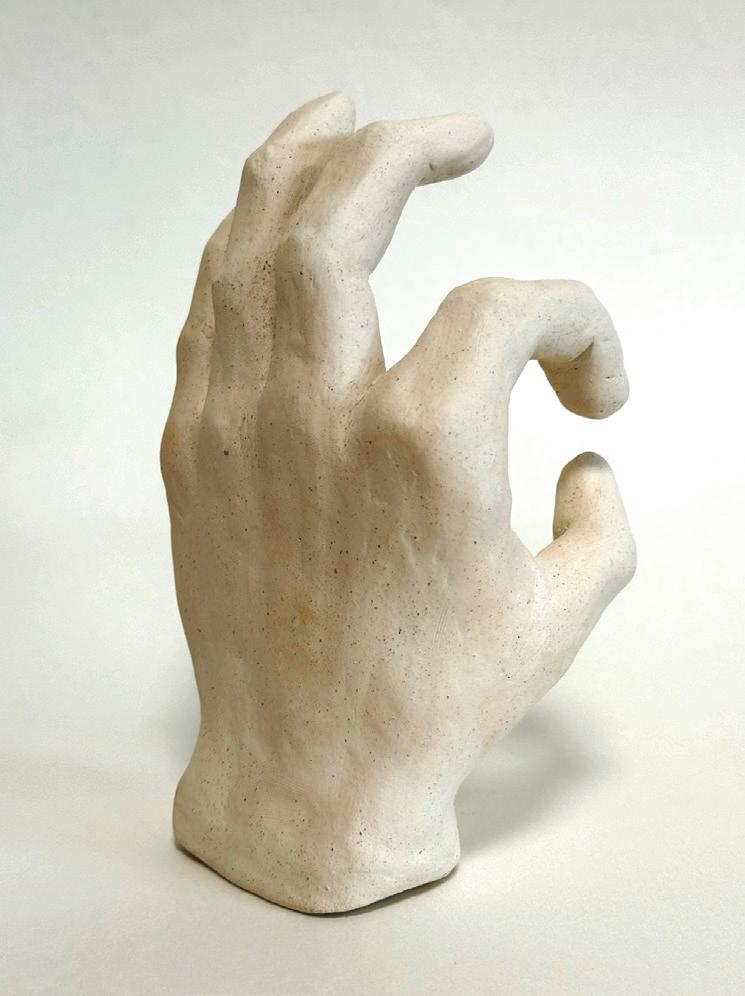
Much
This
42
Eleanor Kim
The Liar Paradox
Emma Jones
Do you know how hard it is to write a poem that rhymes?
So hard that I will not even attempt it in this poem. This poem will not rhyme. I have already written a rhyming poem.
Just once, a while ago. It was a poem about sadness, which made me sad. I wanted to love that poem, mostly because I figured out a way for it to rhyme, but its sadness made me resent it. This poem will be happy. I could write a poem about things like flowers and rainbows and God, but the only thing I resent more than rhyming poems are cliché poems.
This poem will not be cliché. I hope this poem will be very original.
As I’m sure you guessed, this is no haiku, no brief sonnet. This poem will be long. Personally, I enjoy long poems. I think long poems are great, but I’m aware that you may not agree with me, so I’ll try to make this a very short long poem. I can hear you through the page, telling me to get on with the story, with the meat of what I want to say. I’ll let you in on a little secret, sweet thing. This poem has no meat. It’s vegan.
43
Panes
They use sugar to make fake glass for movies
Big sheets of it for actors to soar into
To come crashing through
Sweet panels come splintering apart: a thousand saccharine shards
I woke to smashed windows
Joyce Huang
Crystalline slivers on the ground that caught the light in the ruinously alluring way that a taunt can feel so savagely satisfying when it almost seems within reach
Jagged empty frames through which warped, I had seen you
Fragments of those realities scattered
And against cold colorless concrete, you are not so glorious anymore
A transgression of my constitution
I didn’t have to unearth a buried sledgehammer or a high-flying brick or find your guilty fingerprints to identify the perpetrator
An obstinate thought rages its way to the limelight of my mind
“I must collect the shattered bits I must force it all back together”
And it matters not if I prick myself and it matters not if I bleed because I already ache and it already stings
And I reach out for the past, almost gripping it in my palms but I look down and suddenly I notice the tiny bubbles trapped beneath the surface and the broken pieces are melting and it is not glass
Trembling hands bring the crystals to my lips
My tongue curls around the sharpness and my palate does not lie: it is sugar but it doesn’t taste sweet
44
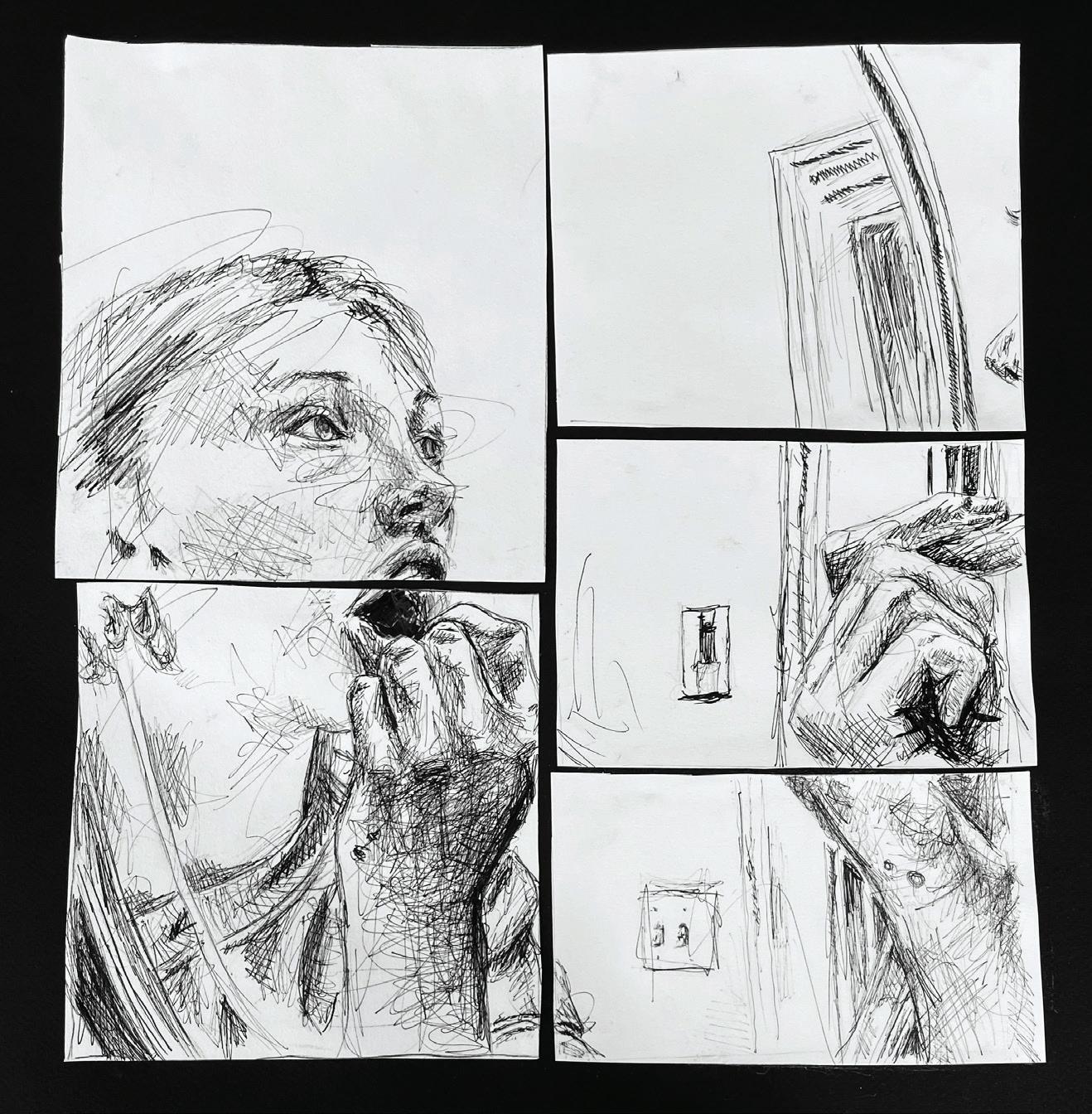
45
Ainsley McKee Through the Looking Glass
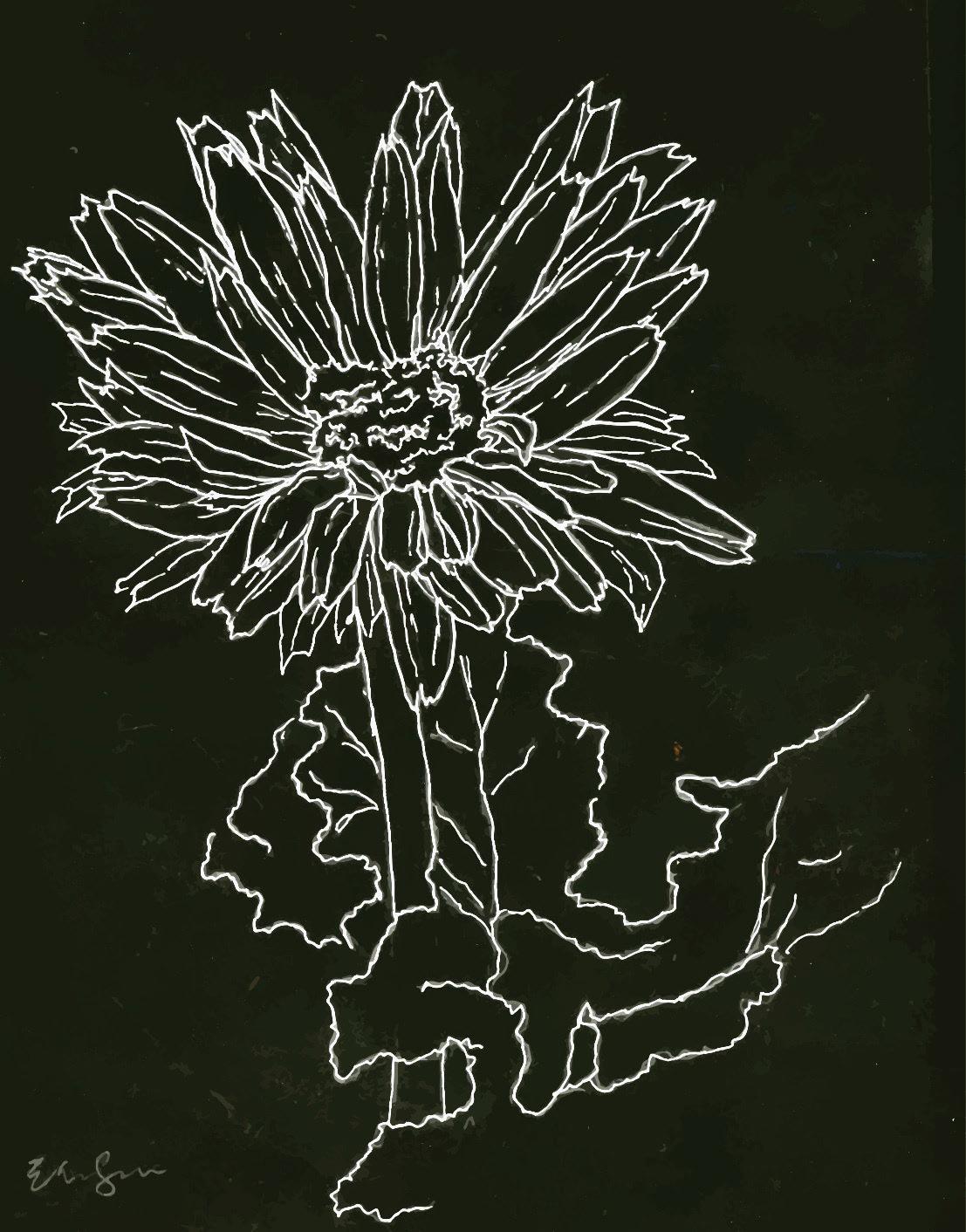
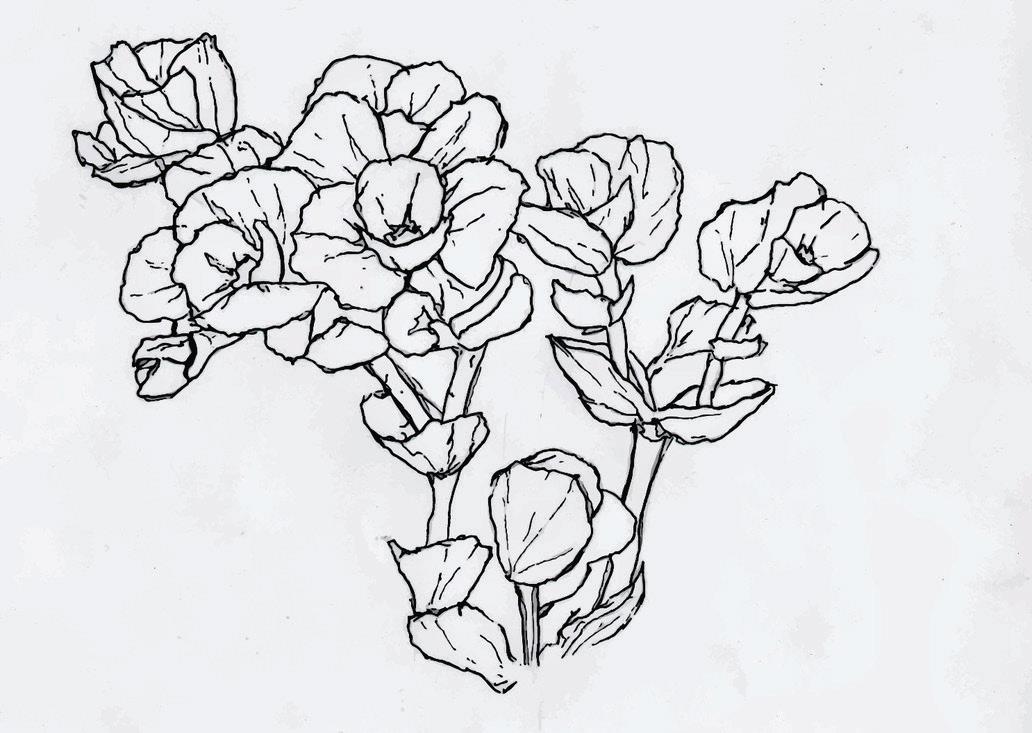 Elena Schmedlen Botanical Study, 2
Elena Schmedlen Botanical Study, 2
46
Elena Schmedlen Botanical Study, 1
The Death of the Beetle
Alessia Cutaia
I will forever claim myself to be the herald of the death of the beetle. I will shout my disgust for every winged creature, scroll in hand, trumpet in mouth. The notoriety of such a creature has stemmed from my deep betrayal by the taciturn species. And such betrayal went as such:
During long and dry grass and cold water-filled summer days, I would plant myself on the parched grass, feel its weight shift beneath me, and sprawl my body towards the sky. I spread my arms like how a languid preacher fixed his hands upon an audience. I then imagined the book I had picked up to be a Bible, the thin pages grasped beneath my fingers glossy with miracles and condemnations. I breathed in humanity, silently and faintly. I wondered how my audience of churchgoers might look: likely a myriad of tight lace and squeaky shoes. But, somehow I felt as though my audience of grass beetles that lay at my feet would judge me if I faded into an old man preaching sermons. Would they recognize me as a girl lying on brittle grass or some verminous herald of the skies preaching the reckless meaning of life and death? I wondered if they would recognize my soft footsteps or the rise and fall of my voice. If I reached my hand out for the heavens and called upon hidden deities, would I be considered a changed version of myself? An abrupt turn into such a round-backed imposter who has stolen her human form and replaced it with something altogether different? I assumed my change of appearance would deceive the beetles, and thus I shied away from such a transformation. Believing me to be a replaced version of the girl I was sent the insects clamoring and clattering. They believed my change in appearance; my worship of the hot summer days had altogether interrupted their pinched murmurs. For that, I will have no shame in squashing the black creatures against my barren thigh.
47
My All-American Boy
my all-American boy turns the radio on and laughs when I don’t know his song
his mother says I’m shy (I’m not)
I turn my head so she can’t know I’m trying hard, more than the bride she wants to see
my all-American boy has his letters stand at ease
Lauren Sun
causerie, a pledge my all-American boy pops open his La Croix on a mauvish Hanukkah eve iron-willed, açaí-sweet with his Poughkeepsie fingertips and I?
I know of outrageous gaiety, fireworks fizzing in my hand scarlet mythics, wild-grown brows with locks like hawthorne
I do not know your song, but I will nod along, and sing like I’ve never been wrong.
so polite, me and my all-American boy.
48
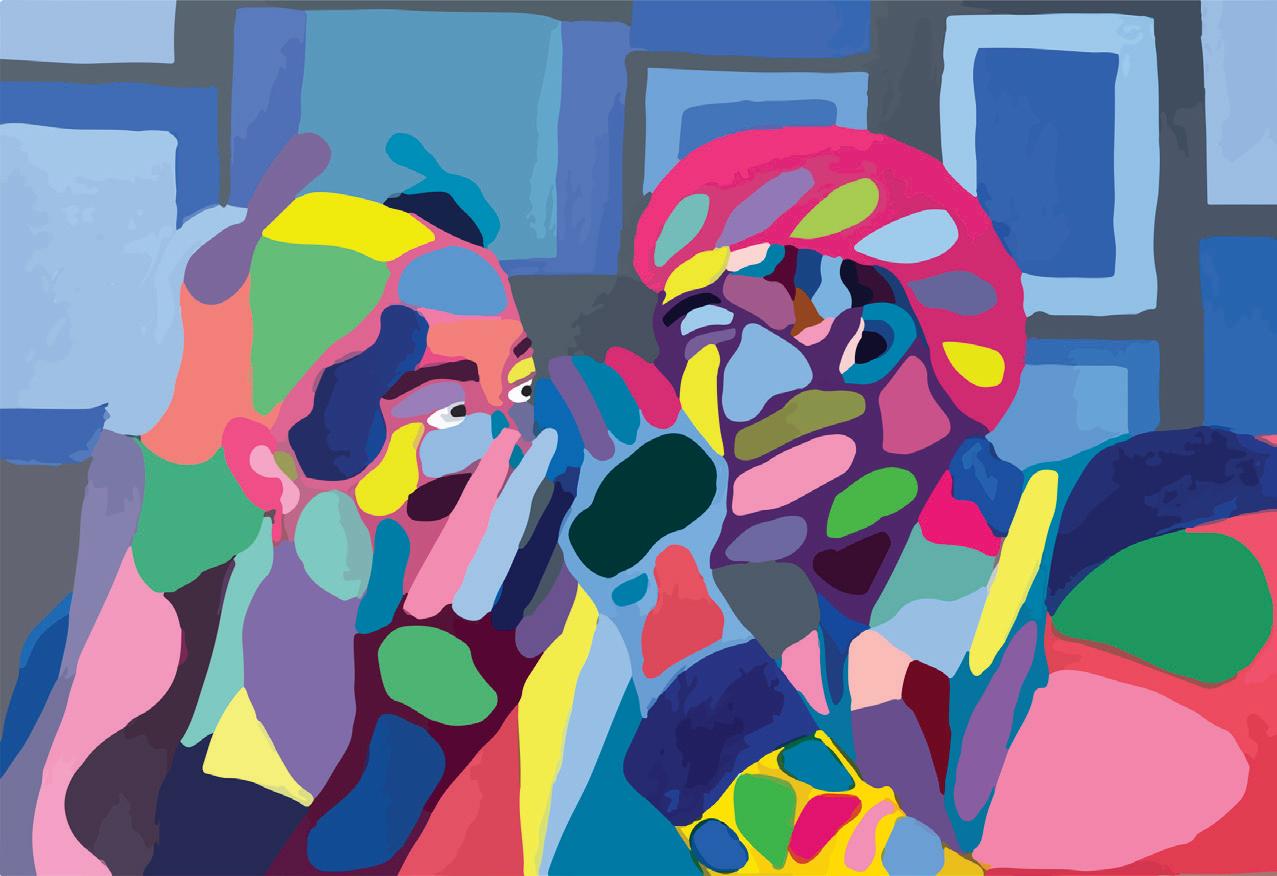
49
Maya Tillman Secrets
Soup
Joyce Huang
I am making you a soup. I really want you to like the soup.
But if you don’t, that’s okay. Just tell me. I’ll make it better, for you.
Because you have to like the soup. And because I don’t know what I’ll do if you don’t like the soup.
So, I gather my ingredients. The ones I planted and watered and grew and nurtured them myself, for you and for your soup. Your soup, which I am making, so maybe it’s actually my soup.
Maybe, possibly, it’s our soup…?
Anyway. I use cutting boards and ladles and pots and bowls. I twist the knob, turning on the gas on my stove, remembering some saying about boiling a frog.
This soup will taste nothing like frogs.
Unless you like the taste of frogs? I could find a frog to boil.
I will pour everything I have into this soup. Our soup. Of course, you can drink as much as you want (Have your soup and drink it, too?).
But I think it’d be nice, maybe, possibly, if we shared the (our?) soup.
So, I have my sharpened knife in hand and I am shakily slicing an onion for your soup. I am looking for the core of the onion because I’m pretty sure soups aren’t supposed to have those.
It’s probably the onions making my eyes water.
50
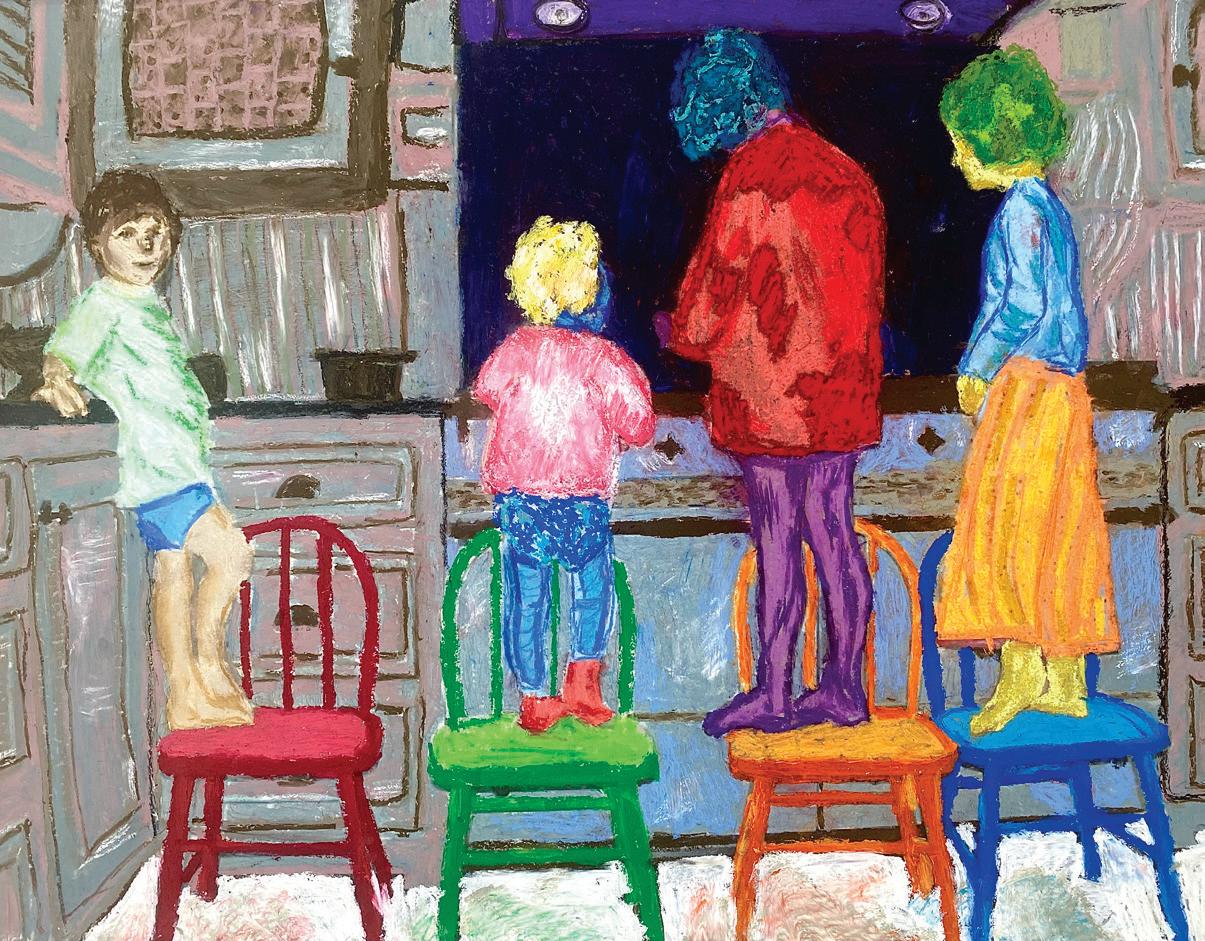
51
Summit Mock In Focus; At Play
The Decision
Grace Galvin
It’s here.
I can open it. I’ll finally know, I’ll know what the next four years hold. It’s either here or elsewhere… but I really hope it’s here. This is my number one. Oh no.
What if they say no? Do I open it now?
I’m at the library.
That’s not a very good place to open a very important letter. What if there’s loud cheering? Or worse, crying?
I’ll go home.
What music does someone listen to when they can’t stop thinking? None maybe. I need to stop thinking and focus on driving. Look, that car has my college sticker. My college? I can’t say that yet–STOP!
It’s a red light. That was close. I really need to stop thinking.
That was the most silent drive ever. Should I open it with my mom? She’s not home yet. More waiting? No way.
I can’t keep thinking. I need to know now. So I’ll open it. Why are my hands shaking? I can’t remember my password. Now I need to change it— WAIT!
I remember.
52
Okay, I’m in the portal. Look, it says the portal was updated. Okay, I’m clicking it now… Any second… I haven’t clicked it yet. I’m gonna take a video to send to my mom. Because if it’s good news I want her to see it. If it’s not, I’ll just delete it. Let me grab the tissues, too. Just in case.
Okay, I’m ready to click it. I’ll finally know. No more uncertainty. Here’s to the next four years of my life. Ready?
Not really.
Whatever.
3…
2…
1… Huh. Deferred. Are you kidding me?
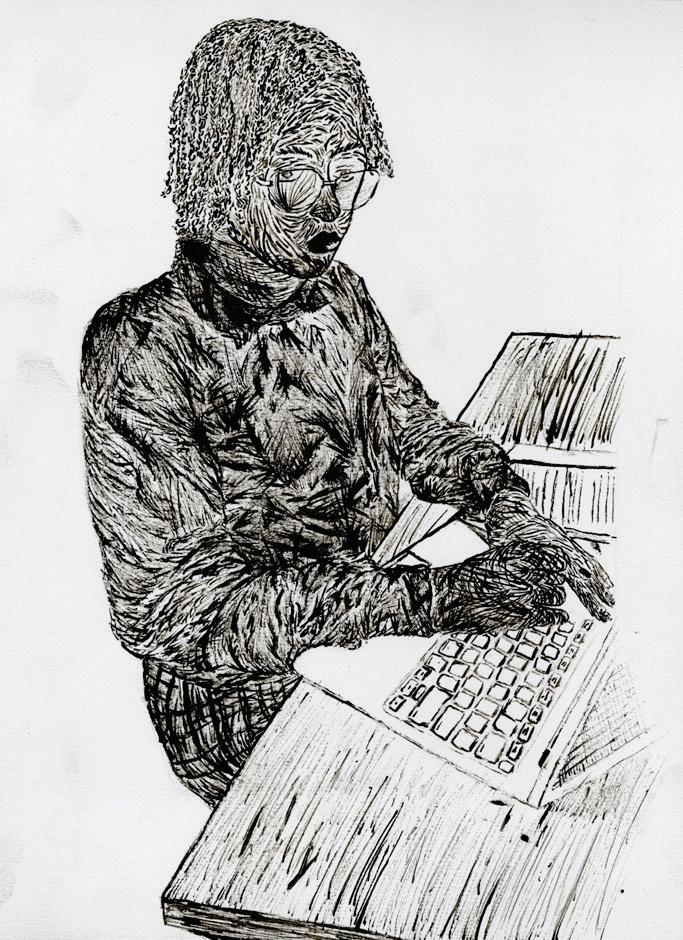 Morgan Clarke Self-Portrait at Work
Morgan Clarke Self-Portrait at Work
53
Happy Kin
A buzzing house overflowing with kin rests on a shady cul-de-sac.
The lawn browns.
The shutters begin to shed.
A subtle draft enters the kitchen each time the back door swings open. Yearly reunions. Surface-level conversations. Uncomfortable hugs. Chronic outward depreciation.
Libby Nook
Aunt Lucinda looks plump, Pop creates uproar, and Ma prays.
Uncle Billy cares for the growing and growling fire while glasses clink, children squeal, shoes shuffle, and laughter echoes, all harmonizing into an original, authentic, and irreplicable blend.
The buzzing house, overflowing with kin, appears to be holly, jolly, merry, and bright. Perhaps the holidays made them forget about their varying conflicts and feuds or they’ve mastered the art of pretending.
So Happy Holidays! Happy New Year! And happy kin?
54
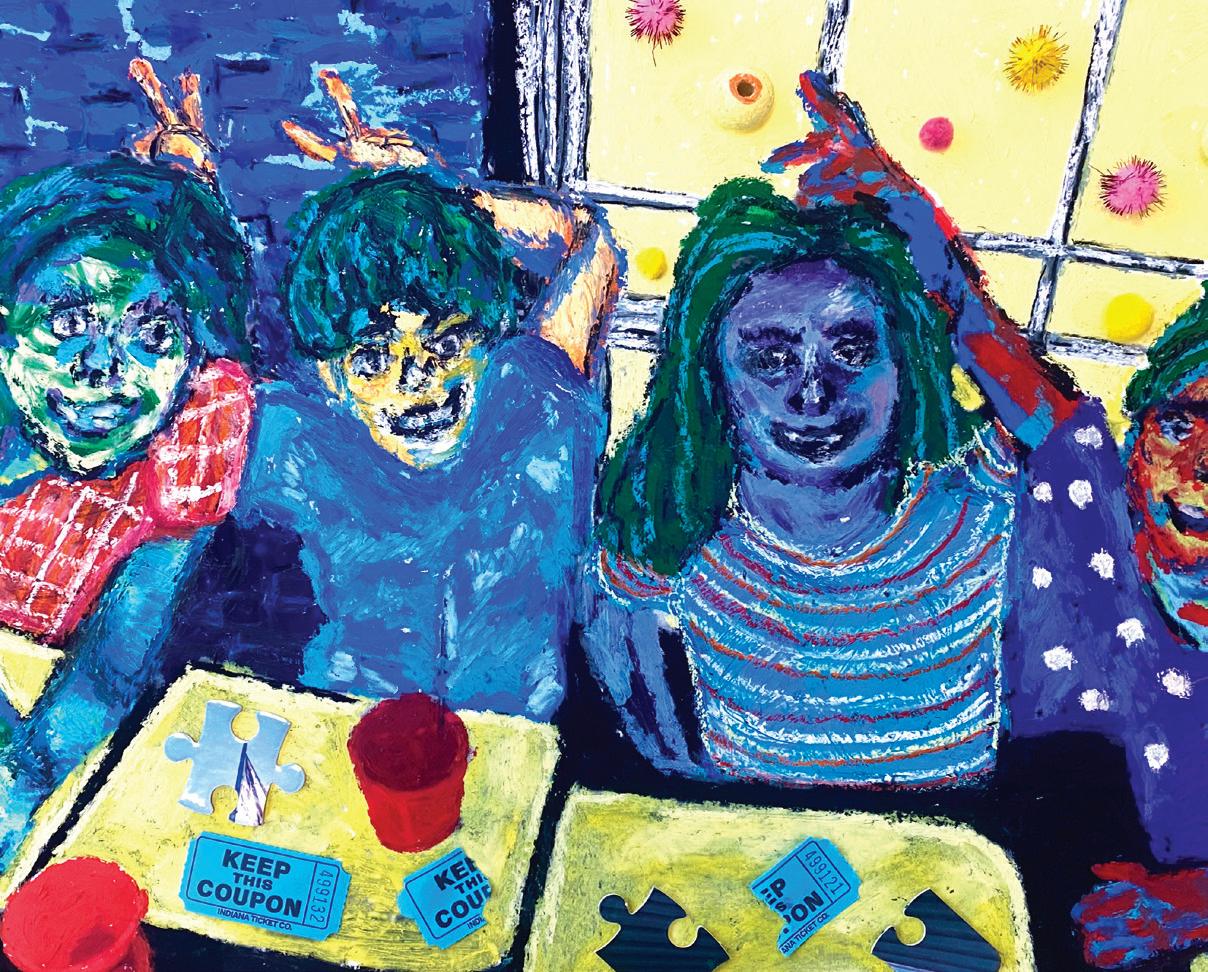
55
Summit Mock Game Night
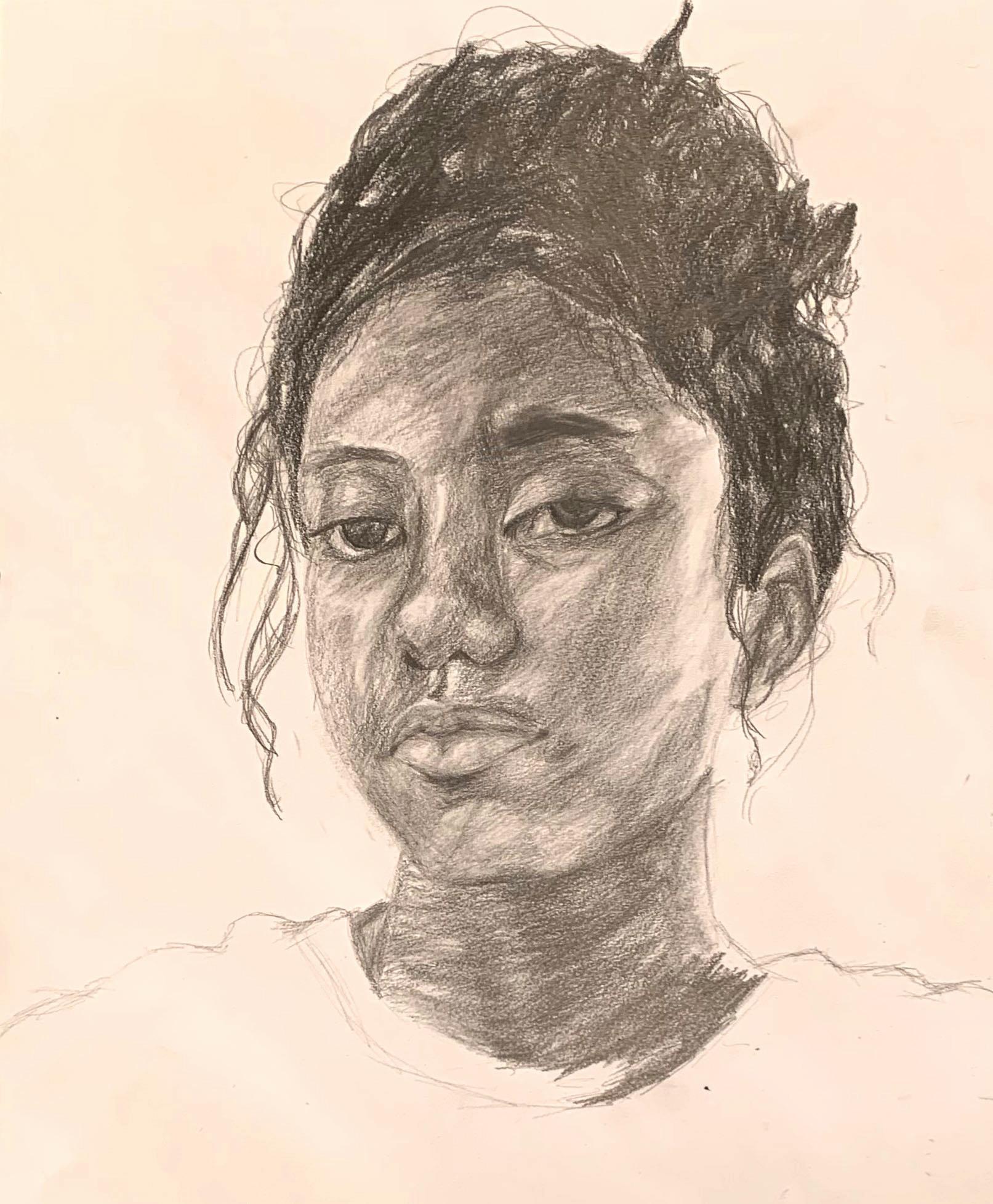
56
Arielle Burrows Self-Portrait
Epilogue
after The Scarlet Letter by Nathaniel Hawthorne Grace Galvin
A throng of uncongenial men stood by the shores of their colony as they awaited the arrival of the large merchant ship a mile out from their quaint town. The ship, a large, burnished vessel traveling the broad pathway of the sea from London, held many new folk ready to begin their new lives in the Utopia they had heard so much about from those that frequented the ships traveling to and from New England. Among the passengers flanking the bow of the craft was a woman, not of old English birth and breeding, but of the colony where the vessel was set to arrive. Her voluminous hair was so glossy the sun was practically reflecting off her curls, though not as much as the sun danced in the jewel stationed on one of the woman’s slender fingers on her left hand. Her journey was taken alone, though she left her beloved and a small elfish child back in England.
When the ship finally tied its heavy lines to the shore, the crowd on the dock parted as voyagers departed the vessel and made their way into the colony. The woman was one within the crowd. Her shoes were sturdy and her dress rather tasteful as she quit the ship and made her way past bearded men and large women. She passed these broad shouldered women and gave them not a time of day when they began to whisper at her passing, though not without a hint of awe.
“She is no plebeian now,” declared a hunched dame of forty as her eyes followed the woman.
“Nay, goodwife,” responded a man nearby, “you utter falsehoods. That woman was never a plebeian. Have ye heard the tale?” The gossips flanked the man as he dove deep into the tale that you, reader, have already endured.
The sun beamed down on the woman’s elegant shoulders as she made her way through the colony, passing a marketplace bursting with townspeople, listening to a sermon, each parishioner hiding iniquity behind their prayers and songs. The woman passed the marketplace without a second glance. She promenaded down a narrow road deemed Prison Lane, where she met a wooden edifice with a door complete with ironwork made of more rust than iron. This gloomy prison gave way to memories the woman hadn’t realized her mind had stowed away. She recalled a dreary prison room hidden away behind the rusted
57
door. Lost in thought, the woman practically trampled over a native rose-bush covered in delicate rubies. The woman paused to admire nature’s beauty. There had been a time when she would have constructed a crown with these gems, but that time had long since passed. The roses were amenable, breaking easily from their bush as the woman delicately pulled three roses away from their home. With the roses in hand, the woman continued down Prison Lane past King’s Chapel and drew nigh to the end of the path.
The woman continued on despite the end of the road, voyaging into the cemetery, a large plot of what had once been virgin soil upturned to be a place of rest for the departed. The woman walked among the rows complete with slabs of slates marking the resting place for paternity and their wives. The woman, who bent to examine each plaque, knew where to go to find what she sought, but the woman did so at her leisure.
An old and sunken grave was revealed to the woman as she rounded the tombstone on the end of the last row. Beside the elder grave was a simple patch of virgin soil, but on the other side of that soil there lay another grave, with fresh dirt atop it, signifying the recent death of a plebeian. The woman knew that grave to not belong to a plebeian, but rather a fiery and beautiful woman who bore a scarlet letter on her bosom for much of her life. The tombstone, a simple slab of slate carved with armorial bearings, marked not only the beloved woman in the fresh grave but also the dweller of the deep-set one separated by the sliver of land waiting for another to come. The woman gingerly placed a rose atop the grave of her mother and a second atop the grave of her father. She bestowed a gentle kiss upon her ringed finger and touched the tombstone. The woman turned and left the graves to their own company.
With one rose still set in her hand, the woman crossed the burial ground to the opposite side where she knew another to lie. The woman reached the grave, practically as sunken as one of the former graves, and brushed dirt off of the tombstone to reveal a name etched into the slab. The woman placed the final red gem beside the gravemarker. She caressed the name inscribed in the stone, the name of a man she knew little during his lifetime but befriended past his death. Seeming rather plaintive, the woman stood and departed from the cemetery. The woman shivered as a gust of wind ruffled her shiny hair. That same gust of wind blew dirt over the final gravestone, covering the name once more: Roger Chillingworth.
58
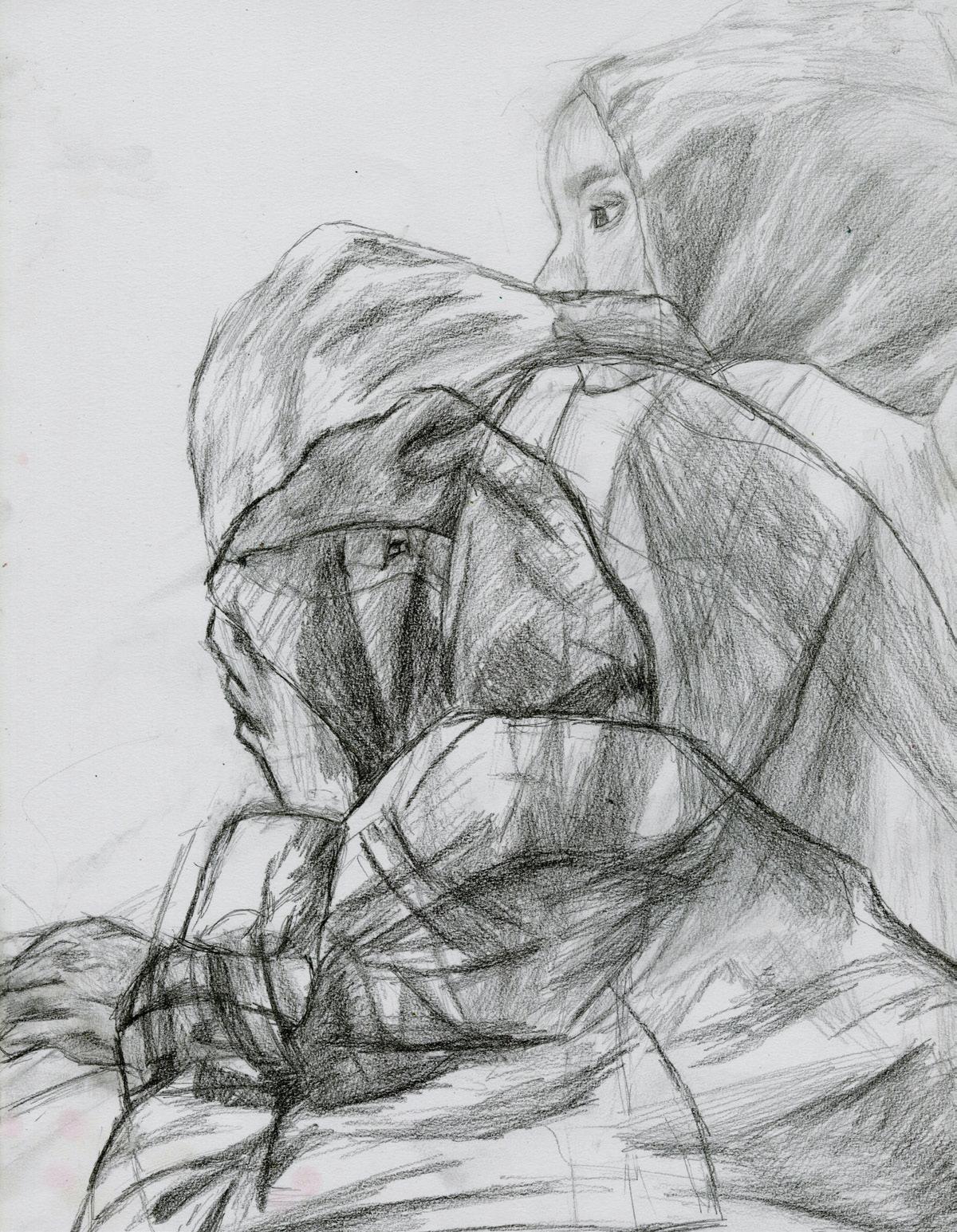
59
Arielle Burrows Anxiety
Shall I Compare You to a Banana?
Shall I compare you to a banana?
You are far more lovely and less yellow: Rough winds of time don’t ripen our fauna, And child labor you will never know;
Sometimes the arms of el pulpo extend, And form abscesses in militant minds; And silent condors coordinate, pretend, By coups they save justice coated with grime;
Gigi Caldero
But you will stay blissfully unaware, Nor hear the cries behind the jaundiced peel; Nor see what massacres paid its airfare, When you laugh as the fruit slips under cartoon heels;
So long as they monetize botany, So long as we yield to commodity.
60

61
Callie Hammond Bouquet
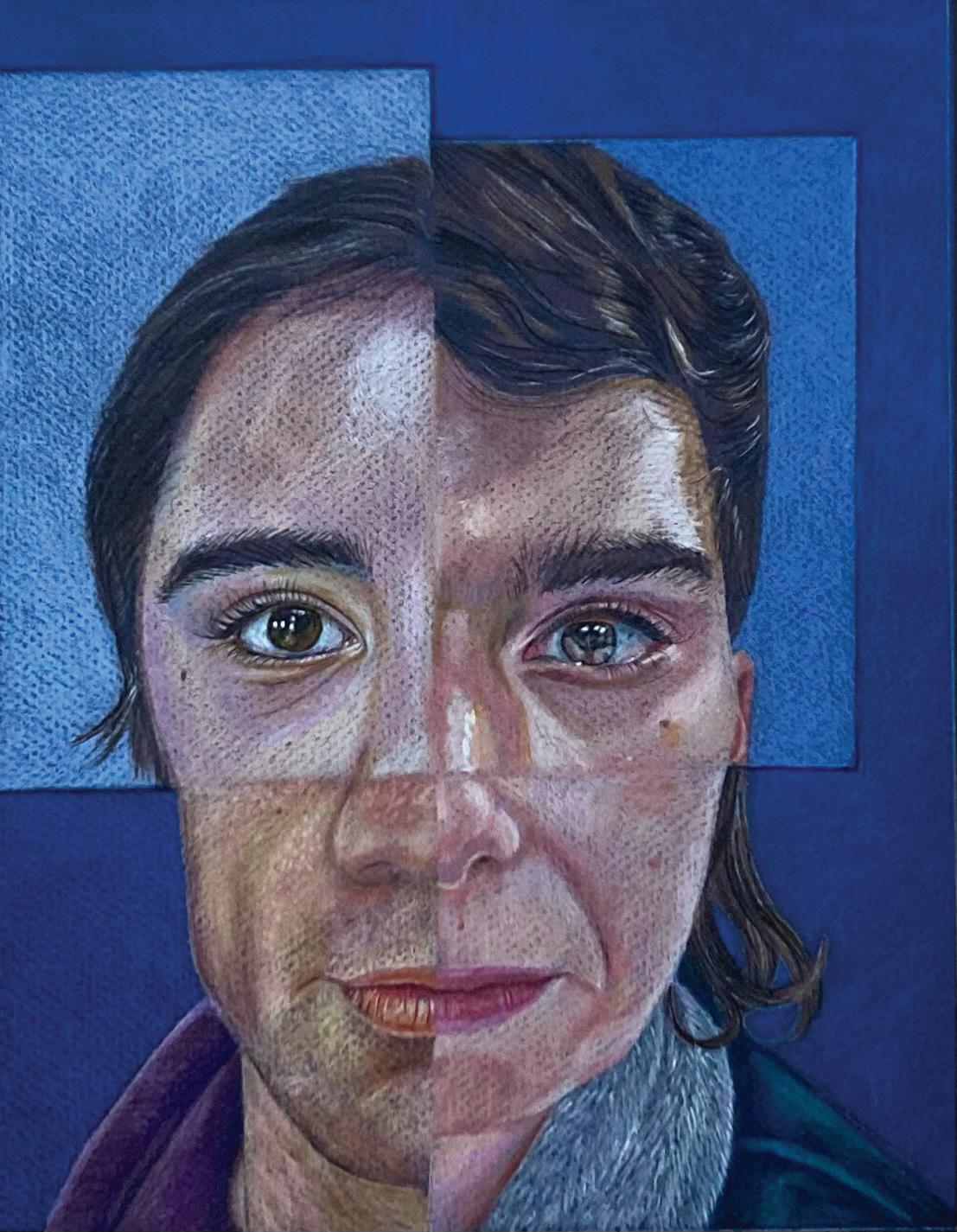
62
Zara Kurbanov Fractured
Labyrinth of the Mind
Alexandra Zummo
You hear an unfamiliar voice. Someone is speaking to you from inside your head. They’re telling you to wake up.
You wake up. Your vision, at first blurry, soon sharpens. You find yourself in a room with one door. The room is empty except for a weapon, a shield, and a flask labeled “antidote.” The voice inside your head tells you to choose one. Do you choose to fight, protect, or heal? Remember your choice for later.
You begin to hear footsteps.
To continue reading this interactive story…
1. Scan the QR code.
2. The story will automatically begin after a few seconds. It will appear in the right gray box (computer) or in the middle of the screen (mobile).
3. Click on the gray box underneath the words “Powered by Trinket” to be able to interact with the story.
4. When you come across a choice, type in one of the letters you are prompted with. For example, if prompted with “fight(f),” type only the letter “f.”
5. If the game is not working in any way (not letting you type, freezing, etc.), reload the page.
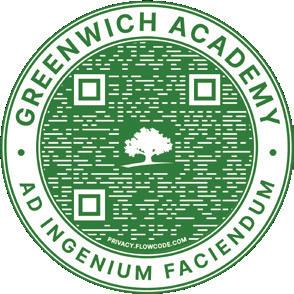
63
MORTALS AND IMMORTALS

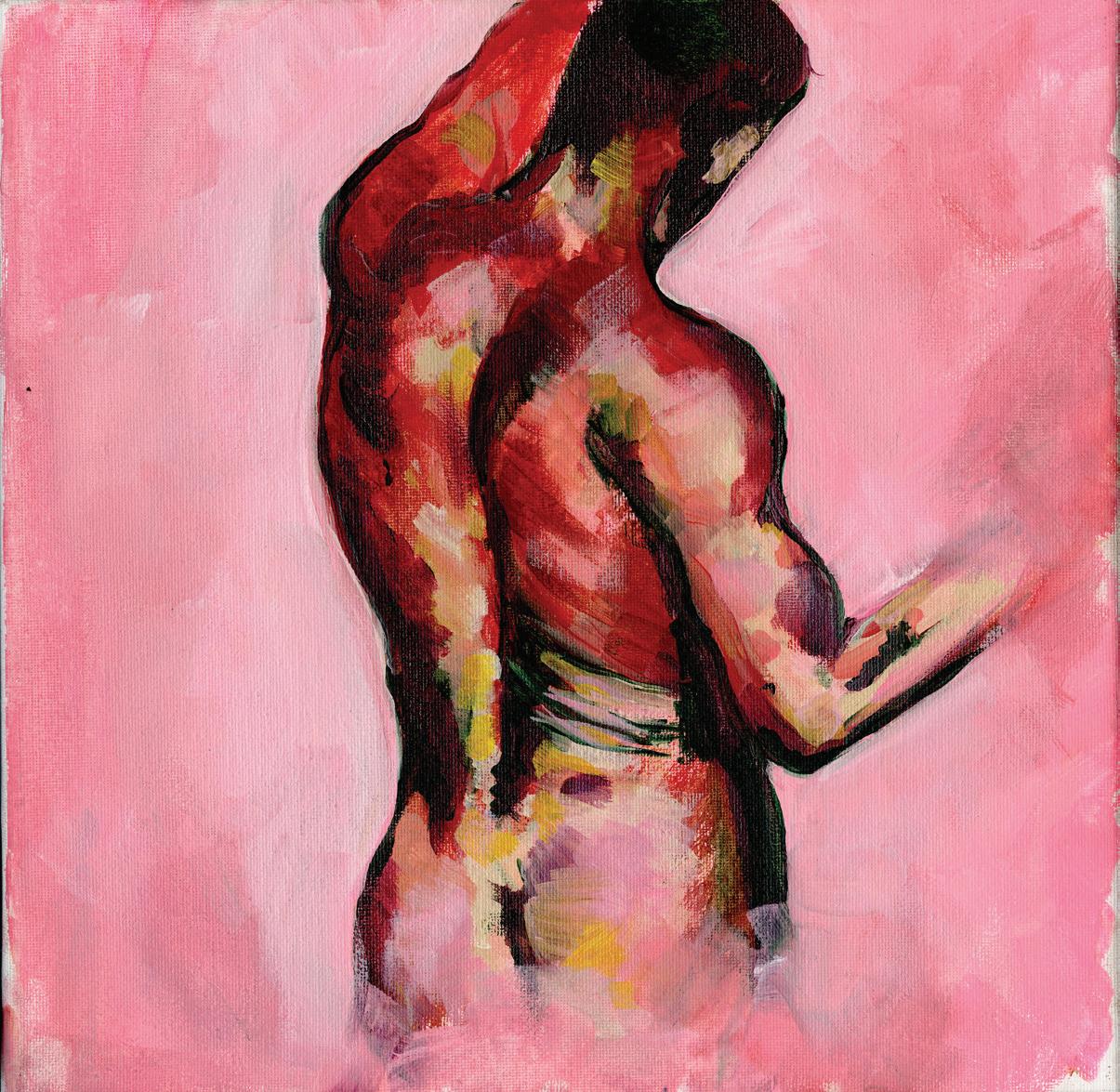
66
Ainsley McKee The Dancer
The Keepers of Men
Gianna DeBono
I
Before a young messenger towers a large bench of black oak at which are seated three councilmen. These are the keepers of mankind.
The boy observes as the youngest rubs his hands together, turning them raw as the heat rises and the seconds fall away. The oldest, a man appearing to be of 70 years, sits on the right of the bench, and is struggling to maintain his severe posture. A bead of sweat falls down his chin, and the boy wishes it were a tear. The middle man has not inhaled in three minutes. He clears his throat and leans forward.
“You are dismissed, sir.” His contemptuous tone weighs heavy on the child’s spine, pushing him into a shallow bow in preparation to depart. The boy notices the man’s golden cufflinks gleaming violently under beams of dusk light like burnt embers. In the moment of hesitation which this observation allows, the expression of the youngest councilman has become wrought with grief. Suddenly, he is standing and waving his hands frantically in the air.
“You cowards! How can we dismiss this boy? What would possess him to invent such a story if it were not the truth?” He slams his fist down onto the wooden bench and startles at the heavy sound that resounds throughout the chamber. His hand trembles noticeably and he reaches to adjust the striped red and blue tie hung loosely around his neck. The oldest man slumps lower in his seat, his sharp features slowly melting from his face.
“You would do well to control yourself, councilman.” The middle man stands abruptly and turns to face the youngest, his posture employing the whole force of his authority.
“This messenger is a liar. He is seeking our attention with no proof other than his own blind faith.” The familiarity of these words soften the blow of the verdict, but routine compels the boy to step forward and recite a practiced line of protest.
“Sir, I have given you my warning. I have spoken of the signs. I am not here to force your hand, but I am obliged to deliver my message, and to warn of the consequences ahead should this message not be heeded.” The boy clasps his hands together in a gesture of finality. His words sink deep into the charged silence
67
before the oldest gentleman stirs from his stupor. He glances at the other two, attempting to remind himself of the dispute at hand, then pushes his chair from under himself before walking around the bench and standing squarely in front of the messenger.
“Young man, you have deluded yourself. The whole notion is preposterous and quite laughable. You cannot possibly expect us to alarm the whole of mankind over the ramblings of a child—”
“I beg your pardon, councilman, but these are hardly the ramblings of a child.” The youngest man has regained his composure and is seated, laying his palms flat on the bench. “There is no conceivable reason to fabricate such atrocities as have been described by this boy. We would do well to consider his words. It is in fact our obligation.” With this last utterance, he turns to face the councilman seated at the center of the bench, who is feigning his consideration of the messenger’s statement. The middle man then takes a breath as if to deliver the final say.
“Councilman, please return to your seat.” He stares pointedly at the older man, who casts his gaze downward and swiftly takes his seat behind the bench. The air has become imbued with an unsettling sense of urgency; however, the youngest man appears to be the only one affected by the grave aura. The light of dusk dims soundlessly, and darkness seeps into the room from the corners of the chamber. The youngest man breaks the silence once more, compelled more by his mounting fear than the pursuit of truth.
“There is no time. We must act now. Councilman…” He addresses the man in the middle of the bench, speaking to his superior in an anguished tone. The figure of the middle man has cast a long shadow across the wall, giving the unnerving appearance of a creature standing behind him and hidden among the shadows. The superior grins, a disturbing expression that drips with malice. He chuckles gently, his laughter slowly growing to an uproar that shakes the room.
“You fool! Exactly how much consideration am I expected to give to illusion? Why should I answer to a false warning that preys on man’s ignorance? No such events as you have spoken of will ever come to pass. Such ideas are merely products of superstition.” His gaze shifts towards the boy, leering at him as if he were the vermin of the earth. “This is how I will respond to you, child: you are not the first of your kind to come before the council with this warning. You are one of many who wish to enslave the minds of men so that they may obey out of fear, but we are the
68
keepers of men. As such, we will not permit such a message to be disseminated. You may inform the rest of your messengers that this council will receive them no more.”
These words echo back one, two, three times, as if the walls were whispering to them. The oldest man has fallen back into his stupor. But it is the sight of the youngest, stripped of his former conviction by the superior’s words, and now bearing a vacant expression of submission, that causes the boy’s heart to contract in a pang of sorrow. The last strings of light float about the edges of the chamber windows as the air cools. The messenger clears his throat.
“Mankind will burn.” The room has become void of light, and dark shapes dance across the walls. “You are the keepers of men, and you will say you did not know. But your eyes have seen, and your ears have heard.” The messenger inhales sharply and steps off of the platform before the bench, looking up to meet the gaze of the councilmen a final time. The youngest glances towards him blankly, a tear rolling down his cheek. The oldest leans back distractedly in his chair, oblivious to the tense atmosphere. And the middle man does not move. His face is etched in stone, his features heavy with abhorrence. He leans forward.
“This council will hear you no more. You are a liar. And you are dismissed.”
II
Millenia pass. The three councilmen sit quietly behind their black bench, receiving no other visitors seeking their council after the departure of the young messenger. At a certain indefinable time, the middle man breaks the silence.
“I am departing for a short while. I will return promptly.” The youngest councilman shakes his head.
“You must not. What if a man arrives in the time that you are absent?”
“We have not seen a man in years. What’s to say something has not happened which we must address?” His concern seems ungenuine, but he straightens the lapels on his jacket as he rises to leave. The oldest pipes in, toying with his tie distractedly.
“No. He is right. You must not leave. Summon the young messenger and ask him if anything has happened to the men.” The standing councilman scowls, but relents. Moments later, the young messenger arrives.
“Child, why have we received no visitors in all this time? What
69
has happened to mankind?”
“You are no longer the keepers of men.” The young boy’s face is draped in an expression of inconceivable despair, and he does not raise his eyes to meet the councilmen.
“Pardon?”
“You are no longer the keepers of men,” he repeats, his words quiet and melancholy.
“That is not possible. Man has always sought our council frequently. How can we no longer be their keepers?” The three councilmen lean forward in anticipation of the messenger’s response.
“Because there are no more men.”
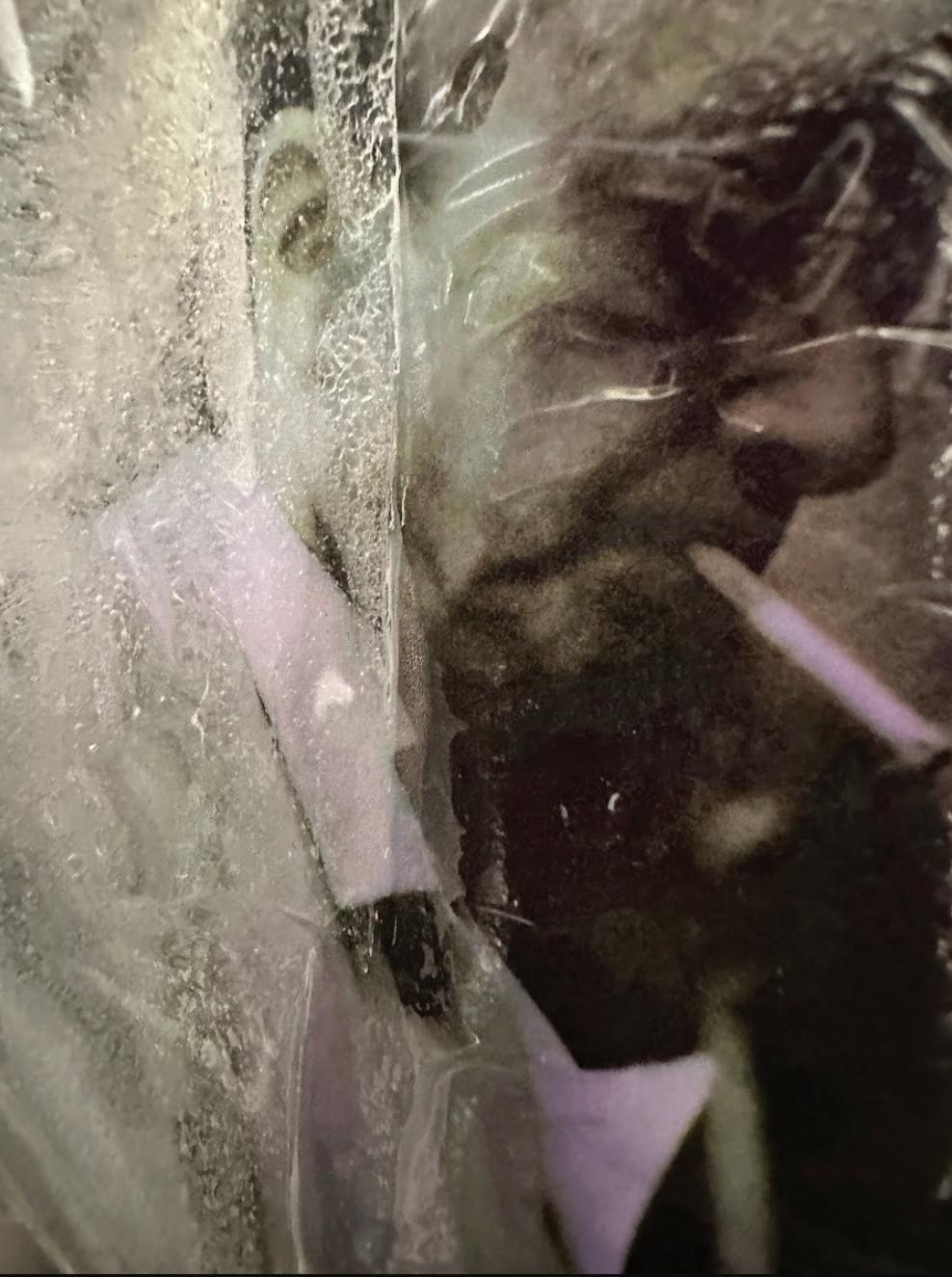
70
Anna Leventon Cancer
 Elena Schmedlen
Elena Schmedlen
71
Mark

72
Aya Rabin “Peace”
Beach
A golden shovel after “The Golden Shovel” by
Terrance Hayes Nina Sennon
Dead bugs drift in the ocean passing by bobbing buoys while women are sunbathing in the sand on brand-new towels. The bar, not too far, has stools much too tall for the person with high-top sneakers reaching for their Shirley Temple. Nothing can forgive the red drops left on their white shirt, but maybe in another world, someone would help them. Just to the left, there’s a shaved ice cart, but they ran out of flavoring, filling it with approachlessness. The mysterious vendor was just happy he made enough money this week. Returning home is always the best part of his day. A reminder that they don’t teach hard work in school.
73
Underbelly
Grace Sullivan
The stretch of mowed grass extended far until it blended with mossy rocks and old trees that had stood there long before the brambly land was tamed. Lovie used to play between the woods and the lawn, in that particularly prickly intersection, planted with crape myrtles and potentilla shrubs. Flower petals wilted on the mulch, which emitted a honey-damp odor. To the eye, the spot looked relatively maintained, but Lovie knew not to tread near the fringes of the yard without shoes, else burrs and crushed beetles would stain her feet.
The Francesco family lived in a magnificent house at the end of a long, manicured road. Mrs. Francesco was raised in a house only two blocks over, and Mr. Francesco grew up in an equally wealthy town a couple of counties away. The Francescos had five children, but the first two, the twins, were off in college on sports recruitments. Kip was the third child and his parent’s favorite. Lovie was the fourth child, and she looked identical to her younger sister, Winnie. Winnie and Lovie were not different in any fundamental way, and their mother would gussy them up in matching hair ribbons that always fell loose.
There was a thrash against the window. The panes shook and rattled. Kip stared at the curtains for a moment, but they hung flat and dead. He thought to himself that he should probably go get his mother or his father, but he did not particularly want to move. He just stood there, solid as ice, as he stared at the curtains. He wasn’t scared, just confused. He slowly moved an arm toward the curtain and tugged it to the side. A shaft of sunlight stretched through the gap, illuminating the speckles of dust in the air. Kip looked through the window.
“Kip, what’s this now?” His father had silently walked into the room. Kip’s trance was broken and he shook his head and closed his eyes for a second.
“I don’t know. Something just knocked on the window, but I don’t see anything outside,” he said. His father walked up behind him and pulled the curtains wider. He looked skeptically over the yard. A small bird lay in the grass. He narrowed his eyes and shut the curtain. He quickly turned toward his son.
“What do you say you help me with the hog?” His father said this with such a confident urgency that Kip couldn’t help but nod
74
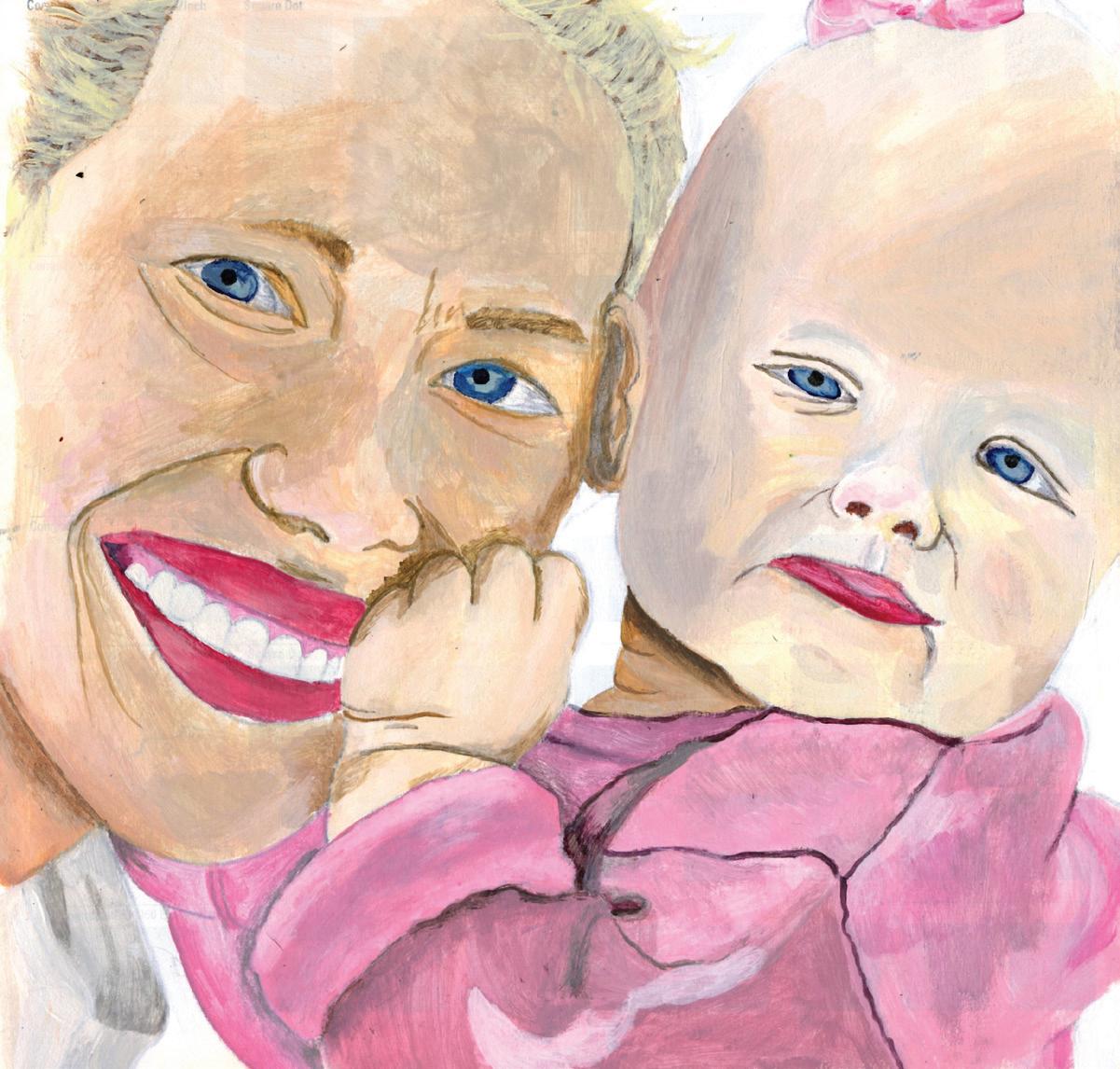
75
Anniston Mahaffy Mother and Child
his head and stare blankly up at him.
Every year, little Winnie celebrates her birthday party at the country club—but not this year. This year, they would have a party in their backyard, a barbecue, to roast a fat pig on a skewer. Most days, Winnie and Lovie wore matching dresses, but today, Winnie wore her Birthday Dress. Her mother had chosen a powder pink gown a couple of months ago, just for this occasion.
Preparations for the party were extensive: ice sculptures, catering, and, of course, the hog. Mr. Francesco insisted on prepping the pig himself, carving it up with his new butcher knife. Kip walked into the kitchen and saw his mother in an apron. He raised an eyebrow. She smiled at him nervously.
“I know I’m not much of a cook, but the dessert caterers bailed, so I thought I’d whip up some cookies.” She looked up at the ceiling as she spoke, trying to seem casual. Kip nodded his head and walked toward the backdoor. He was startled when he heard shouting. Two grunting men appeared, shuffling over the lawn as they hauled a gigantic ice sculpture of a dolphin between them. His mother rushed out behind him. She gasped.
“Oh no, no, no! This can’t be happening!” She sounded tired. Then she sounded angry. “You were supposed to come at 5:15. What do you think you’re doing here?” The men stared at her blankly. Then, one of them stepped forward.
“The order said 3:30. We are on time. If you have a problem, speak to our manager.”
“Oh, don’t you worry, I will. My husband will agree with me,” Mrs. Francesco said. She then let out a sigh and brought her hand to her forehead as if she were ill. She shook her head, whimpering, as she sympathized with herself. Kip watched as his mother turned on her heel back toward the kitchen. He wandered down the yard to go play.
Deep in the shrubs, Lovie heard a twig snap. Her head whipped over her shoulder, her body frozen. The bushes shook. Lovie pounced; she shot through the underbrush like a viper lunging for a rat. Her fists closed firmly around a toad. Lovie grinned, her body vibrated with excitement. She squeezed the toad; she couldn’t control herself. Her hands felt wet as its urine dripped over her wrists.
“Lovie, let go!” Kip jumped for her, grabbing for her arms. Lovie dropped her victim, startled. She looked up at Kip, eyes wide.
“I didn’t mean to.” Her voice was small.
76
“Just go back to the house and have Louise find you a new dress. Don’t let mom see you,” Kip said. Lovie burst into tears, wailing like she was dying. She began to walk slowly back to the house. Kip looked down at the poor toad. Its mouth was slightly agape, its entrails bulged between thin lips. Kip dug a small hole and placed the body inside.
“Kip, son, help me with this!” Kip’s father stood near the firepit with a greased skewer. Kip gasped. He couldn’t bring himself to walk over. He thought of the toad, who would forever lie in the mulch. He wanted to wipe his eyes so his father wouldn’t see him like this, but his hands still felt slimy from the toad.
In the kitchen, Mrs. Francesco continued baking the cookies. Lovie sat by the counter.
“Are the twins gonna come to my party, Mommy?” Winnie asked, carefully. Her mother sighed.
“The twins, sweetie, they’ll be around.” She measured a cup of sugar and dumped it into her baking bowl. She muttered, “The amount of sugar in these is just ridiculous.”
“So they’re coming?” Winnie asked in a small voice. Her mother put her measuring cup down and raised her head.
“Honey, you have to stop asking me these questions. You know they love you,” She shook her head and slammed the lid of the sugar jar shut.
It was time for Winnie to put on her perfect dress. Winnie pulled her hair to the side as Louise zipped up the back of her pink dress. Winnie shuffled her feet nervously.
“Ah, just gorgeous!” Louise said warmly. Winnie smiled bashfully; she loved Louise. Suddenly, Lovie appeared in the doorway, chest heaving with sobs. A thin sheen of sweat covered her forehead, and her dress was covered in grime. “Oh, what is wrong?” Louise rushed over and hugged Lovie until her sobbing subsided.
Over in the yard, Kip watched as Mr. Francesco gazed down at his pig, successfully impaled over the glowing spit. He liked to think that this is what he did to take care of his family, using his hands and his knife. He liked to think that it wasn’t his job at the hedge fund. Kip shuffled on his feet, looking expectantly at his father.
“Is it time for my gift?” Kip asked eagerly. He had been waiting for this. Kip and Lovie would each receive a present before Winnie’s birthday party so that they wouldn’t feel left out.
“Not yet, son, just get a good look at this here pork we have.
77
What fine pork.” The pig was so fat that it couldn’t be properly seasoned on the inside. Mr. Francesco had to plunge a wide needle into its sides and inject the creature with a salty solution to ensure tasty pork.
Winnie, Lovie, and Mrs. Francesco each stepped out onto the lawn, each in a beautiful bright dress. Kip realized that Winnie’s pink poofy gown looked absurd as she stood on the grassy lawn by a skewered hog. Lovie still had grime beneath her fingernails, and she was barefoot. His mother had a spray of cocoa powder on her neck and sweat on her brow.
Water dripped off the ice sculpture like blood racing down invisible veins. A spindly, veiny fissure ran precariously through the glass of the window. The pig looked gray and drained, and strangled veins bulged around its eyes and lips. An intense vein pulsed in his father’s neck, who gazed down in adoration at the hog. Delicate, bloodshot vessels rimmed his mother’s eyes from the smoke of the oven. Below the dirt, the toad’s veins were pressed and draining into the soil.
Kip looked at his sisters, his mother, and his father, each with a feral expression of anticipation tracing their lips. He realized that they were all unhinged in the most sociable way possible. They were so hungry, each one of them. The neighbors were arriving soon, they had skipped lunch, they were eager to clean the bones. He understood that it had to be this way. The Francescos were oversaturated with society and civility, which could only be balanced by a barbaric underbelly. No matter how logical and proper they acted, they could never transcend the vessels pulsing their chests and guts.
Kip glanced at the cracked window. Neighbors began to shuffle into the yard with loud hellos and more bright dresses. Would they notice the cracked glass? Kip understood that the only difference between himself and his neighborhood was that he saw how barbarism was essential for propriety to survive. Kip closed his eyes, surrounded by his loved ones. His father reached his arm up to wave hello to their guests, but he didn’t let go of his cleaver. Back and forth, the greased metal glinted in the air. Behind the crape myrtles and potentilla bushes, the dark woods quietly gazed at the family, waiting with eternal patience.
78
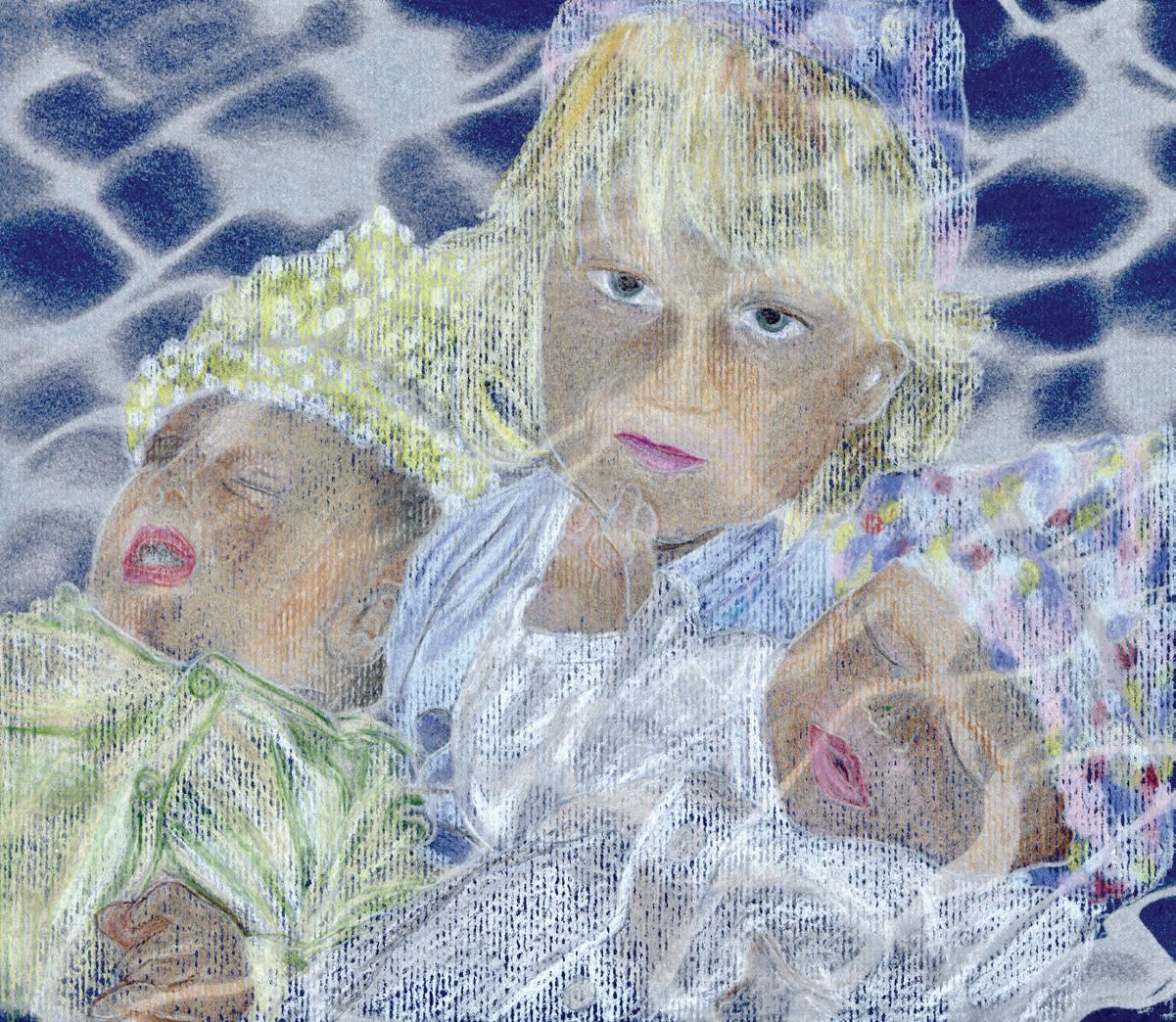
79
Anniston Mahaffy Cousins
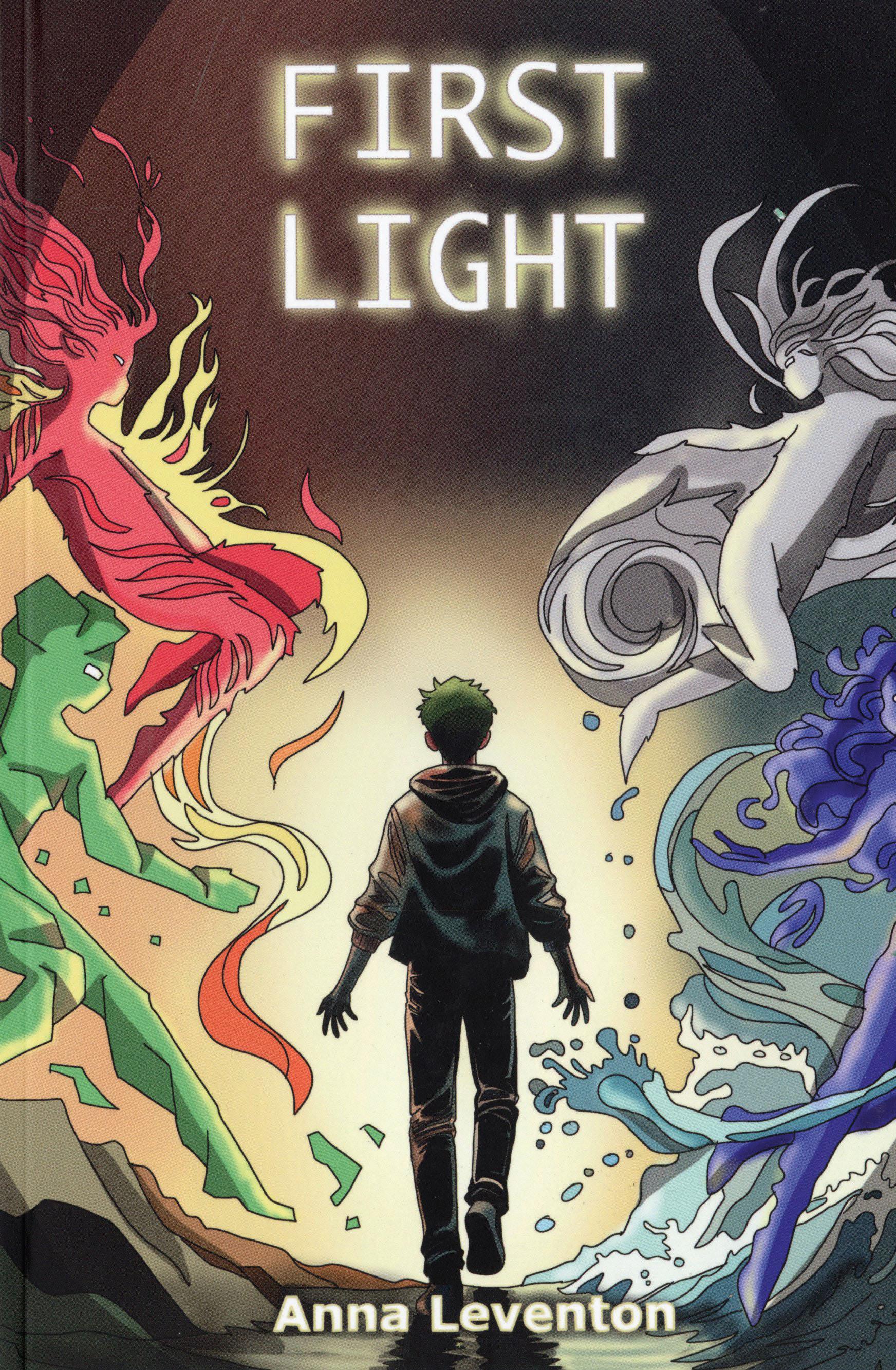
80
Anna Leventon First Light
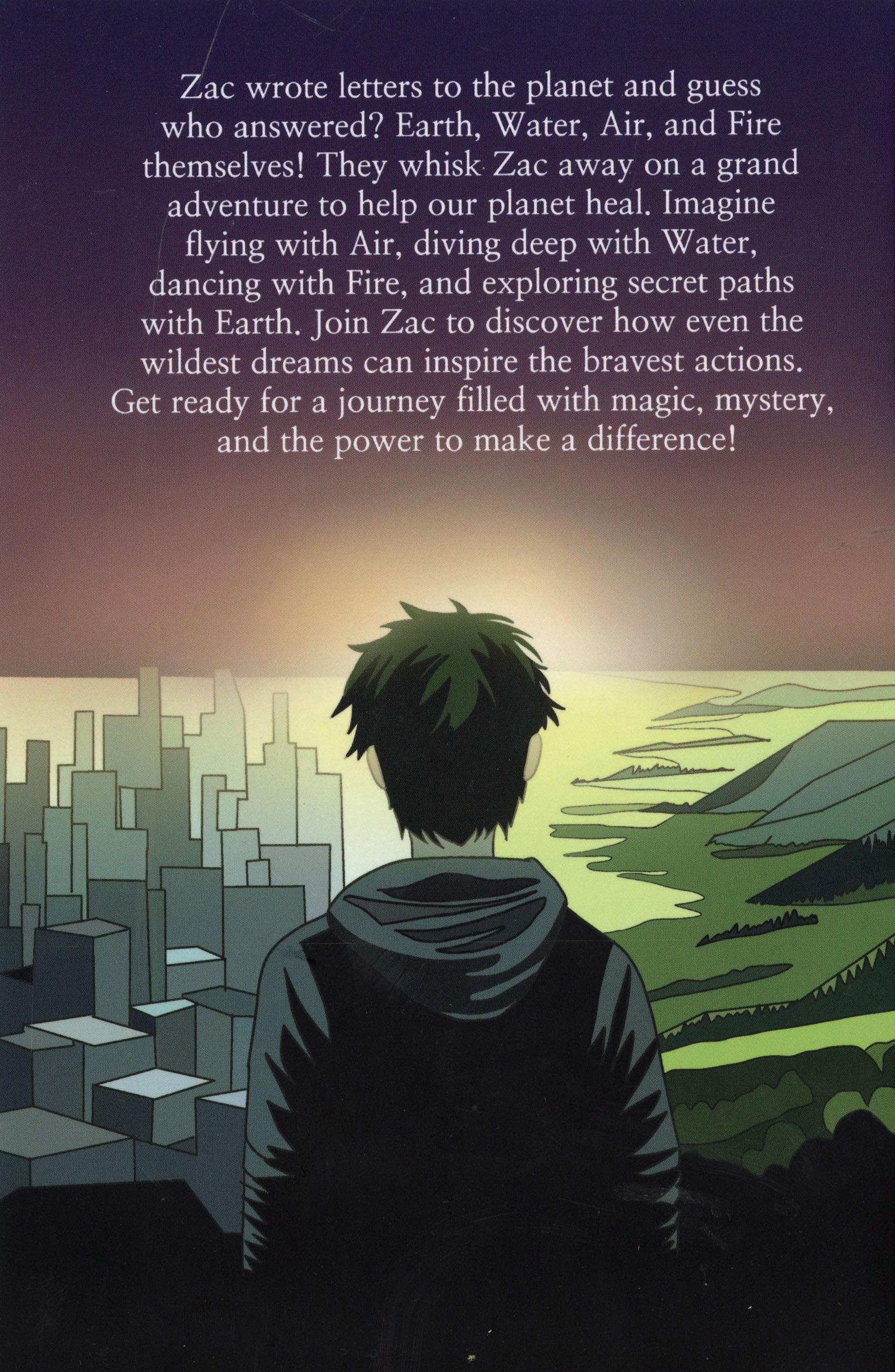
Scan to read entire graphic novel.
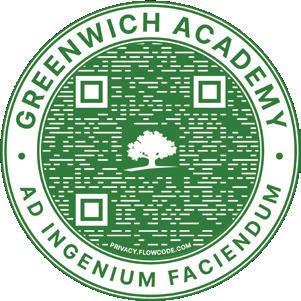
81
How to Write A Story
Emma Jones
Easier said than done. You have been assigned a two-to-fourpage short story and you, young fool, have put off writing it until the day before it is due. Is that the sunset already? You realize you are in for a treacherous night. So settle in, make yourself a cup of tea, put on blue light glasses, and find a warm blanket and a knit sweater. You feel that the environment is key to story-writing of any kind. You need to tap into the writer inside of you, and to you, nothing encapsulates the author aesthetic more than warm lights and cozy knitwear. It would be ideal if you were cuddled up in a woodside cabin with snow falling gently into the boughs of elm trees. However, Mother Nature’s secretary said she would get back to you within five to ten business days regarding your inquiry on whether she could make it snow for the next hour, but you only have one business day for this project. Alas, there is only so much you can do.
The preparation of your workspace has taken a full 15 minutes, but as you settle down, you feel driven and confident in your skills as a writer… for about two minutes. As soon as you have made the document on which you will write the next great work of English literature, you feel the gravitational pull of your most prized possession: that gray shiny box. Desperately, you remind yourself, resist the temptation. Technological enjoyment is quick to fade and is not worth a poor grade in English. You are briefly reminded of a tractor beam in Star Wars when the Star Destroyers pull in the little Resistance X-wings.
“Come to me, my child.” Your phone seems to be sending electrical signals directly to your neurons. You feel your body begin to lean toward the place where that demonic little timestealer rests. “Who, me?” your phone seems to say as it lies there innocently, but you have read enough dystopian novels to know that this machine is far from harmless.
No, no! Technology may have the power to take over the world, but it will never corrupt me! As determined as you are to stay focused, you feel your arm extend and the pads of your fingers make contact with the edges of your rubber phone case. Ah, what a shame, you have lost this battle of self-control. Your fingers are mindlessly scrolling through the feed. What does this say about your morals and values? Has everything gone out the
82
 Denise Seol
Denise Seol
83
Self-Portrait with Rembrandt
window now? How much time has passed? A minute, an hour? Resist, resist! At last, you somehow bring yourself to power down that inconspicuous dictator. You place it in the kitchen and seat yourself in the next room, far, far from the rays of its tractor beam. Now, you are most definitely ready to begin. But now you have run into an even greater problem: how do you start a story? Do you begin by outlining the characters, the setting, or the plot? Or do you just make it up organically? You hate pesticides, so you go the “pure” route. You power down your brain, region
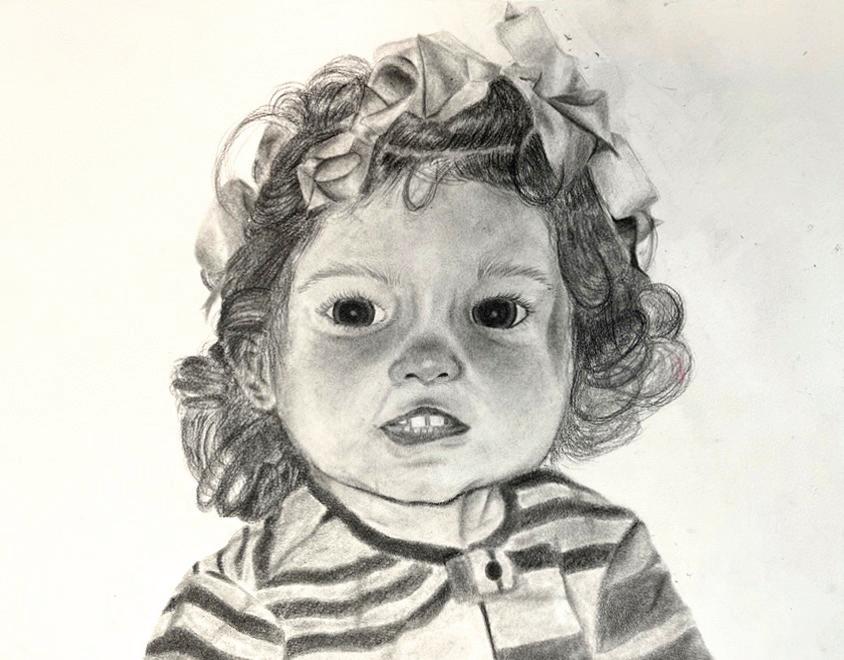
by region, leaving only the most necessary part, the brain stem, switched on (staying alive is arguably the most important part of writing). Your idea is to let your fingers type mindlessly and hope for an interesting story to bloom. This method lands you with a tale of an old retired music teacher named Alabaster Cook who lives in a pre-war apartment building on the West Side of New York. His living room windows look out on an echoey alley. Each night, he flings the windows open and serenades his neighbors. He sends them messages in his songs based on what he thinks they need to hear as he observes their lives (in a non-creepy way)
Ava VanMoorsel
84
Self-Portrait as a Young Child
during his piano practice at night. You love the character you have built: the kind of old man who, should you see him eating alone at a diner, would bring you to tears. As much as you hate to admit it, though, there really is no plot in Alabaster’s story, which you realize is ironically true to his character traits.
So you move on, tickled by your next idea, which is inspired by the great Celeste’s song “Strange.” One line, in particular, has gone viral on TikTok (which you swore off 30 minutes ago):
Isn’t it strange
How people can change
From strangers to friends
Friends into lovers
And strangers again?
This line enchants you, so you write the story of a young couple who meet at a dinner party and begin a whirlwind romance: truly one for the ages. Soon, however, they are driven apart by some terrible argument, although you can’t quite decide the root of their disagreement yet. So instead, you send your regards to an imaginary Celeste and make a mental note to check out more of her music in the future as you close the tab and begin a fresh document.
You are intrigued by this new game of coming up with stories, writing up to their climaxes, and then discarding them without a second thought. That said, you are painfully aware of the clock, which calmly and cruelly refuses to slow down. Isn’t time itself a social construct? You Google this, and twenty minutes later, find you are in one Bermuda Triangle of a rabbit hole on Reddit (but yes, user1836320, I do agree that coolness is a construct). You drag yourself back to your writing. You decide to read this year’s edition of Daedalus to see if you can find inspiration in the works of your classmates. You skim through most of the book, landing on a short story. This senior wrote about a nameless writer in a cafe, who observes the people sitting nearby to find inspiration for new characters. You like how this writer is genderless, nameless, and technically speciesless. You begin your own spin on this story. A very judgmental (and frankly unlikeable) narrator sits in an airport waiting area and silently watches everyone and everything, making sure to blend in as much as possible with the surroundings. The narrator criticizes a rowdy group of Ibiza-bound college girls, begrudgingly admits admiration for
85
a serious-looking Australian businesswoman, who “can only be described as clean and smooth,” and wonders about the origins of a man named Bill. You wonder if Bill is his real name or if it is short for William or if he is Greek and his real name is Vasilis, but he simplified it for his English-speaking colleagues. You decide that only in the end will the narrator’s identity come to the fore, as they ask the reader, “But who am I? Or rather, what am I? Am I dead or alive? Am I even able to be alive? In other words, am I inanimate?” As much as this narrator provoked your imagination, something about this story felt self-righteous, so it too was cast away.
Feeling desperate, you re-read all your old drafts, but none of them seem good enough, as all your past grievances resurface with each piece. You begin to romanticize your struggles with this final ninth-grade English assignment. You stew in self-pity. At the mention of stew, realizing how hungry you are. But no, there is no time for breaks! Ah, how society fails to represent the struggles of the aspiring writer! Scores of amateur artists and actors earn the sympathy of the public, and we writers are left to make our own ways! It is at this moment you realize you consider yourself a writer. You wonder how you got to the point of considering yourself a member of one of the most respected and prestigious classes of people in society. You must, therefore, have a story to tell. But oh! Here is an idea at last. You open a new document and say a quick prayer. You make sure to thank all the discarded characters and failed plots that got you to this moment and place your cursor in the Document Title box to create a title. You start writing, humming along with the click clack of your keyboard and taking a deep breath as you begin to tell your story.
86
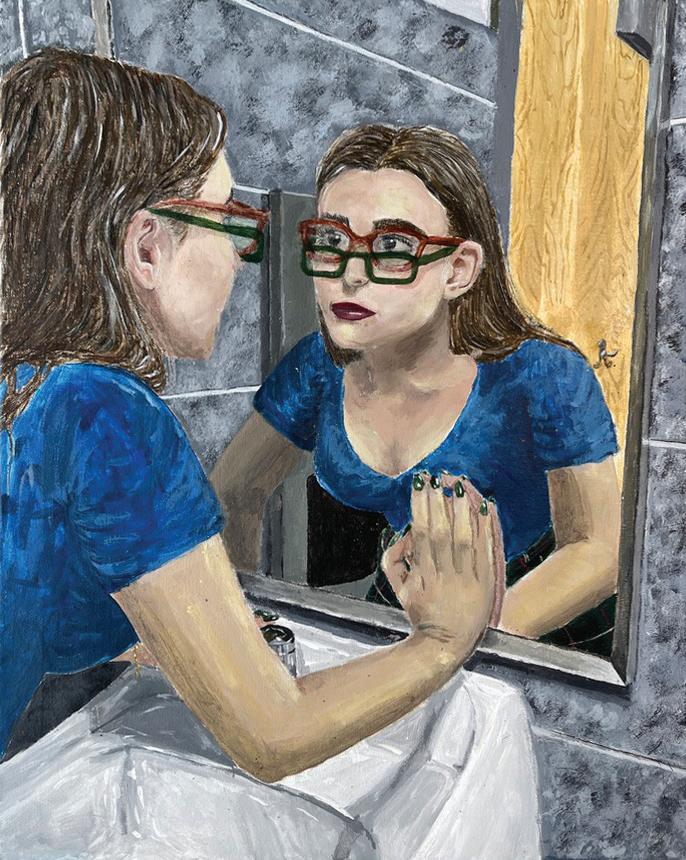
87
Lily Novitsky Twisted Reflection
Lights Out
Maggie Nichols
I was four when she showed me how to scooter down the hill. For years, I had watched her golden blonde hair take flight as she accelerated down the daunting slope beside our house. I was intimidated. I was scared. But it was now my turn to conquer this monstrous obstacle before me. Or so she claimed.
I was seven when she taught me how to smile for my school photo.
Her polka dot bedding sprawled out beneath us as she walked me through facial exercises to make my smile look more natural. These practices were mere products of her creativity and imagination.
I didn’t care. Whatever she said was right.
I was nine when she first called me a quitter. It was the third mile of our bike ride. I felt weak.
But when she said that word, I got back onto the bike with nearly unimaginable speed.
I noticed a grin take form on her face as I sped by. It was then that I understood what her plan had been all along.
I was thirteen when, for the first time in my life, I felt stuck. I had reached my life’s first dilemma, and I didn’t know myself well enough to recognize what was wrong or what I needed to change. I asked the girl across the hall. She knew.
I was sixteen when I closed the door to her dorm room. A few days ago, I watched as two young boys soared down the street on identical Razor scooters. One hit a pebble on the road, falling to the ground.
88
Without tears, he proudly smiled as he watched his younger companion speed away. I thought of her, and in my mind, hundreds of miles away, she was thinking of me too.

89
Ava VanMoorsel Wonder
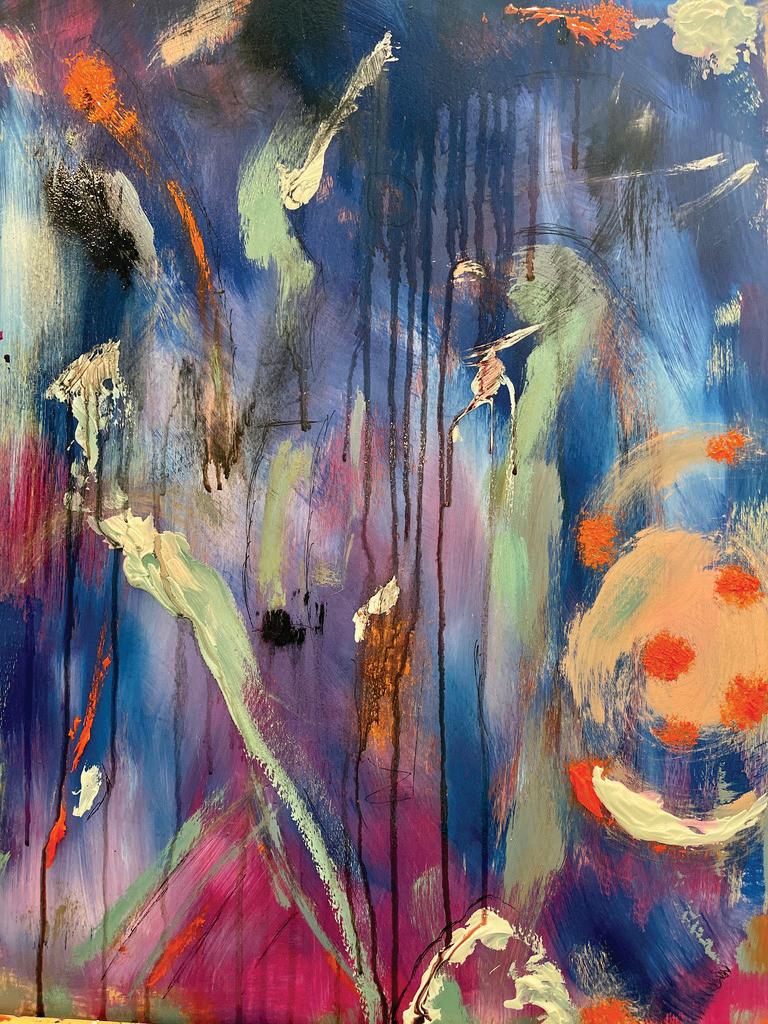 Aya Rabin
Aya Rabin
90
Desire
Lamentation
Gianna DeBono
Under this soft and silver night a mother’s tears fall as a bow upon a violin. Dark shadows dance a silent waltz across the walls, fluttering like gray moths and whispering feverish secrets to her sleeping son. He does not stir, nor does he cast a glance towards the anguished features of the woman in whose arms he limply rests. His mother has laid her blue veil across his body and pulls him firmly to her chest. Littered across the concrete floor are drifting constellations of clear glass, ebbing and flowing in splintered patterns that reverently reflect the child’s ethereal face. He and the woman are alike in their stillness. She is sitting clothed in regality, listening for a breath stolen from the hand of God. His cheeks are sunken against gleaming bones and painted with ash, torn flesh tightly draped across a frozen rib cage.
Moonlight strikes the woman’s face as she sings to her son. Her voice spills through the cool air like buttermilk and white roses. She sings words crumbling and weary, words with rusted syllables and gold-gilded edges, black silk words veneered with gossamer tears and ringing with broken copper bells. She sings as she rises to leave from the center of her concrete room, delicately stepping on shattered glass and past dancing shadows, scarlet ink spilling from the soles of her feet and the burning wound in her chest.
Her heart, though pierced by a sword, swells and quickens in the night, a modest percussion beneath the grand and sweeping crescendo of her mourning song. Before her sits a green mountain cloaked in the rising sun, its summit disappearing into a faint crown of stars. Wisps of grass melt into dark gravel beneath her and blanket the ground like snow. As a cross set upon her by heaven, her child lies heavy in her grasp, resplendent colors darting about his soft and lovely expression under the open sky. She lays him gently in the dirt as night is swept from the earth. Amidst dark soil and thorns, she kisses his forehead. The ground becomes still beneath them, exhaling a weary and final breath into the new morning. Alone, a mother lifts her mantle to cover her son’s face, and the air tastes of salt and light.
91
The Tragedy of an Oak Leaf
Jewel of the tree’s crown, only the skeleton left, flesh withered away.
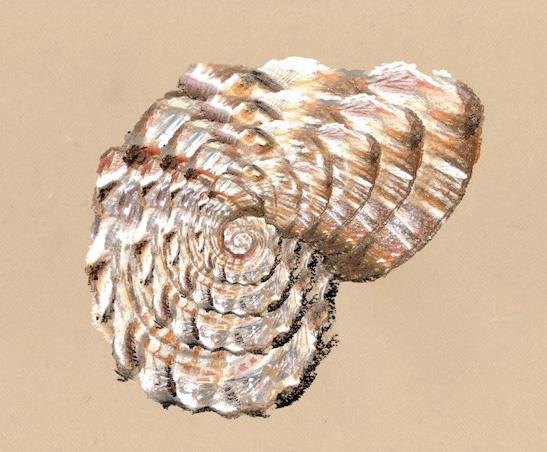 Alexandra Zummo
Alexandra Zummo
92
Grace Sullivan Shell Interlain

Sullivan Natural Images
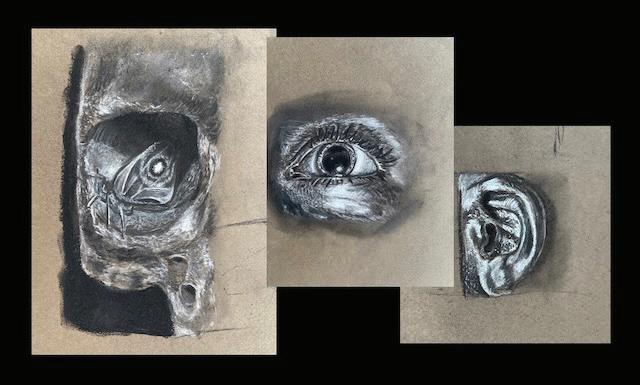
Grace Sullivan Nature Reflected
93
Grace
A Letter From the North Pole Team
Abby Kesmodel
December 13, 2023
To whomever it may concern:
Our team has been working relentlessly the past few weeks ahead of Christmas. However, it has come to our attention that many of our elves have formed a labor union. This union, Elves Against Reprehensible Salaries (EARS) is now striking in response to our company’s transition from financial compensation in US dollars to Fisher Price money.
That being said, we are in need of elves so everyone can still enjoy Christmas. You are registered as “fun-sized” in our system. You have been selected randomly to serve as a replacement elf for the time being. Tomorrow morning, our rental sleds will come by your houses to bring you to the North Pole. Please try your best not to fall off; the last thing we need right now is more lawsuits.
Many of you will be placed in the stables with our beloved reindeer, Rudolph, and, ah—the rest of them. Please try to be gentle to these fabulous creatures on the ride up; we don’t need another red-nosed reindeer.
Best,
The North Pole Team
94

95
Maya Tillman Sparkles
Truth, Tapestry, and Mythology
after The Unicorn Defends Himself (from the Unicorn Tapestries) Alessia Cutaia
The only defining difference between mythology and solemn, cold-hearted facts is if you have veiled the ambiguous, studded truth with enough allure to be worth telling.
To do so—to capture the maiden-like veil and drape it across your common life—you must grip mythology by its horns and take such a creature as a trophy.
Have you sharpened your spear? Climbed upon the creature as your steed? Leeched its blood? Stretched its matter on a cross and declared it a solemnity? Then, unveiling its dirtied coat, have you cloaked yourself in the white riches of its broad back? Finally, carving your heroic story into its horn to be used as utensils?
Once you have untied its life, completed the spar, have you then declared it truth? Or is your herohood still in question? Your chaste, vestal, sunken face still peeks from behind its veil—the fabric too fine, too little thread, too little of the beaten creature’s fine hair twisted into your covering to keep the covenant. Your devotion to your immortalized life must be drunk from the grail, swallowing the remains of the beaten creature. Then, you may make your veil your vestment, your plump face finally covered with the full trophies of your victory.
When you have completed such steps, sit on your invented throne. Drink again from your creature, your trophy, your grail. If someone stands at your portrait to question your gallantry, let the pang of their simpleness strike them, shaking your hand at them from beneath the gilded legend as if to curse their stately grip on the truth.
Unveil yourself, dear hero, dear legend. Who can declare its sincerity but you?
Sloane Creech, Maddie Maliakal, Elisabeth Schmitz Tapestry
96

The Culling
FADE IN
EXT. STREET - DAY
Alexandra Zummo
Sixteen-year-old WINNIE walks along a sidewalk, wearing a school uniform and a backpack slung over her shoulder. She turns, bumping straight into a sign saying “Street Closed.” It appears that a branch has fallen on a powerline from a storm the night before, blocking off the street. She turns around and takes a different route.
Winnie arrives outside of her house to discover a herd of police cars. She walks faster now, breathing heavily. She rips open the door and rushes into the kitchen, where she finds a group of police officers standing there.
WINNIE
What happened?
EXT. GRAVEYARD - DAY
A funeral service is being held. A group of about thirty people all dressed in black sit in chairs in rows leading up to a wooden casket. A woman in her forties, GUEST, stands to the side of the casket in front of a podium, giving a speech.
GUEST
She was the kindest person I ever met. She would do anything for anyone she loved. If she were here right now, I think she’d tell us to cherish our happy moments. You never know when they’ll be gone forever.
Winnie sits in the front row. She wears a black dress with lace accents and broad hems. Her face displays utter shock; her mother lies in the casket.
98
THANATOS
I’m sorry about what happened to your mother.
Winnie snaps her head to the side to look at THANATOS, a man in his thirties with black clothing and hair. Her eyebrows furrow together, confused.
WINNIE
Have you been here this whole time? I could have sworn I was sitting at the end of the row…
THANATOS
My name is Thanatos. It is regrettable that we had to meet under such dreary circumstances.
Thanatos holds out his hand, offering a handshake. Winnie reluctantly accepts the handshake and glares at Thanatos distrustfully.
WINNIE
Winnie…
THANATOS
You must obviously be upset about your mother’s passing… and I bet you’d do just about anything to have her back, wouldn’t you?
Winnie slowly nods. Thanatos sighs.
THANATOS (CONT’D) What if I made you a deal? Your life for hers?
WINNIE Huh?
THANATOS
I take it you’re unfamiliar with Greek “mythology.” I am Thanatos,
99

100
Arielle Burrows Cacophony
death incarnate. I have come to bring your mother’s soul to the Underworld, but if you’d truly prefer, I can take yours instead.
WINNIE
What? And I’m supposed to believe you? That you’re some mythical being who can reanimate my mother’s bones? Like she’s a goddamn puppet?
THANATOS
I think you’re too desperate to have room for whether or not you believe me. Meet me back here at 11:30 tonight. Don’t be late.
The screen blacks out for a split second. It reappears on the exact same frame, but with Thanatos and his chair missing. Winnie scrunches her eyebrows together again, confused but deep in thought.
EXT. GRAVEYARD - NIGHT
Winnie walks through the graveyard. Only the sounds of crickets chirping and the occasional owl hooting can be heard. Winnie accidentally steps on a stick. The stick breaks, sounding like a bone snapping in half. She jumps. Winnie hesitates, then continues walking.
Winnie reaches her mother’s casket, looking for Thanatos, who is nowhere to be seen. She glances at her watch as it switches from 11:29 to 11:30. Thanatos appears.
THANATOS
You’re taking me up on my offer, then?
Winnie jumps, turning around to see Thanatos behind her. He holds an inverted torch.
THANATOS (CONT’D)
Your life for your mother’s?
101
(pause) Decide carefully.
WINNIE
If I want to save my mom? I don’t have much of a choice, do I? (laughing bitterly) God, I must be crazy, making a deal with the Grim Reaper or whoever you are. I don’t know why I even believe you, but I do. Like you said, I guess I’m pretty desperate.
Thanatos says nothing and simply holds out his hand once again Winnie takes it and shakes his hand, closing the bargain. Thanatos is silent for a moment, eyes fixed on the ground, before finally speaking.
THANATOS
You know, I just had this same deal with your mother a few days ago. Except you were sitting in that casket, not her.
Winnie whips her head up to look at Thanatos.
WINNIE
What do you mean?
THANATOS
A few days ago, you went on an errand for your mom. You were driving to get the groceries for dinner when a car came racing down the street. The driver’s heart had just failed, and he was unconscious when his car collided with yours. You died, and your mother, with a heart as broken as that driver’s, laid awake at night begging anyone out there to bring her daughter back, no matter the cost.
102
WINNIE
And you appeared to her just like you appeared to me, proposing a deal…
THANATOS
(nodding) The time was reset, but this time, there was a storm the night before.
WINNIE
The branch that took down that powerline! It delayed me for long enough on my way home from school that my mom decided to go pick up the groceries herself.
THANATOS
It’s strange how that works, isn’t it? A single choice can have such drastic consequences. The universe, or rather, I, chose to give the world a storm. That one choice completely altered the course of you and your mother’s lives and anyone else’s lives who grieved for either of you. What if, in another scenario, someone made the single choice to take an insult just far enough that it had tragic consequences? What if someone made the choice that they wanted a different drink, avoiding their poisoned dinner cup?
WINNIE
But not all choices are significant. I mean, I’m basically canceling out my mom’s decision to save me by saving her instead, right? And then can’t she override my decision by just making the same
103
deal with you again?
THANATOS
Only if I decide to listen to her pleas.
WINNIE
Will you?
THANATOS
For what it is worth, I truly am sorry this situation has occurred to both you and your mother. I do have one last question for you before we part ways, however. Which is worse: grief or death? (pause) Not all choices are correct. Sometimes there is no correct choice at all. Perhaps that question is an example.
WINNIE
Why are you asking me this?
THANATOS
You believe that you have made the selfless decision today to save your mother from death. Yet you are condemning her to another pain: grief. Did you make the right decision?
Winnie pauses.
WINNIE
My mom loves photography. She loves to listen to music. She loves her friends. I want my mom to experience joy, and she can’t do that if she’s dead.
THANATOS
(nodding) Those moments where
104
she’ll feel happiness will slowly ignite flames in every torch in her mind extinguished from grief. Those moments will wrap gauze around her grief and make living worth it. I guess you found your right choice, then. Goodbye, Winnie.
Thanatos flicks his hand in the air.
FADE TO BLACK
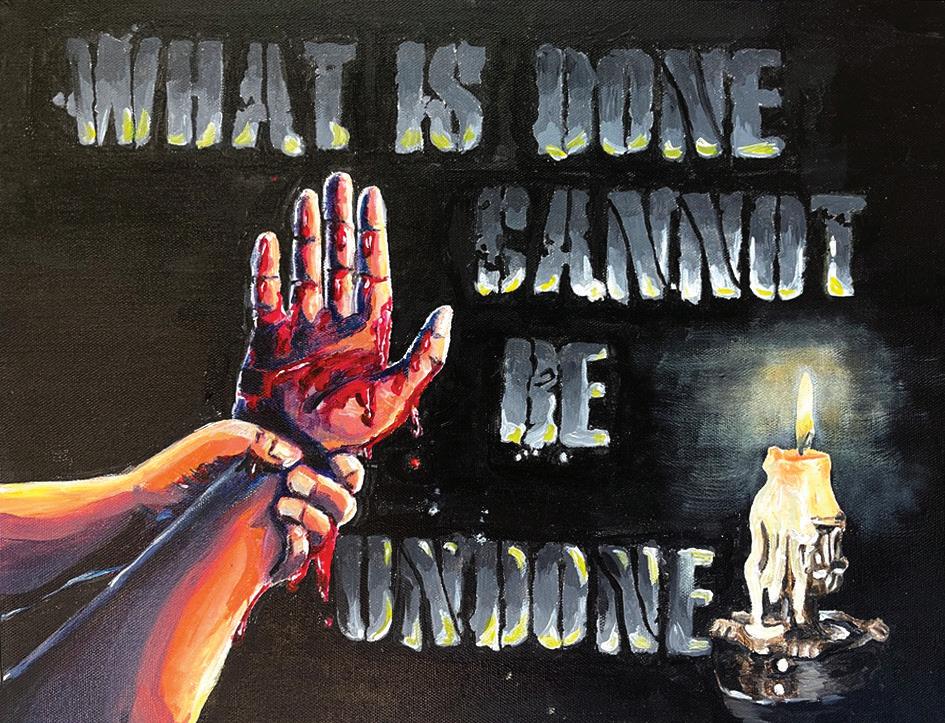 Anna Leventon What is Done
Anna Leventon What is Done
105
Following pages: Ainsley McKee Beth; Martha
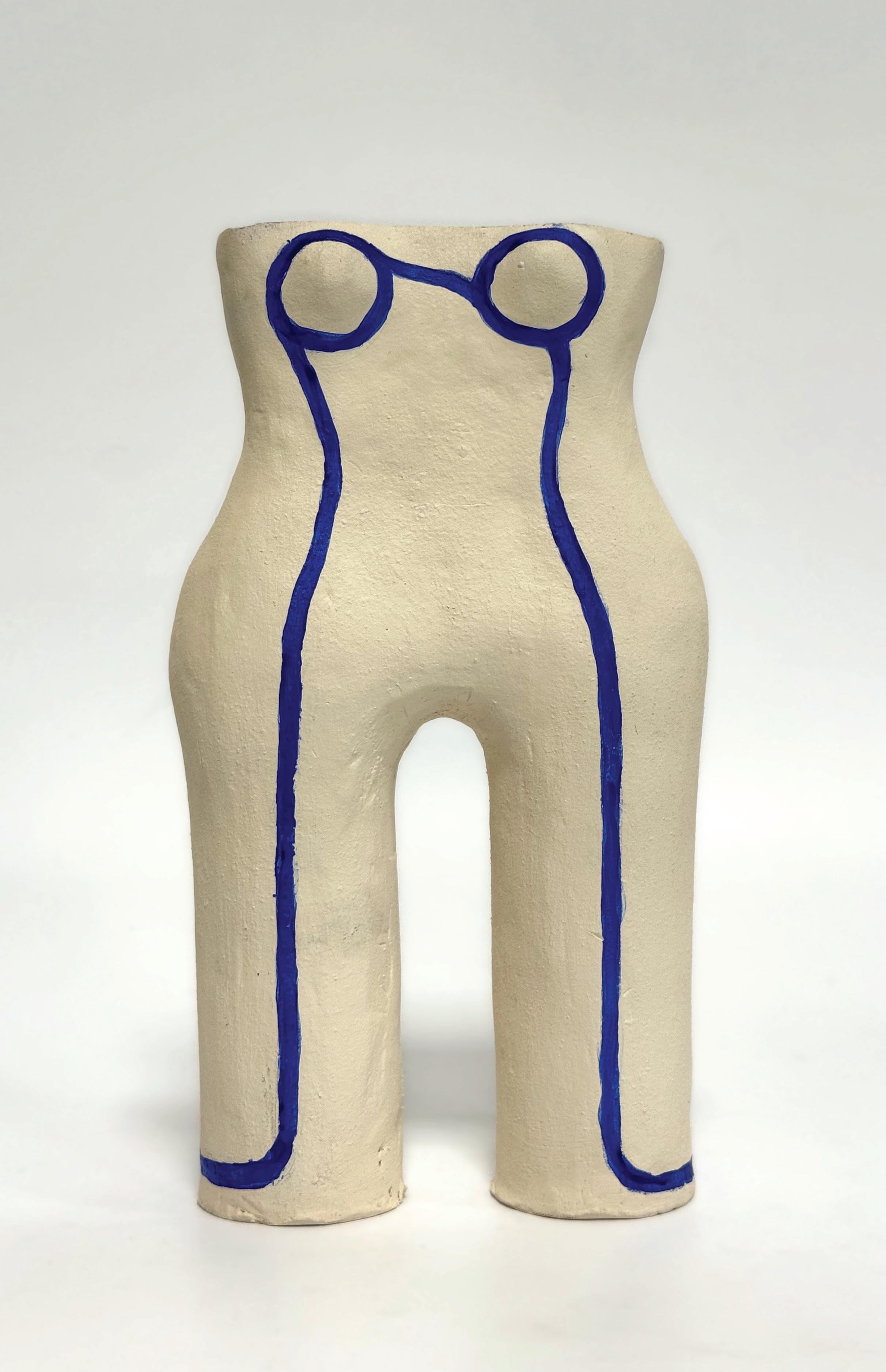
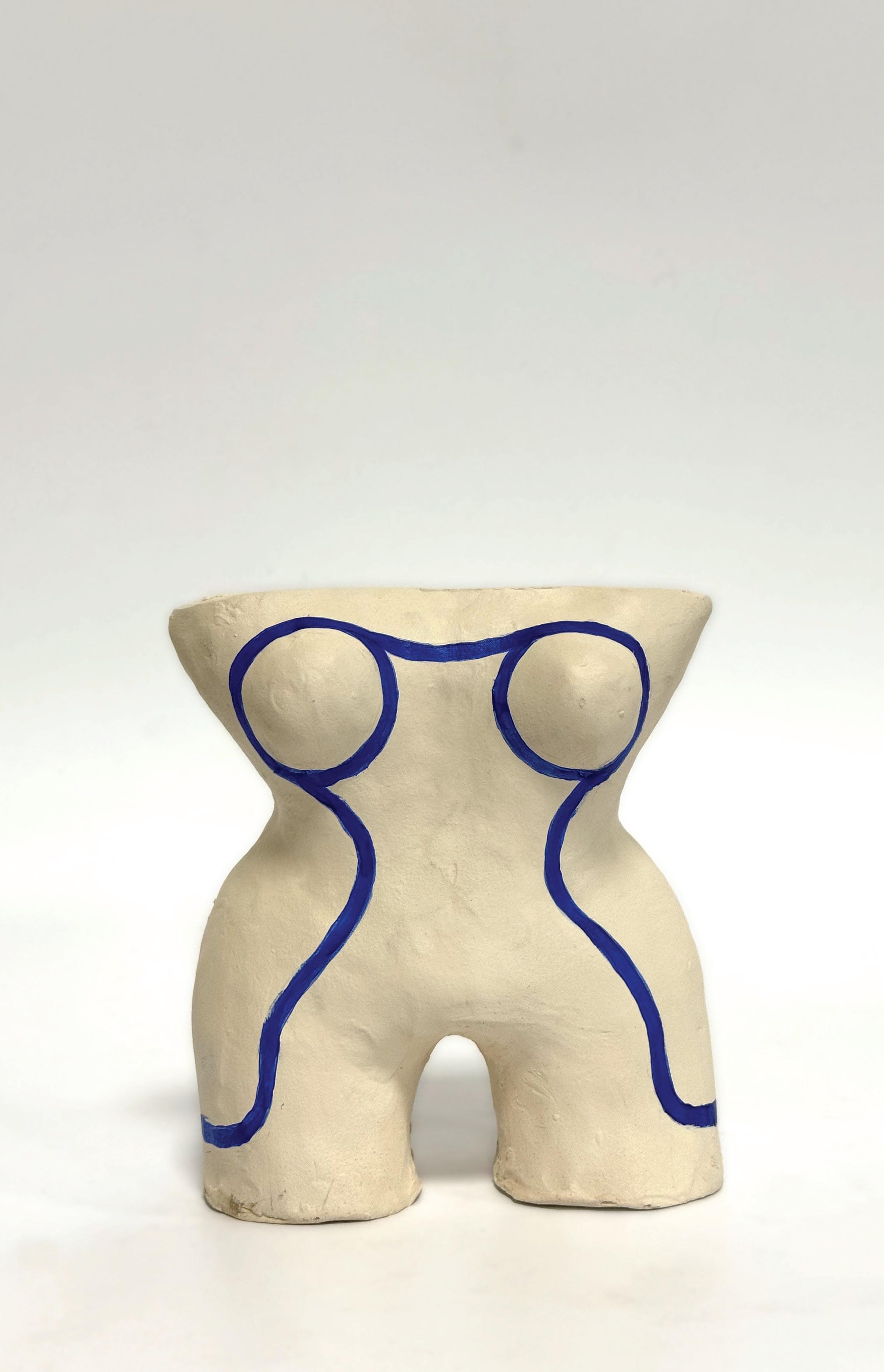
BUT THE AIR AND THE SKY ARE FREE
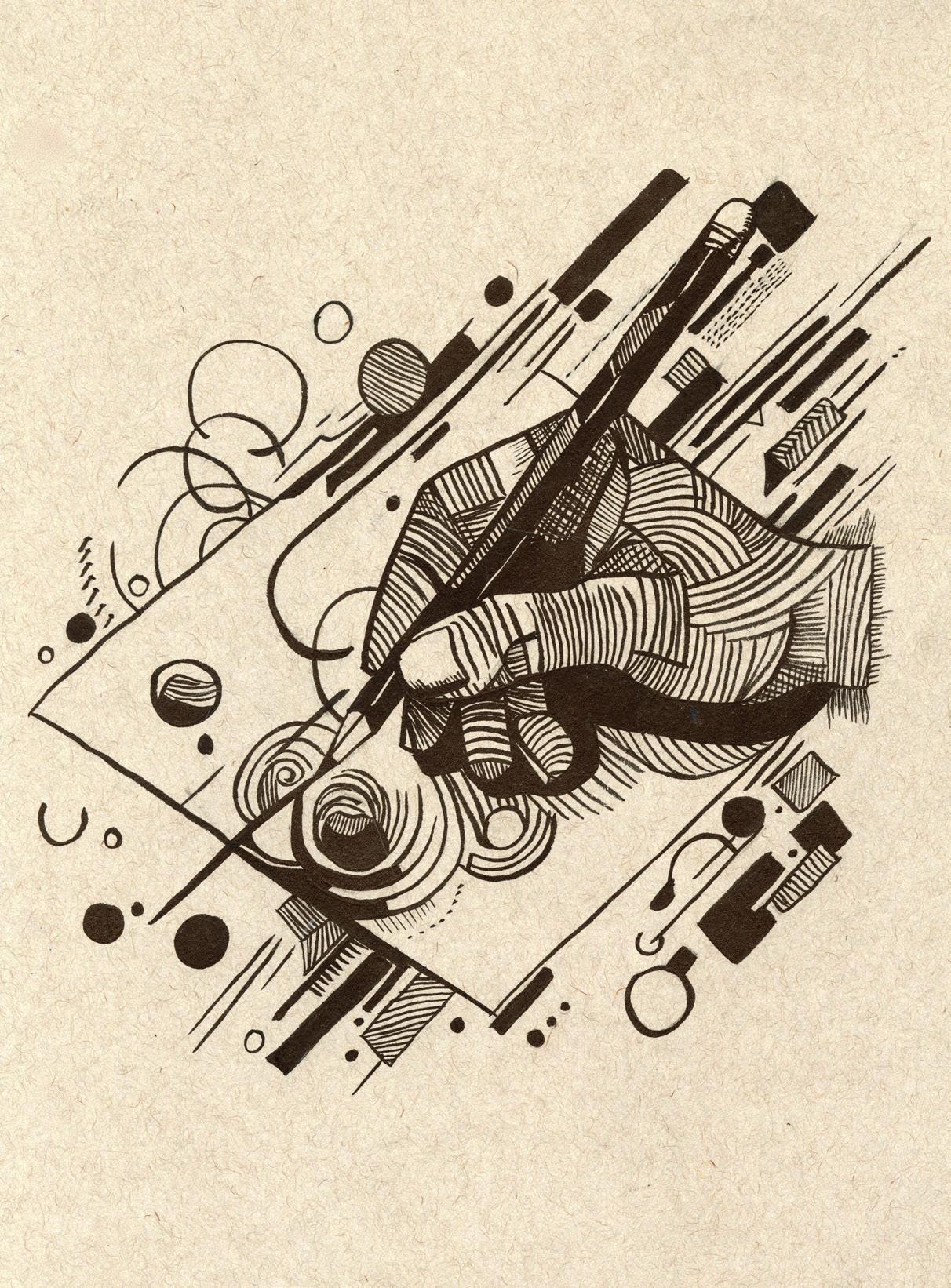

110
Zara Kurbanov Rock Garden
A Great Lake
The azure sky sits still, Its opaque color veiling the still surface below Like a freshly ironed fitted sheet. Stars slice through drifting clouds in silence.
Grace Genereux
Manicured lawns line the channel, With tree branches crawling out over the current, Their black shadows inverted in the water’s thrall, And their subtle rustle echoing toward the pier.
Sunlight weaves its shimmering thread, Lacing through arms, legs, and hair, Making the water bronze and sparkly, Its peaks and troughs reflecting every ray.
Mayflies pack the pier in crowds, Frightening the chubby toddler in a life jacket. He can’t waddle through this army of insects Until their wings beat against the water.
A lone Cigarette boat slices through the waves, Silhouetted against an orange canvas, Its roar turns heads from inside beach cabanas, And its wake rolling all the way to shore.
The elusive Petoskey stones are buried among pebbles, Hexagonal patterns tattoo their bodies: An ode to their fossilized nature. These rocks have long outlived my memories.
111
Icarus Inverse
Grace Sullivan
I am tested each morning when I stand at the end of my street. I could turn right and walk to school like I do day after day. I could go straight and walk down the cul-de-sac of musty, ramshackle houses, hitting a dead end. Or, most alluringly, I could always just turn left. It would be a long walk, but after about two miles with no turns, I would reach the dock that overlooks the ocean. The ocean has a wild and cold sort of beauty that is completely open. I would have to squint my eyes a little from the chilly wind and the sunbeams as I gaze out over the water. Even though I love the dock, I hate swimming; I can’t stand being so wet and vulnerable, squirming helplessly in the water like a bug. When I stand on the dock, I can be dry and comfortable while experiencing the liberation of the ocean. Freedom, if freedom could ever be safe.
I never turn left, though. I turn right and walk to school every single time. Every morning, thin, crusty ice sticks to the edges of the sidewalk and the dying grass stands straight up like cropped blades of straw. It’s all gray and flat.
At school, students are slouched on the benches with their bags collapsed on the floor as they chat with one another. Teachers, groggy and wan, fill their mugs in the faculty lounge.
“Get to class!” A teacher shouts through the hallway. Some kids still linger on the benches, but most slowly lift their backpacks and saunter into a classroom, still carrying conversation.
My first class, Physics, is particularly slow and difficult. As my teacher explains linear momentum and collisions, I feel an acute pain shoot through the center of my back. I wince but try not to make a noise so I don’t draw attention. The room gets colder and colder until I have to put on the jacket I had hung on the back of my chair. I glance toward the back of the room to check if a window is open, but they are all closed. Why is it freezing in here? I look around at my classmates, but they sit relaxed in their chairs, unfazed by the cold.
When my teacher dismisses us, I swing my backpack over my shoulder. Instantly, I feel a shocking pain in my shoulder blades. It feels like a bruise getting poked, only the pain is all over my back. I immediately drop my bag, hurrying to the bathroom to inspect my back. Once I’m inside, I look in the mirror and chuckle because I look so bad. My skin is extremely pale and glistening with a sheen of cold sweat.
112

113
Elena Schmedlen Fluffy
I gently lift the back of my shirt to look at my back and shoulders. I blink when I see my bare back. My shoulder blades appear to have lengthened greatly, reaching down to my hips. My spine appears to have thickened, each vertebra twice as bulky. My elongated shoulder blades are pointed at the tips and stretch the skin around them. My upper back is covered in bruises, but they are black and green as if they have been there for weeks.
I lower my shirt and turn around. I put my coat back on and I swing my backpack over my shoulder. I wince at the pressure on my back, but I grit my teeth and stare forward.
I could go to the nurse, but what would that do? I probably should go home, but missing school is hard to recover from. I should really just stick it out and finish the school day.
As I walk to my math class, the pain becomes unbearable.
“Wow. You look awful,” my friend says as I walk into the classroom. “You good?”
“Yeah, I’m alright,” I say. I don’t feel like talking. My back hurts and I’m panting and sweating profusely.
Class starts, but I can’t focus. My back bones are continuing to grow, pressing harder against my shirt, which is stretched awkwardly taut against my torso. I’m so cold that I’m shivering, and I have to clench my jaw to keep my teeth from chattering.
My teacher calls my name. I freeze. She raises an eyebrow. The class looks at me, waiting.
“What is it?” I ask.
“Graph this equation,” she said. The polar equation r=6cos(8θ) is written on the board. How do I go about this? Everyone is going to see my back. I start to stand up slowly. I walk toward the front of the classroom. The room was intensely quiet aside from my ragged breaths.
“Why are you hunched over? Are you okay?” My teacher sounds more irritated than concerned. I am not hunched over at all. It’s just that my backbones are so misshapen that they bulge out, giving me a hump.
“Scoliosis,” I say with a quick, flat smile. Right as I lift my hand to graph the equation, I feel my shoulder blades pierce through the skin on my back. I scream and suddenly, the classroom, the math problem, and the teacher don’t exist. A feral and internal impulse rips through me, and I know that I am a creature and nothing else, and this school is just a building stuck to the ageless, churning Earth.
114
I tear off my coat as fast as I can. The back of my shirt was torn open, just like my skin, but there is no blood. My flesh is torn and white, like a dead man’s. I don’t care. All I feel is pain, pain so consuming that I can’t breathe. My teacher screams. Is somebody crying? What nonsense! Someone is calling an ambulance. Oh, SHUT UP! What’s the point of all this drama? They need to shut up and go away so I can be alone.
I’m writhing and helpless as I fall to my hands and knees. I feel heavy. So heavy. If only I could stand up and get on with it. Get this nonsense over with. Paramedics rush into the room and try to corner me. My teacher shouts at me, and a medic lunges for me with a needle. I dodge. It’s too loud. They’re trying to kill me. I’m a defect, I no longer belong to this school, this place, so they need to cleanse me out. I am a blemish on their uniformity, so they despise me. It’s not like my absence will make a difference. How will they dispose of my body? Maybe they can dissect it in science or turn me into fertilizer for the flowers out front. I’d be of some use, at least more than I am now.
Alright. Okay. I’ll go. I rise to my feet, and I run out of the classroom in stomping, heavy strides. Why am I so heavy? I’m clumsy and I’m running and I’m trying not to fall. I run away from campus, and all the way to the dock that overlooks the ocean; it’s the only place I can go. I reach the end of the dock and I’m heaving. I fall to my knees.
I look over my shoulder so I can see my back. I freeze. Wings. How did I not realize what they were? They look so obvious, just sitting on my shoulders. It’s easy not to recognize them when they’re behind my back, weighing me down instead of lifting me up. They are not angelic or delicate. They look like a gargoyle’s wings. My bones have stretched into a wingspan twice my height, connected by thick skin and bands of veiny muscle. They had been twitching and developing beneath my skin. When they tore their way out, they unfurled like bony hands, gunky and wet like a newborn baby.
Wind blows and pushes on my wings. I’m shoved back and lifted slightly above the ground by the force. I don’t have control. I feel panic take over. I’m so scared, I feel like a little kid. I move my wings rapidly, trying to move my feet back onto the dock, back to security. I rise higher, but I feel so heavy. I flap my wings rapidly. I’m turning in the air, I’m on my side, I’m upside down, I’m rolling. I’m strong. The force of my wings is powerful, but I can’t be steady. I’m jerking from side to side.
115
I need to go. They’re still after me. I catapult myself toward the ocean, the water, the freedom. I soar through the sky, and it feels incredible. My eyes are wide, and the air is smooth and soft as it presses against me. The ocean is tumbling, churning, living underneath me. I need to touch it, become it, fly in it. I am unruly and wild, I have become nothing, I am more free than ever. I dive down so I am just an inch above the water. I reach an eager hand down to trace my fingers over the waves.
The ocean sucks my arm beneath its black surface. The speed of my flight is disrupted, my body flips over so my back and wings are skidding against the water. I’m too heavy, I can’t keep my head up. I’ve never been this desperate, gasping for freedom and life. I’m drowning. How is this possible?
My wings will save me, I’m sure of it. I turn on my back to push my wings out of the ocean, but the water has made them too heavy. I push and push with my shoulders. My muscles burn and I let out a low bellow.
I’m hot, so hot. I relax my body and sink down. It cools me down a little, but I need more. I open my mouth and let the water flow in. I blink my eyes and swallow in big gulps. I wrap my wings around my body, holding myself in a shell of flesh, and I am my own, at least until I dissolve on the ocean floor.
116

117
Isabel Hartman Butterflies in the Stomach
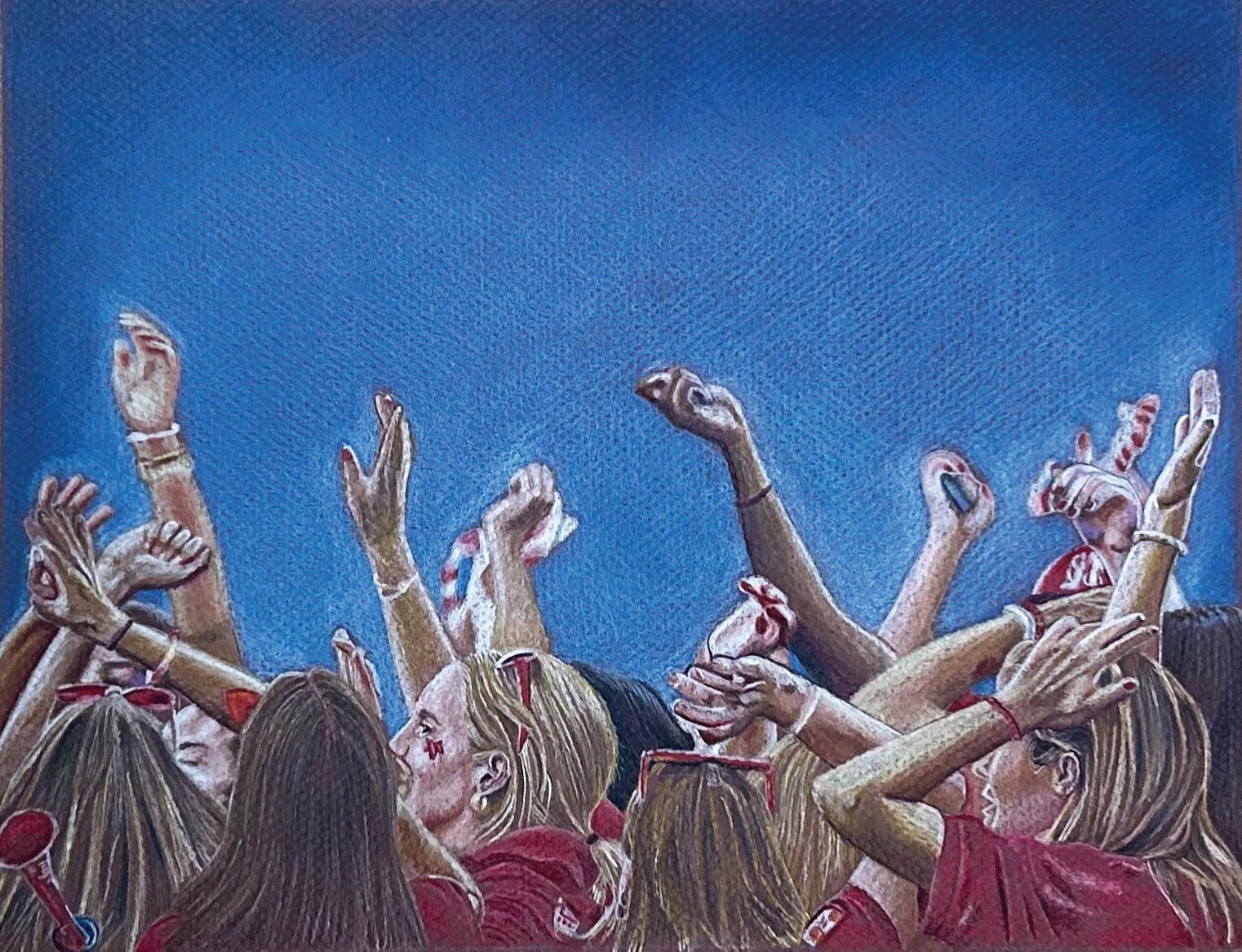
118
Zara Kurbanov Spirit
Graduation
Gigi Caldero
She’s told to show no fear, she’ll know to find the light in dark, Her keepers know that the ocean’s breath travels bubbles up.
Their bubbles swell around her, guide her away from a past they neglect to utter, away from the masked rubble, up.
Their veiled bubbles hide her, praise her, confine her to a destiny she thinks she owns until her resolve crumbles up.
Their veil pops too soon to miss the horror of the depths watching her tears—all she has that’s still her own bubbles up.
Yet she swims quicker to a surface where she doesn’t belong, betrayed by her own blood. The nitrogen burns, bubbles up.
She swells, lungs yearning for air she’ll never know, heart dying for a dark she can’t return to while she still struggles up.
The currents caress her, another ocean’s Icarus. Her people mourn as one. Watch their fists, white, knuckle up.
Another failure shared, another loss sacrificed. They’re Neptune’s Daedalus, watching their children’s corpses double up.
119
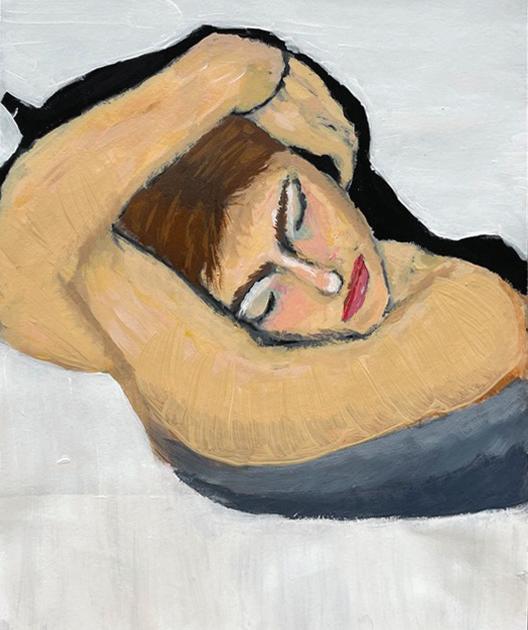
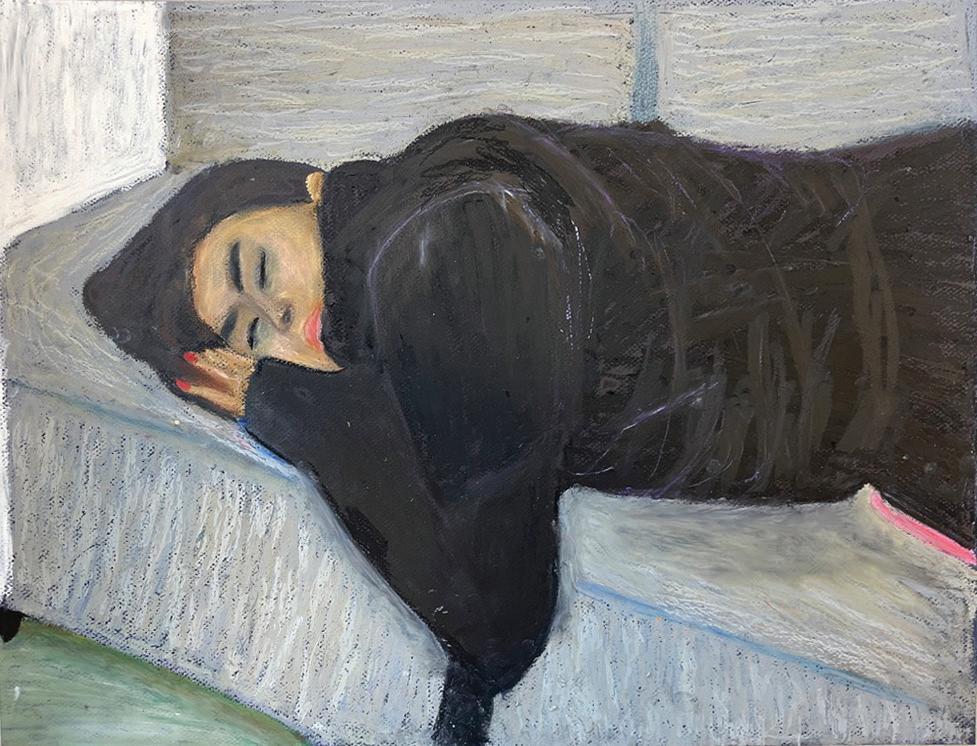 Delilah Benn Sleeping Series, II
Delilah Benn Sleeping Series, II
120
Delilah Benn Sleeping Series, I
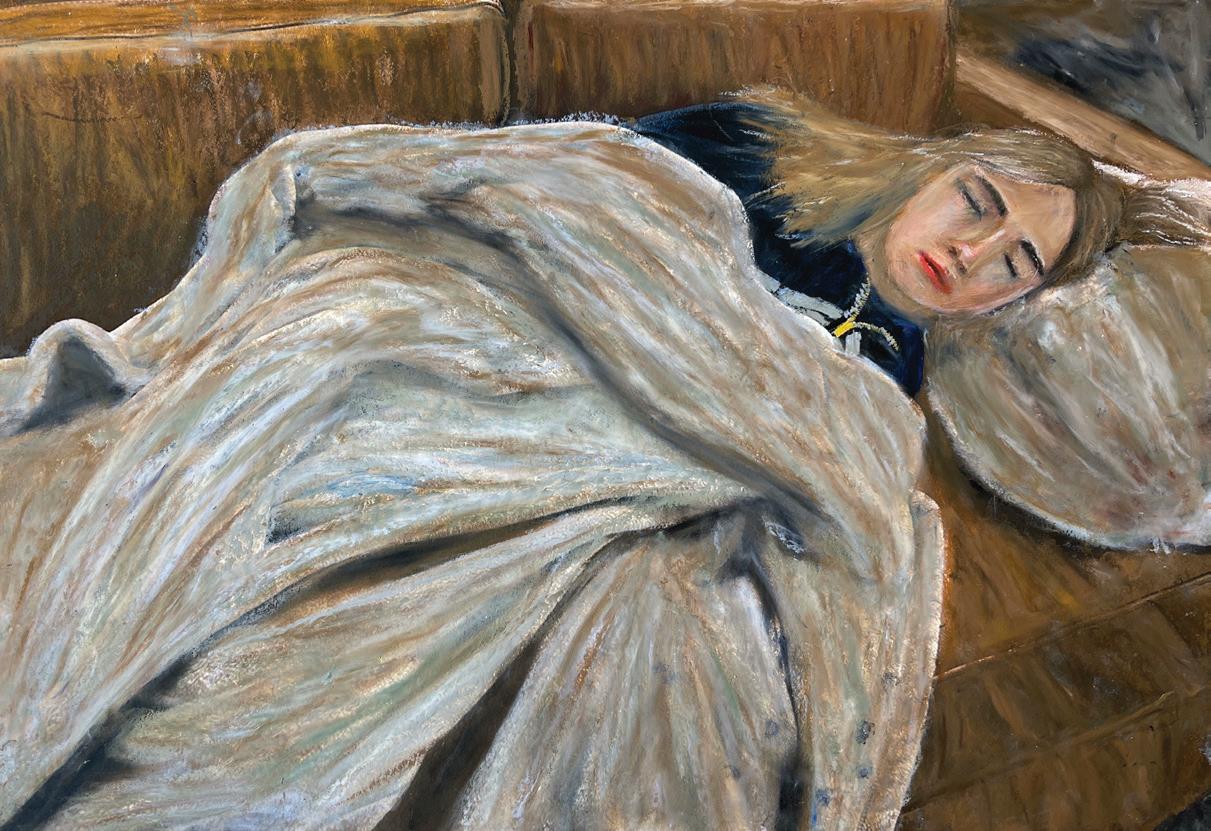
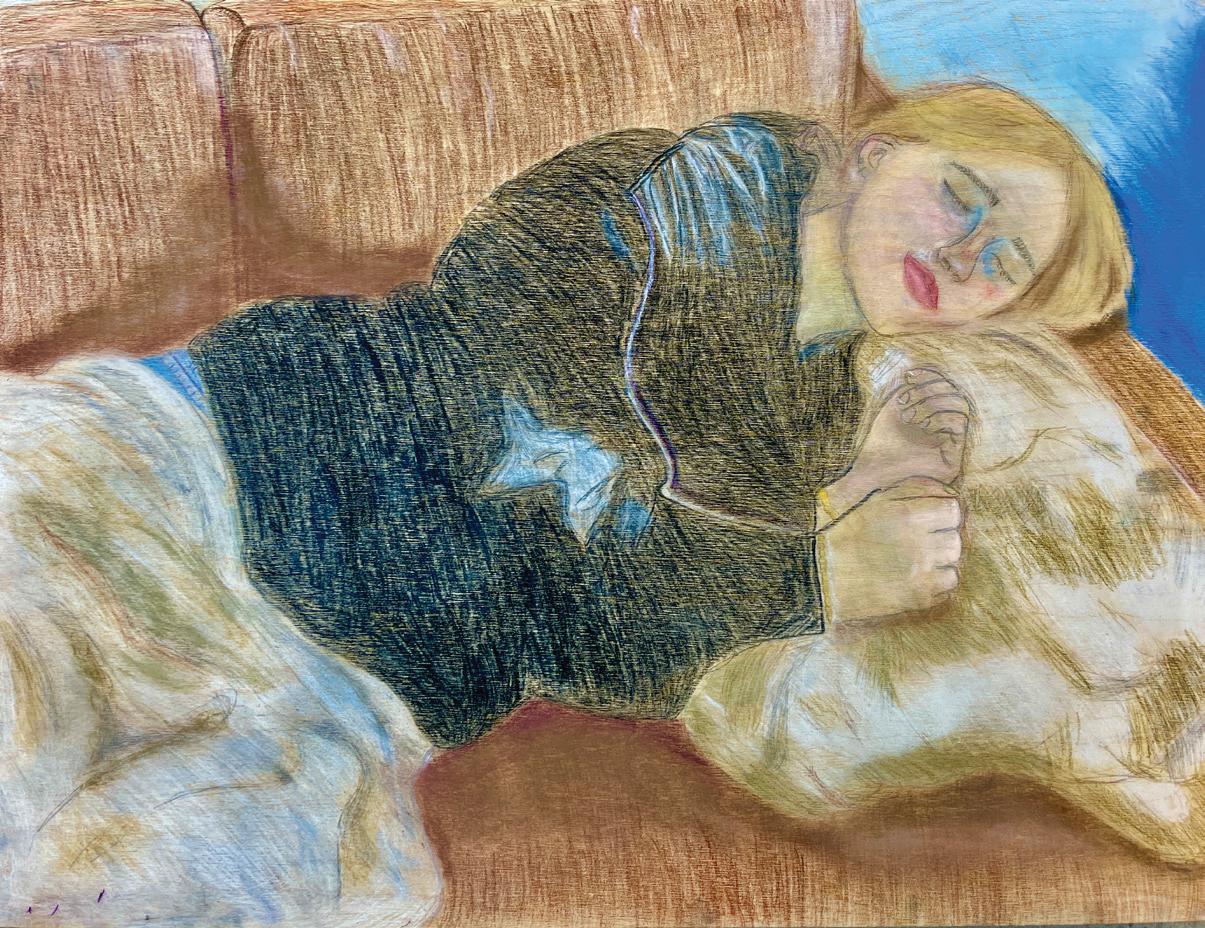 Delilah Benn Sleeping Series, III
Delilah Benn Sleeping Series, III
121
Delilah Benn Sleeping Series, IV
Thirteen Ways of Looking at the Stars
after Wallace Stevens Rena Georgakopoulos-Ueta
I
Hundreds of silver stars
Pulse above the silent streets
Embedded in the fabric Of Evening’s dark blue dress.
II
Past thirteen strokes of Dead memories
Beyond the edge of Time march
Fifty white stars.
III
One sky; Two lawns; Three times; Four eyes—
A thousand stars fly.
IV
I was completely hopeless Like two fingers
Squeezing the glow of a midnight star.
V
The sweet perfume of the floor
Swept by a wind from the open Door sparked an electric Shock to his brain of hundreds of Colorful stars.
VI
Millions of lives
Amble through the sky, Intertwining fates
Among the stars.
122
VII
Collections of hydrogen and helium In a star Among stars In a spiral Among spirals In a universe Among universes Nowhere and Everywhere.
VIII
To the question of a thousand years the stars ask The Earth responds a thousand years Later.
IX Whispers of hopes and wishes Swish through the Cracks Of the sky Towards the Stars.
X
Three faces, three lies The glass sky assumes To greet the living— Deceptions and reflections of color. Only sleep reveals Its purest soul Dotted With billions of delicate stars Seen unknowingly By millions of awestruck eyes.
XI
The sleeping houses bathed under The soft incandescence Of the stars.
123
The greedy fool who chases after the reflection of the stars Drowns
Among remnants Of the past.
XIII
A vicious cacophony
Cracks through the air
Broken by the silence Of the stars.
XII
124
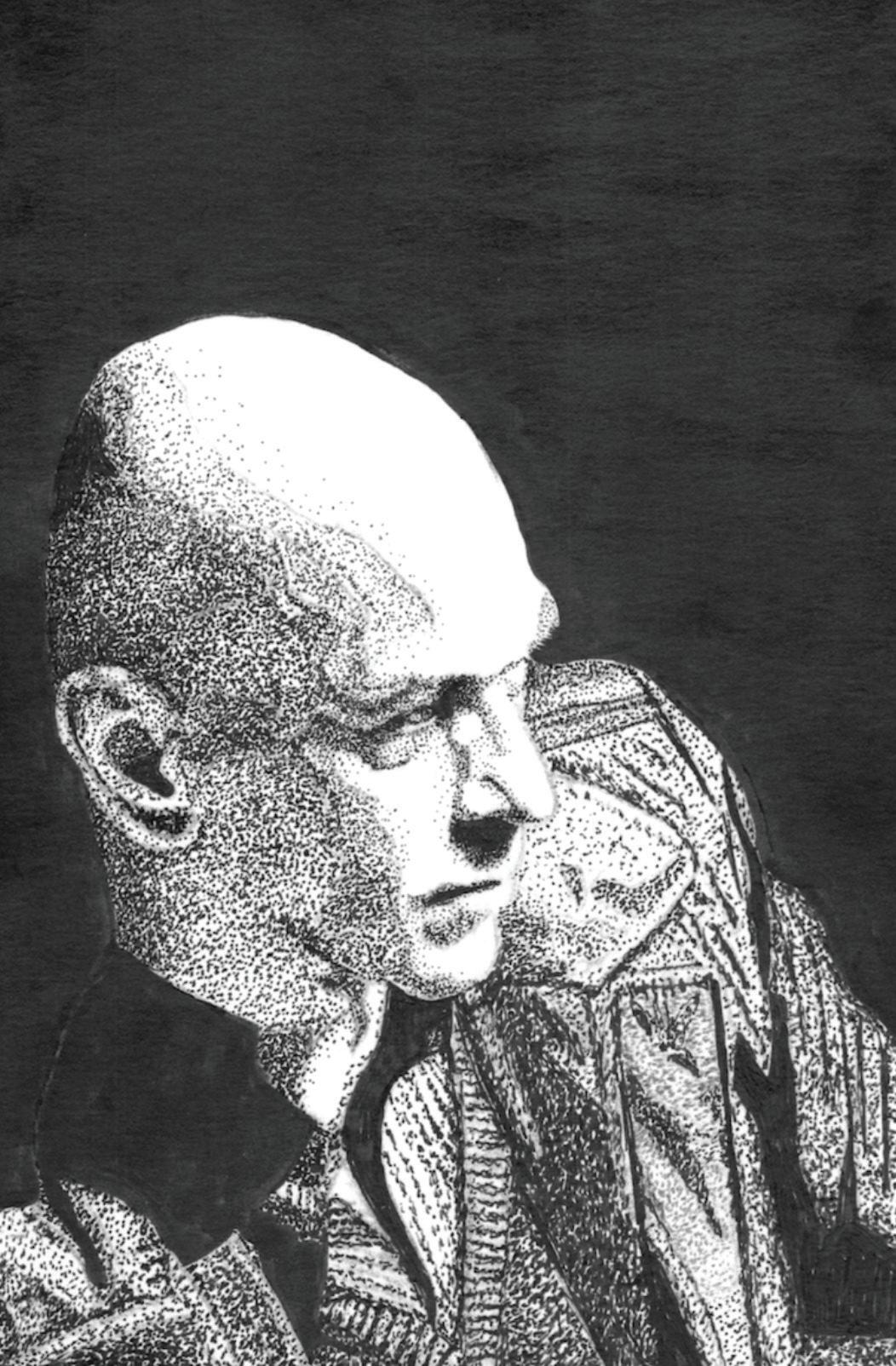
125
Anna Leventon Impressions
The Sun
Zara Kurbanov
She shines so brightly as she envelops the world with her rays. Animals scramble out of their burrows to bathe in her warmth. Holding hands, they dance in a circle and chant:
Oh! The sun has risen from her slumber!
Radiating is her perfection!
Blinding is her reflection! She shimmers in our eyes!
And glimmers in our teeth as we smile!
Oh! How the sunshine invigorates us!
From inside the depths of the Earth, the animals feel her scorching heat as a gentle and comforting embrace. But up in the cold vast space, she’s filled with rage. Her plasma surface appears cracked and porous; her sweltering skin emits streams of anger.
She’s tired of living in the center. Life revolves around her. She wants to live, she wants to laugh, and she wants to find love. Well, she’s found her love. But she could never truly be with him, could she?
He’s beautiful. He’s home to so many organisms that all interconnect and intertwine with each other. The way the stones that lie underneath his riverbeds guide the water as it rushes and gushes and settles at the bank in serenity. The way his forests are composed of vast areas of vegetation hiding little creatures beneath the leaves, beneath the moss beds, and in between cracks in the bark. The way the fish once swimming in schools in the colossal ocean find themselves on the plates of a five-person family celebrating their oldest one’s graduation.
Yet she knows that if she ever acted on her love, it would be nothing but destruction. Her boiling rage would latch onto him, slowly burning everything in sight until nothing remains but a pile of ashes.
And so she leaves him to the arms of the Moon and solemnly watches as they waltz together. Back on Earth, the sun begins to set and the animals gather once more before departing for the nighttime. They sing:
126
Oh! The sun has begun her slumber! She is radiating no longer!
She is blinding no more!
Her shimmer disappears from our eyes! And her glimmer vanishes from our smiles!
Oh! How the darkness has prevailed!
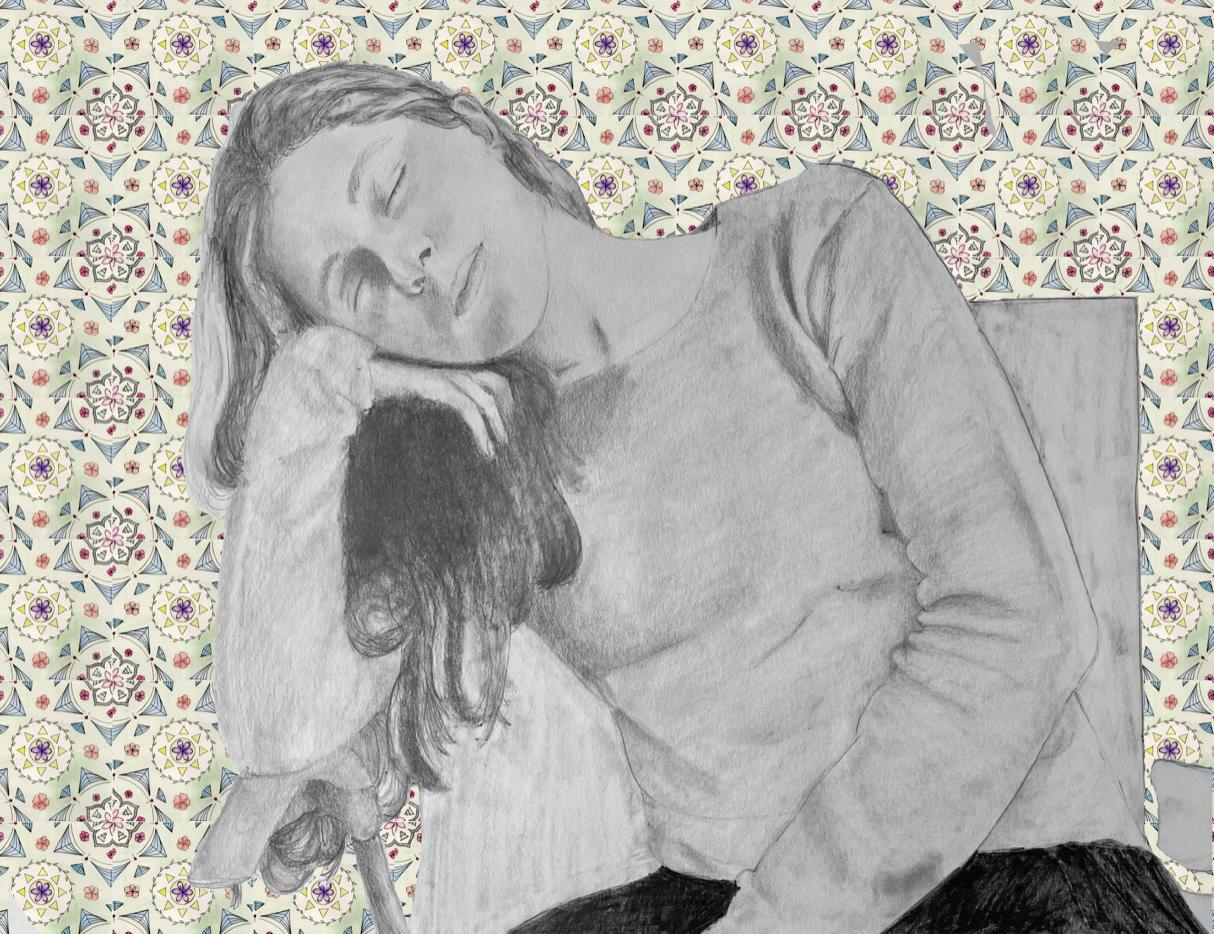
127
Estelle Santulin Self-Portrait in Repose
Abiding Courts
after
“B-Boy Infinitives” by
Patrick Rosal Nina Sennon
To destroy a game of tennis in the peak of summer
To stroll to Cappy’s Stationary for overpriced slushies that drown your hand before you can finish them
To saunter back as if our break lasts forever and we don’t have to teach the eager children the last puzzle piece they need to perfect their serve: a continental grip
To reside on the courts where I found mediocre tennis balls in puddles or piles of leaves when they start to fall To lie about going to the mall with friends just to end up back in no man’s land behind Harry S. Truman High School
To never enter the school despite my various memories of football games and tournaments
To only ever use their bathroom and not their classroom and still learn how to love something bigger than myself
To gain the best group of guy friends that cause me problems whenever I bring a boy around
To finally know what it feels like to have siblings close in age even if it’s not by blood
To fall and know I’ll have support
To bounce back and forth a ball drenched in water because we’d refuse to leave after it started to rain
To grow up and grow out of what once was a place that provided us with everything we needed
To still come back after every argument and disagreement and
To always find an apology lodged in the gate by a ball we probably planted there
To lose any and all sense of time and admire the sun set between sub-matches and drag ourselves to the bus stop
To fantasize about what life would be like when we could drive and meet up at each other’s houses
128
To be able to hang out all night like the world was as fleeting as the moon during the last few weeks of summer
To arrive home 2 hours after curfew and fear the consequences
To feel relief when the patience of my mother runs thin and her words touch my heart as her spit meets my face
To find comfort in defiance because then I know, for sure, she cares
To lay in bed exhausted and eyes wide open
To wake up the next morning without having truly gone to sleep, and
To repeat the days Monday through Friday from 9am until
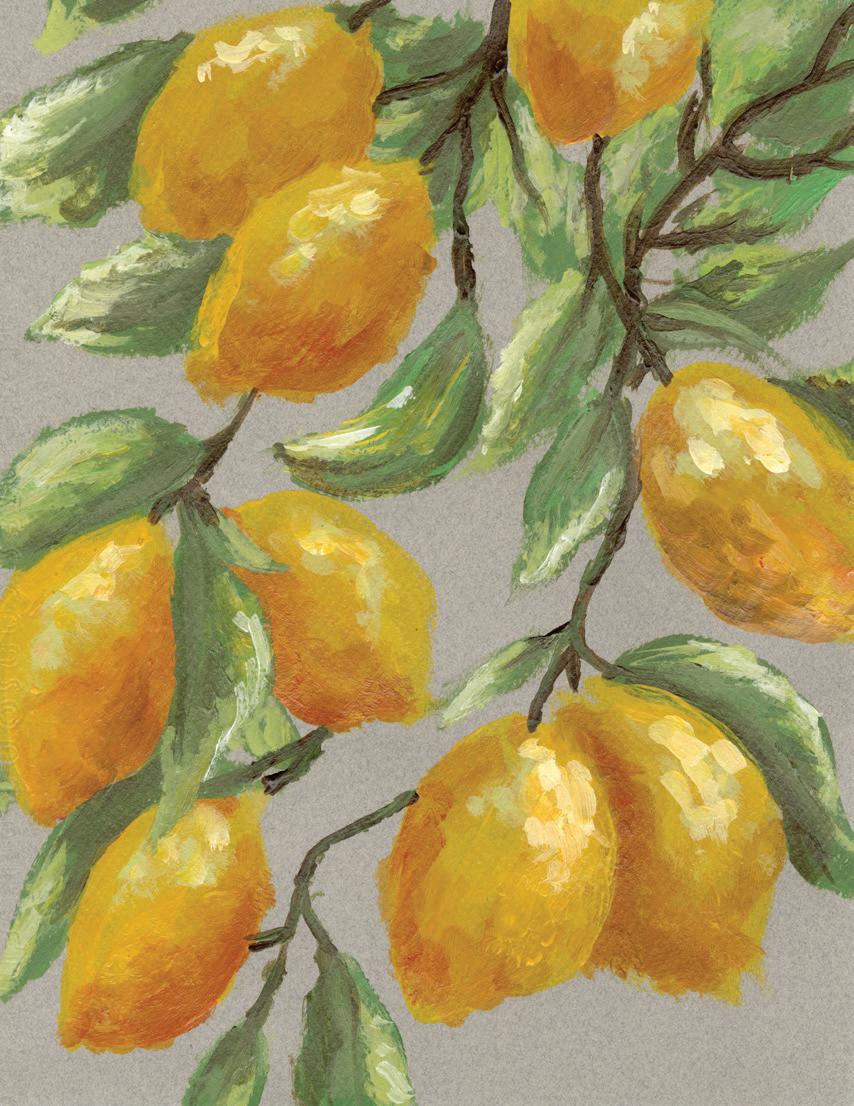
129
Vasilisa Banks Lemon Tree
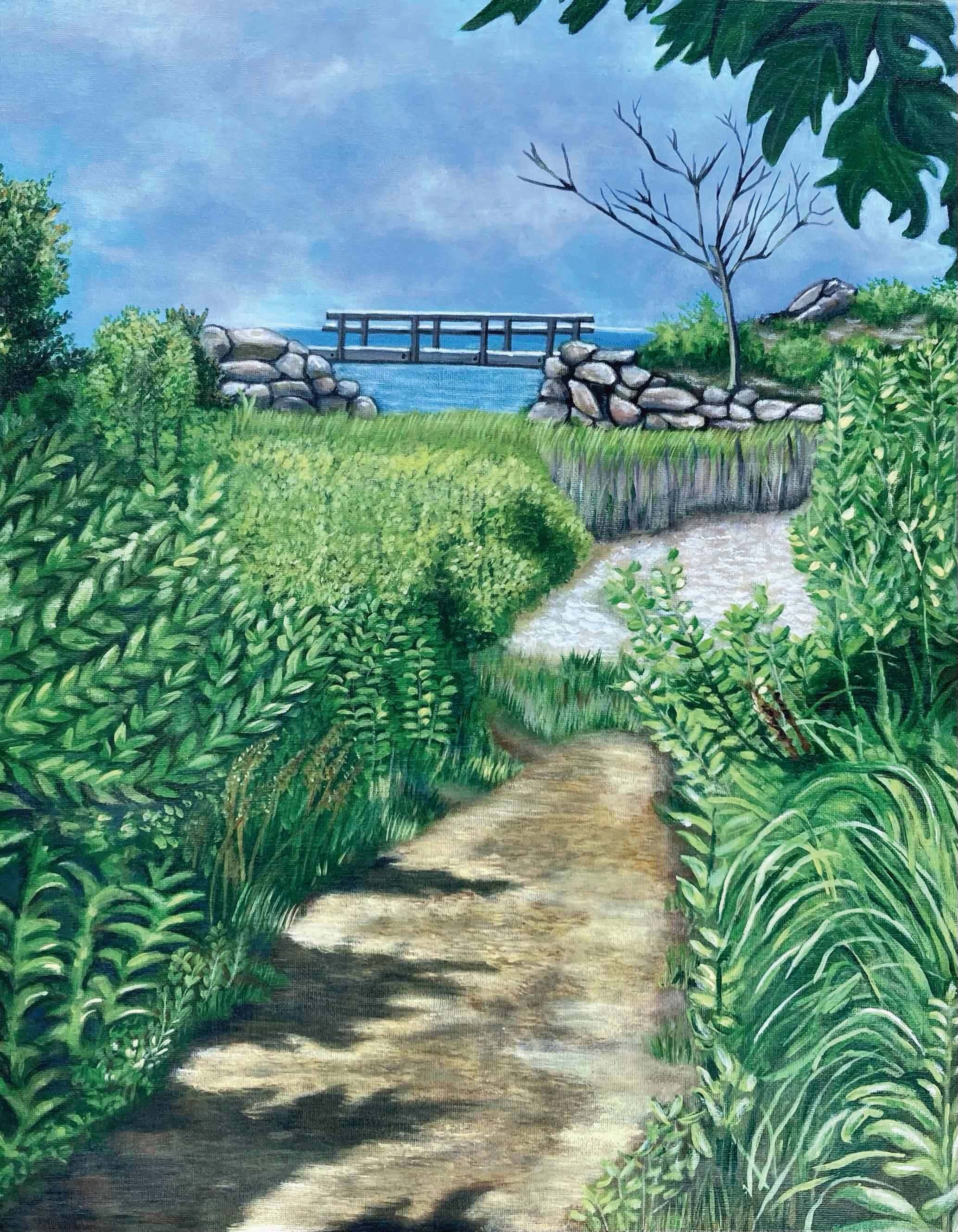
A Charlevoix Summer
Oh, Charlevoix, a place of fun and light, Where sunbeams dance upon my hair and skin. With days so long and skies so very bright, And laughter fills each moment, every grin.
The gentle hum of bees and rushing breeze; The campers smile and giggle playing games. Cabanas line the sand for shade and ease, And waves crash against the pier untamed.
I miss the lazy afternoons with friends; My mind recalls sunny orange hues. Our moments went quickly and had to end, I guess I’ll read these lines and think of you.
May all our memories be here to stay, To brighten every moment of my day.
Grace Genereux
Zara Kurbanov Tod’s Point
131
Temporary Nostalgia
Rena Georgakopoulos-Ueta
We entered the airport once more after five long years. The ticketing hall was almost devoid of people except for some grayed men in suits rushing about and an exhausted father kissing the tops of his children’s heads, a soft peacefulness twinkling in the corners of his eyes. The flight had left our muscles aching. As we got into the taxi a sleepy happiness streamed through my bones and overtook my stiffness. I grabbed my sister’s hand and she didn’t push me away. She lay on my lap and we both slept through the ride.
I awoke in a feverish state of sleepiness, disoriented to the point that the world seemed to curve around me. I remember the arrival in fragments as though it were just a dream: the pattern of granite on the pavement; the tall, white columns; a door. What I remember most distinctly was the unmistakable, sharp, woody smell that struck my nose; it was the exact same smell of our old apartment in London. Home.
My whole body ached and groaned as if it would never be enough.
My eyes at last opened to a quaint living room, my sister fast asleep with her mouth open on a makeshift bed. A soft morning light filtered through the silence onto my sister’s hair. I felt the utmost clarity in my mind as I got dressed in quiet reflection. As I pulled on my boots, a thrill ran through my back and I smiled at the prospect of a personal reunion with my much missed city.
In the lobby of the apartment, I straightened my headband in the gilt-framed mirror. The wooden smell had taken on a new character. No matter how many times I tried to inhale the musty air, the original shocking effect that had overwhelmed me with happiness just hours ago was gone. It had the same smell, but it now felt eerily foreign to me.
***
*** 132
I walked along the gray pavement beneath the gray sky, humidity sticking to my hair. The buildings watched indifferently as men and women of gray walked past, looking straight through me. My nervous steps were uneven on the paved walkway and the air wouldn’t settle in my lungs. Even the familiar smells of the cars, the dirt, the croissants, the rain, left me with only a partial embrace. I didn’t recognize these streets I’d walked so often before. Where was the coffee shop? Where were the stores? The woman with the red hat?
I grasped for the coins in my pocket; they were still there. My heart settled a little bit. Relieved to evade the terrifying unfamiliarity, I hurried into the first cafe I found and quickly ordered a cappuccino and two almond croissants, handing over the British coins I’d kept in my closet for ten years. The young man at the cashier quickly prepared my coffee, but not before a gray-haired man with narrow eyes inspected the coins closely. Without moving his head, he lifted his eyes and thrust the coins back toward me.
“Old,” he said with a thick Italian accent. “Too old.” I took back the coins with Queen Elizabeth’s face and mumbled broken apologies as I stumbled out the door.
With the same warm coins in my hands and my mind empty, I roamed through the cold streets. I couldn’t even remember the way back to the apartment. I simply wandered along the pavement, scanning for some sign. Anything. I was so lost.
Eventually, I noticed a narrow alleyway along a street lined with black taxis. I knew I was not supposed to go down dark alleyways, but was this not home?
My feet hurried past the colorful houses, driven by some force at the end of the road. They must have known something, because at the end of the path I found a playground surrounded by a black metal fence. The same playground of my childhood.
I quickly entered through the fence, my heart aching, to find the playground unchanged. That is, aside from a missing swing. A small boy and his mother played on the far side of the playground on the small structure.
I carefully climbed the larger structure to the top of the slide, a precarious journey I’d taken so many times that now instilled in me great determination. With trembling hands, I crawled over the child-unfriendly metal obstacles to finally reach the top. I sat at the edge of the pole-slide, waiting for my long-waited enlightenment. But the triumph never came. And the hole in my chest didn’t
133
disappear. But nothing changed! I stared over the trees and at the tops of the buildings, long after the child and his mother had left. A fluffy European robin flew over my head. I smiled sadly. Nothing changed. I slid down the long slide.
I’d been so desperate to come back to London, to feel that cozy familiarity, to remember what it feels like to be home. I knew that things would be different: buildings changed, people gone, coins swapped. But I’d hoped that at least my feelings toward London would never change. Entropy, however, has no mercy. The experiences and the time that have contoured my mind over the last several years have remodeled my perspective and my spirit permanently. I am too old for my London. Even as I left the playground which had never changed, I was left with a new feeling akin to nostalgia but of a very different color.
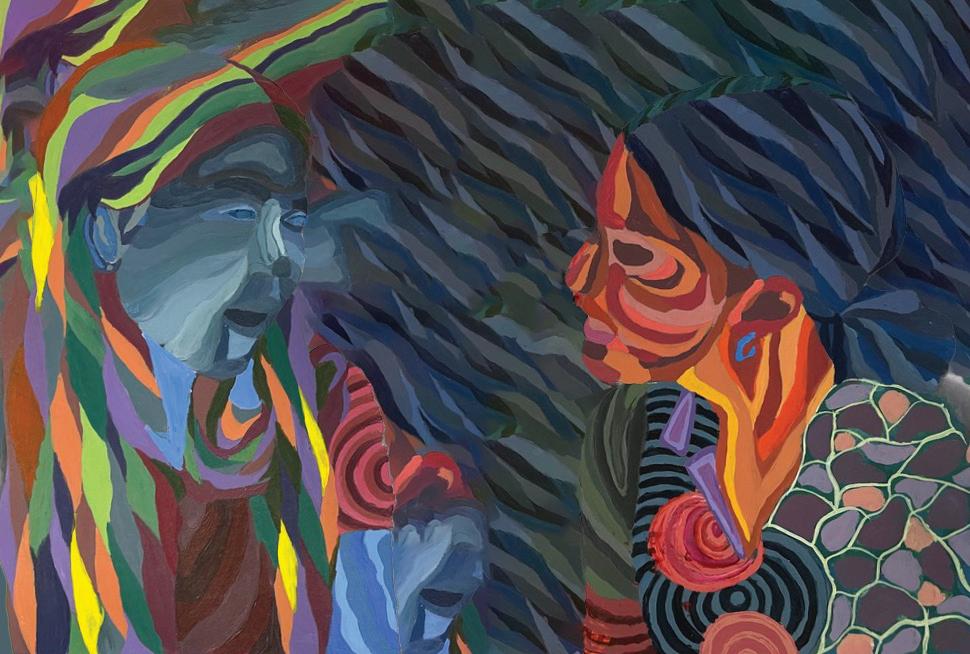 Morgan Clarke
Morgan Clarke
134
Flowing Dialog

135
Morgan Clarke Colors of My Youth
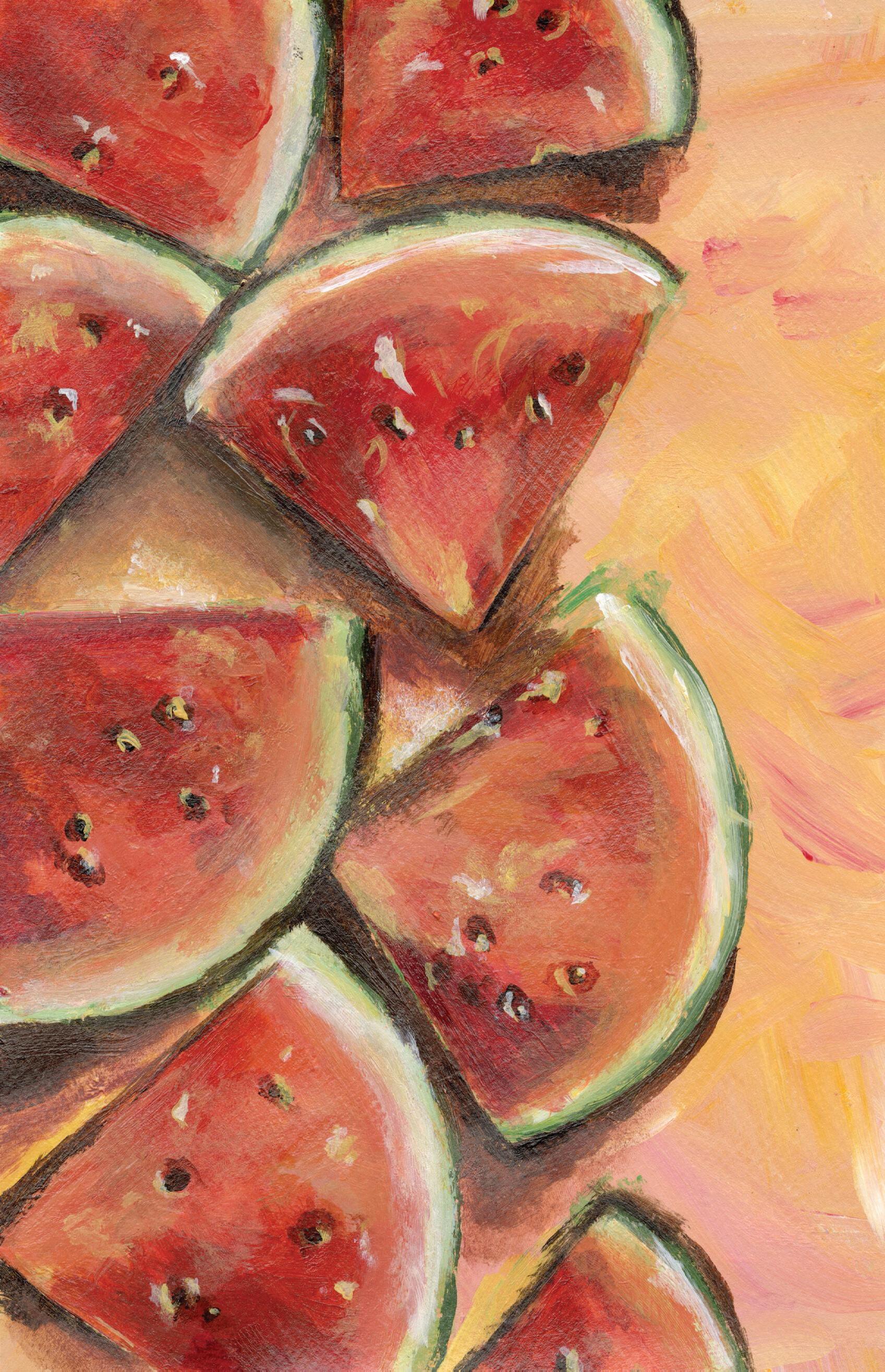
Thank You, Thursday
Lauren Sun
I’ll see Thursday in my tea leaves she’s got a pocketful of posies she hands them out like candy to a child you know they’re not forever, but you’d like to see her smile and if you take one, you’ll see Thursday beaming
it’s in her veins to take things fast, a cup of longing weeping in her hands about to crack you will pretend you’ve never seen it, you owe her that
so thank you Thursday, I’ll be seeing you tomorrow
I hope you always follow Wednesday’s memories thank you, Thursday, you dance like no one else is watching, even when you lose yourself, I know you’ll still be calling my name, so thank you Thursday
I see Thursday in the water melting like she isn’t someone’s daughter cotton candy hapless in the snow, she thinks she’s never getting old her teeth are made of sugar, you can see right through her bones
yes, I can see right through her poems, prayers, and so can you she fills her soul up with “brand new” and her pockets with posies too
so thank you Thursday, I’ll be seeing you tomorrow I hope you always follow Wednesday’s memories thank you, Thursday, you dance like no one else is watching even when you lose yourself, I know you’ll still be calling my name, so thank you Thursday
Listen to Lauren perform this song.
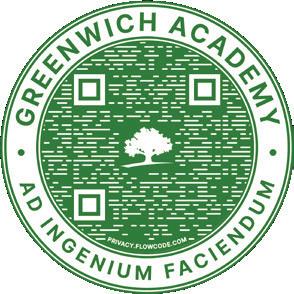 Vasilisa Banks Summer
Vasilisa Banks Summer
Fruit
137
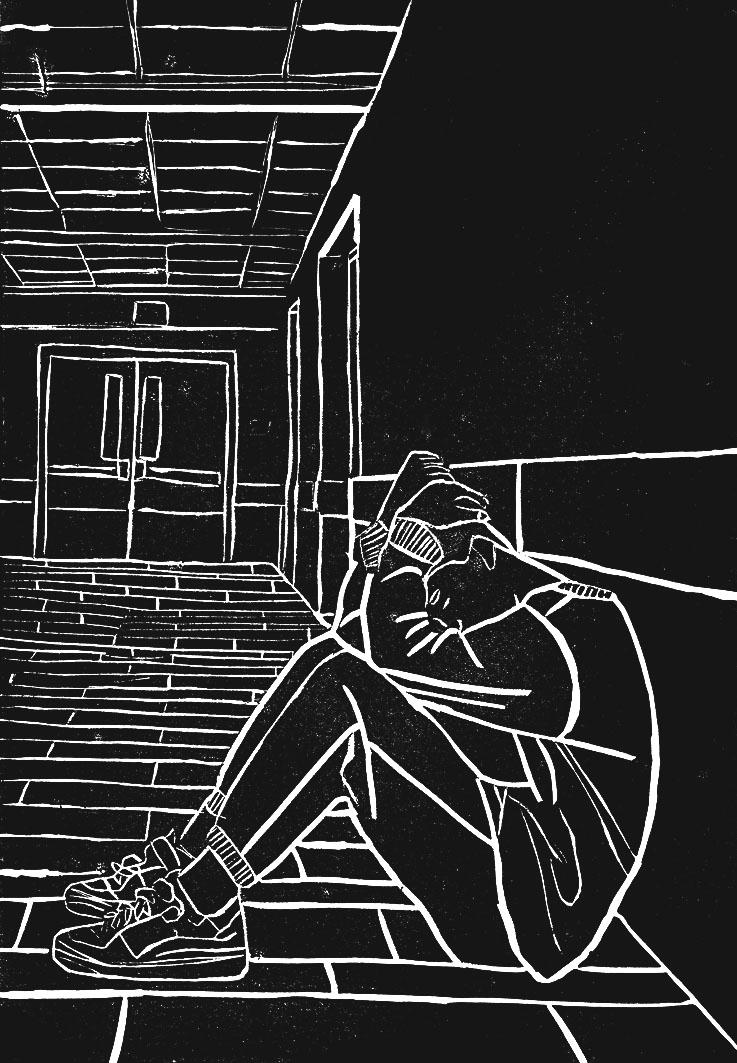
138
Sam Packer Hospital Corridor
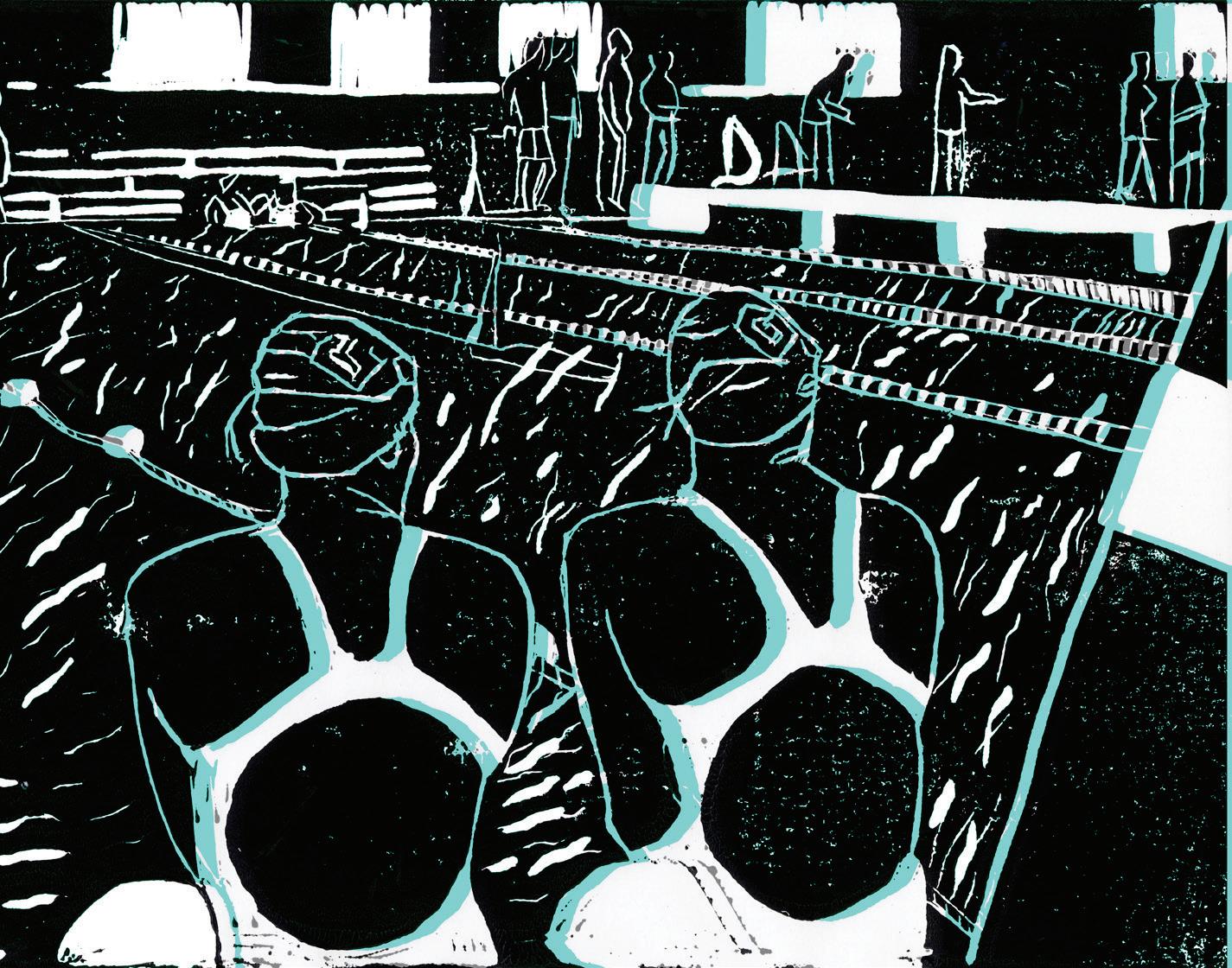
139
Bryce Gold
The Meet
Ephemera
Joyce Huang
Pressed against translucency, Folded wings will open when Demeter wakes, Will flutter in the air and paint the sky in magnificent hues Abiding within the chrysalis.
Light verdant shades tinge florets, Petals peeking out shyly just above the bud, Will erupt in the vibrant colors of the sunrise— The growth before the bloom.
To ebb and flow and rise and crash— The constant lull of the shoreline— Yet everything is still at the crest of a wave— It is infinite and it is infinitesimal.
140
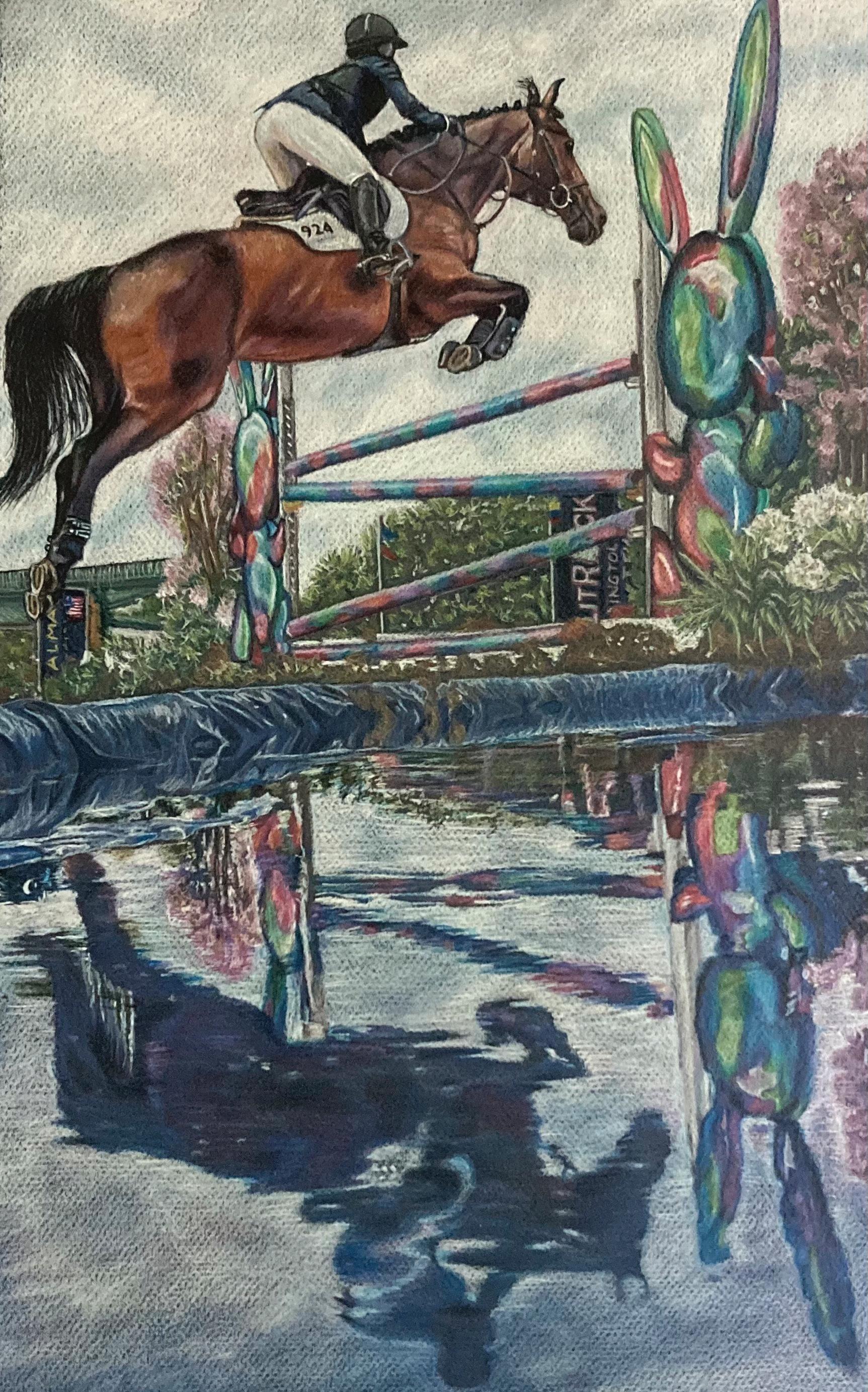
141
Zara Kurbanov Leap of Faith
Letter from the Chief Art Editors
After working to compose the 36th edition of Daedalus for the past two months, we wanted to thank all those whose tireless efforts made this year’s edition possible and recognize the end result and theme of this year’s issue.
First of all, we wanted to thank our diligent and talented writing editor team—Ms. Delapena, the Editors-in-Chief, the Associate Editors, and the Junior Editors—for providing us with an amazing portfolio of pieces to read through, putting us in the perfect position to continue with the composition of the magazine.
Because we had so many wonderful works to choose from, it was no easy task to pair each piece of artwork with its accompanying writing piece so that each would both stand out on its own and blend in seamlessly with the other’s message. Even with the abundance of work we received this year, we regret not being able to include more. For that, a huge thanks is warranted to all of the talented artists for sharing their generous contributions with the magazine; your participation and beautiful creations only amaze us more each year. The pieces that did make it in were particularly outstanding in their imaginative spirit, excellent use of personal voice, and daring experimentation. We thank you for sharing that vision with us.
Our next thanks goes out to the incredible arts and production advising team made up of Ms. Tamalonis and Mr. Pursell. We thank you for your collaboration with us through the long hours after school in the art studio, and your advice on putting this magazine together. You both pushed us to new heights of flexibility and creativity in both crafting the artwork and then throughout the process pairing pieces and curating the graphic design aspect of the magazine. A special congratulations especially to teacher and mentor Ms. Tamalonis on your success in advising Daedalus for the 36th year. You have been essential in our progression as artists throughout high school and as an advisor in this year’s edition. We couldn’t ask for a more beautiful magazine to appreciate this moment with.
With our new head of Greenwich Academy, Margaret Hazlett, in mind we incorporated the theme of Gratitude into the magazine, illustrated by our use of hands in the dividers and protrayals of friendship in art. Hoping to show our appreciation for our school by acknowledging all of the beautiful creations made by our writers and artists this year, we tied the pieces together to reflect moments in our in-school relationships, sports teams, and experiences, while also utilizing various symbols to represent our shared gratitude.
Finally, thank you to the reader, without whom we would not be able to share our love of creating, and artistry. We are beyond proud of our artists and writers this year, and hope to have shown you just a piece of the brilliance and capabilities of our Greenwich Academy community this year.
Sincerely,
Ainsley McKee and Arielle Burrows
142
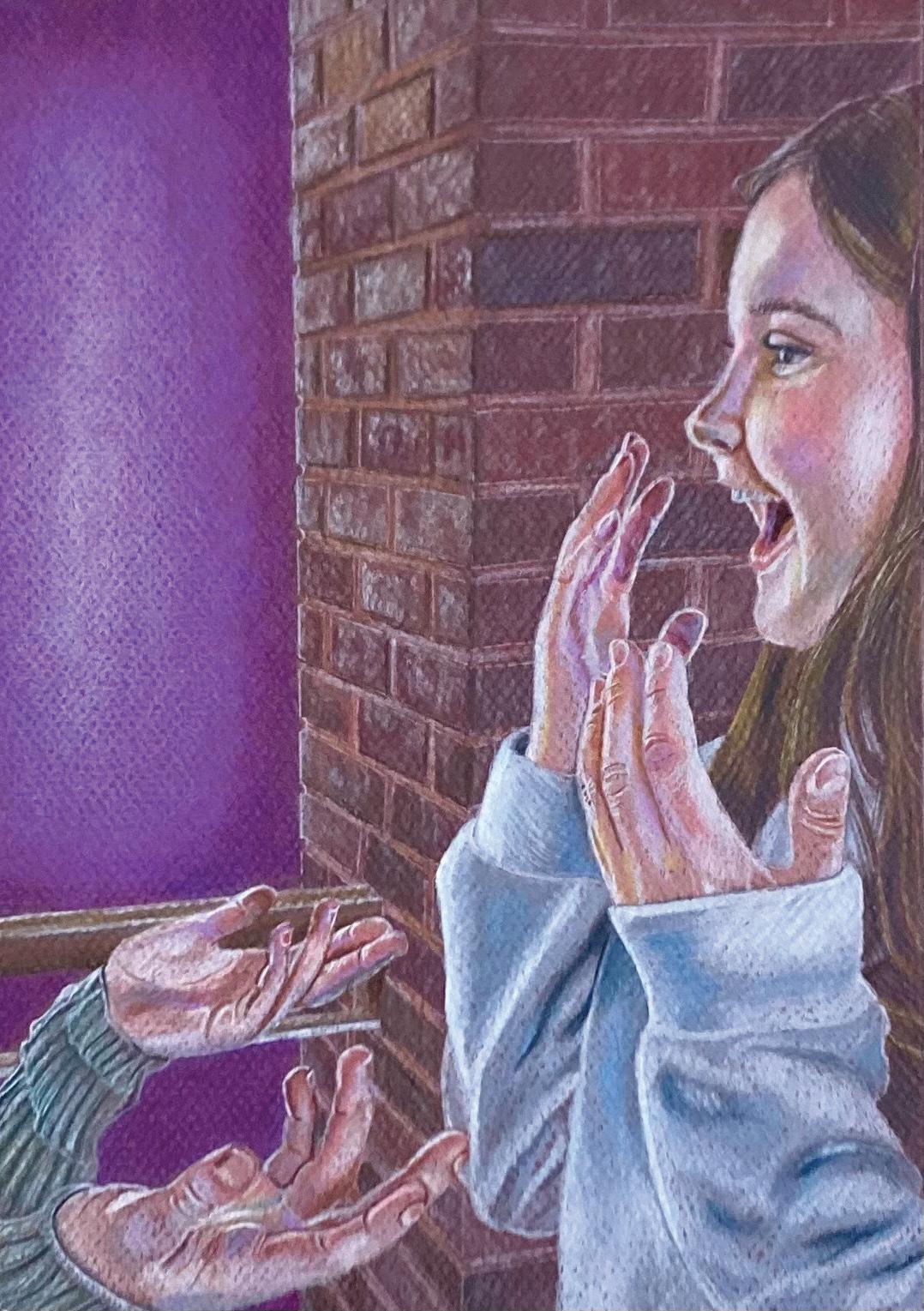 Zara Kurbanov Gratitude
Zara Kurbanov Gratitude
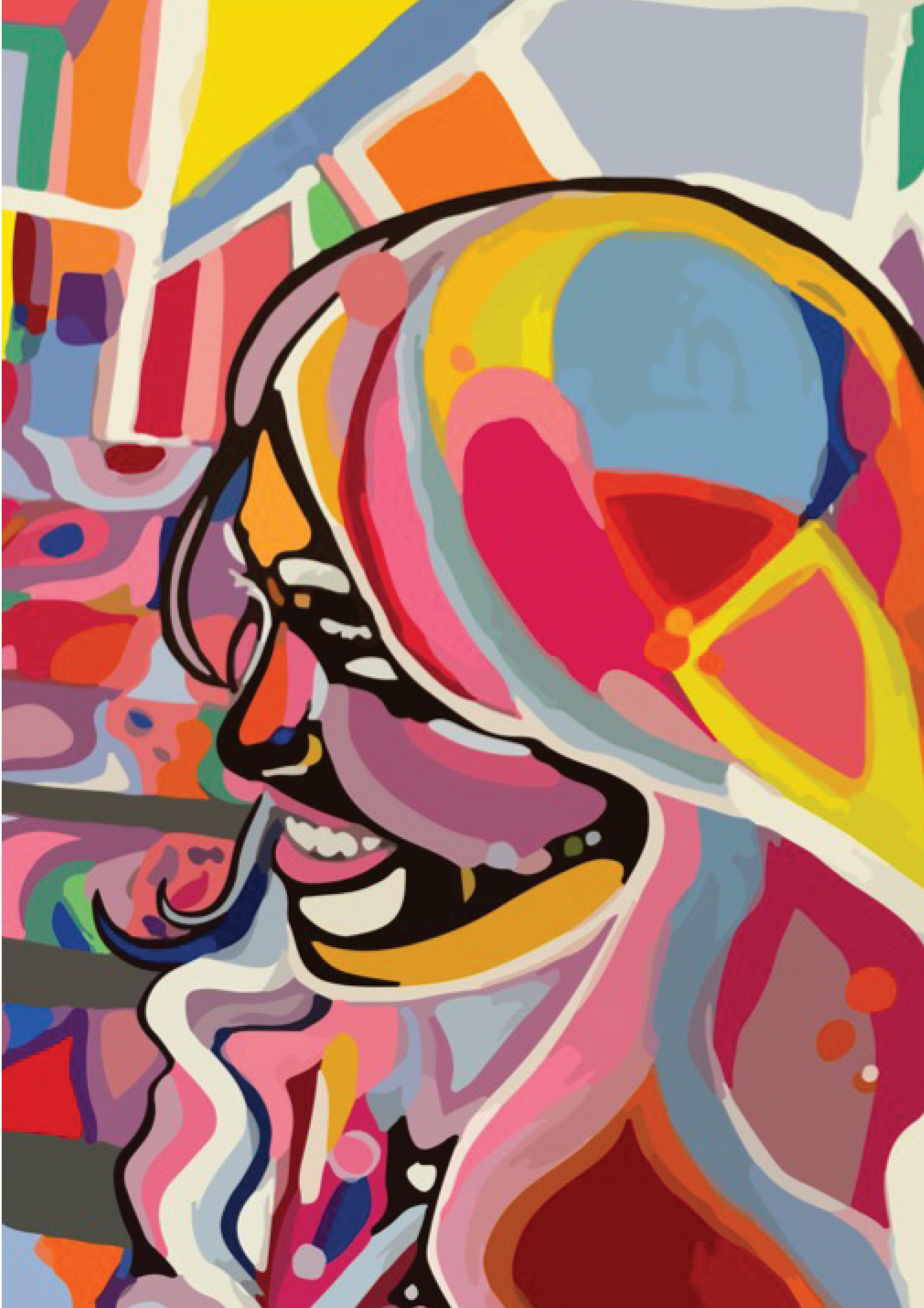
VOLUME XXXVI
GREENWICH ACADEMY






 Summit Mock The Ride
Summit Mock The Ride


 Bryce Gold
Bryce Gold


 Denise Seol Inside Look
Denise Seol Inside Look









 Zara Kurbanov Embrace
Zara Kurbanov Embrace




 Anna Leventon Puppet Master
Anna Leventon Puppet Master





 Elena Schmedlen Botanical Study, 2
Elena Schmedlen Botanical Study, 2


 Morgan Clarke Self-Portrait at Work
Morgan Clarke Self-Portrait at Work









 Elena Schmedlen
Elena Schmedlen






 Denise Seol
Denise Seol



 Aya Rabin
Aya Rabin
 Alexandra Zummo
Alexandra Zummo





 Anna Leventon What is Done
Anna Leventon What is Done








 Delilah Benn Sleeping Series, II
Delilah Benn Sleeping Series, II

 Delilah Benn Sleeping Series, III
Delilah Benn Sleeping Series, III




 Morgan Clarke
Morgan Clarke


 Vasilisa Banks Summer
Vasilisa Banks Summer



 Zara Kurbanov Gratitude
Zara Kurbanov Gratitude
